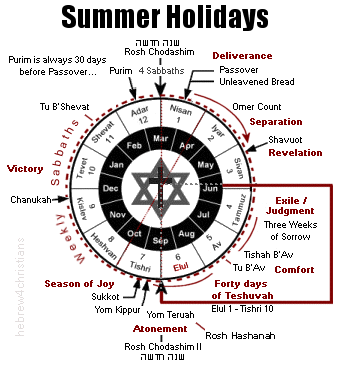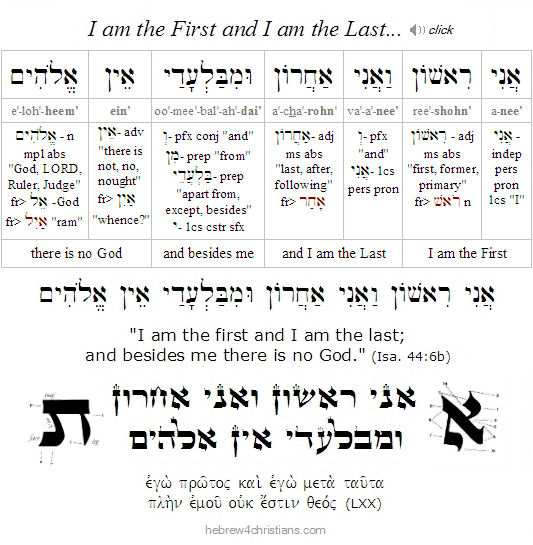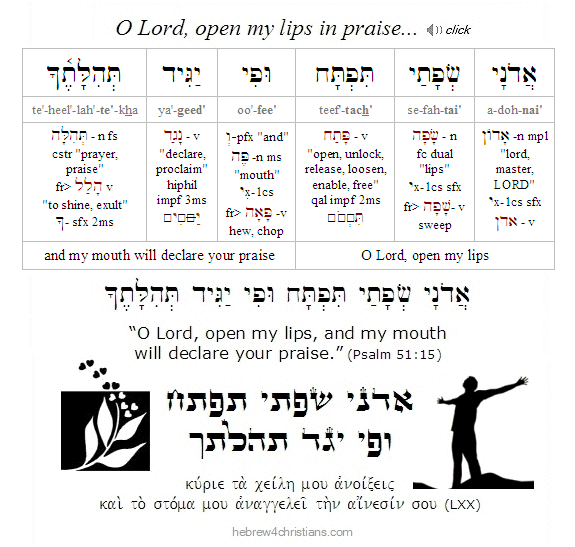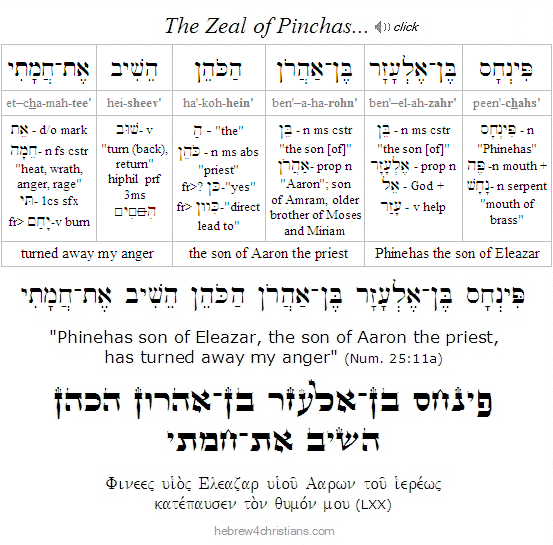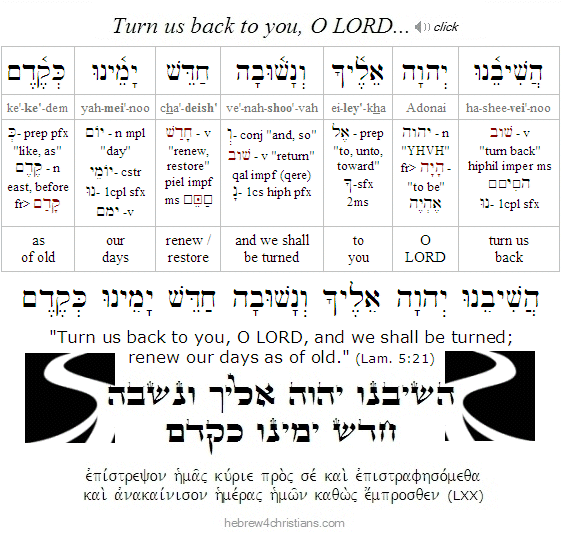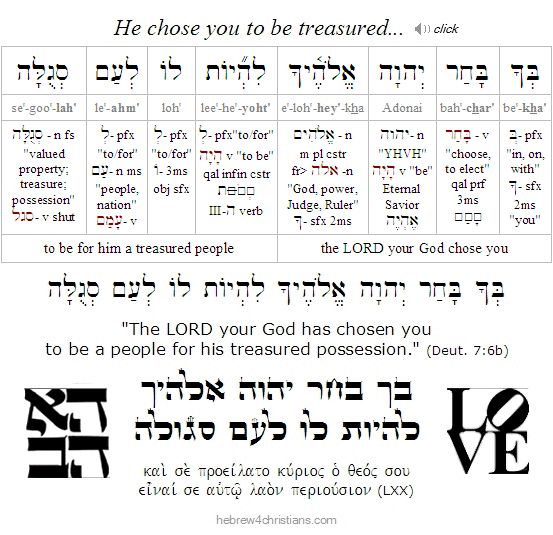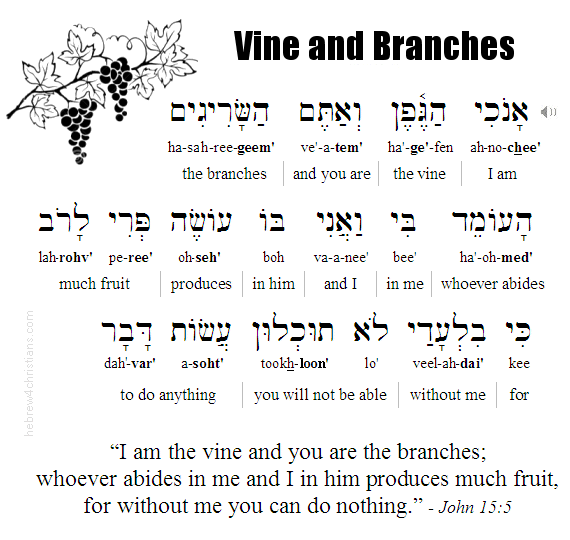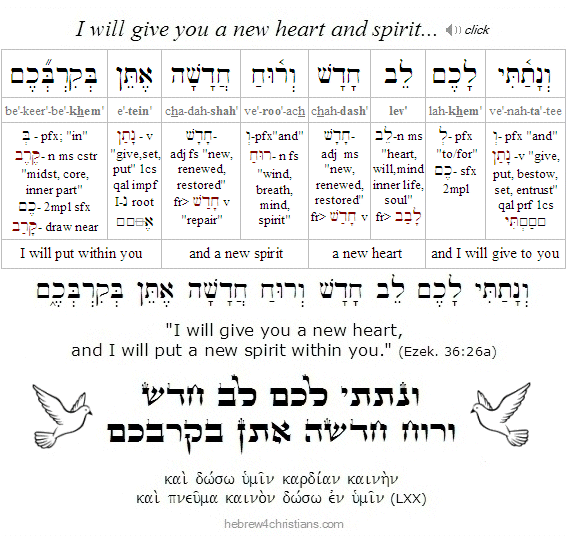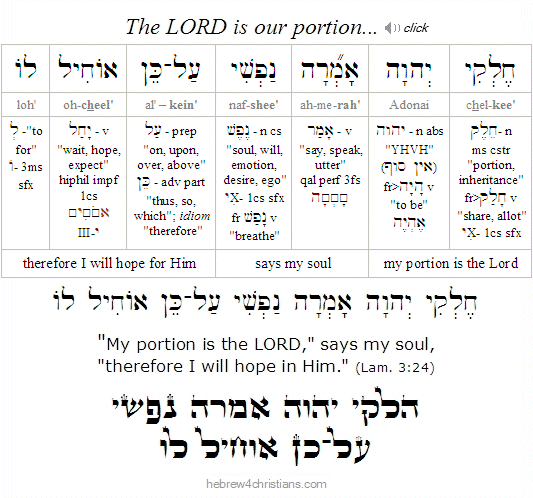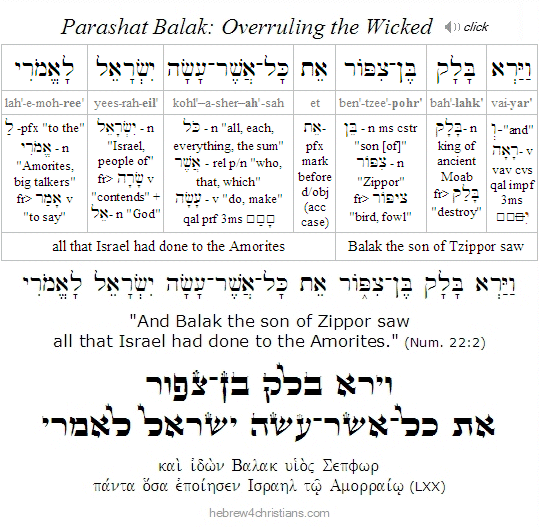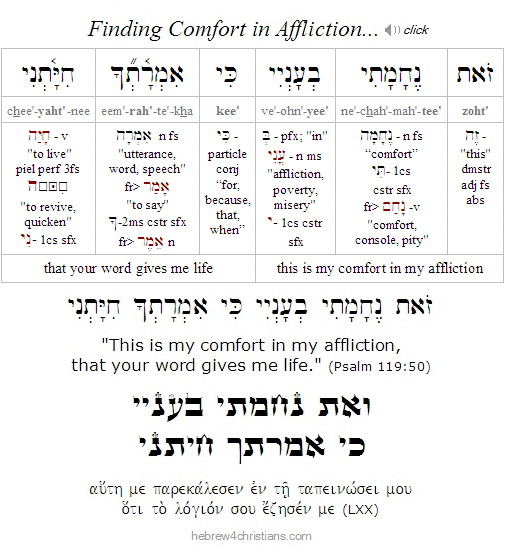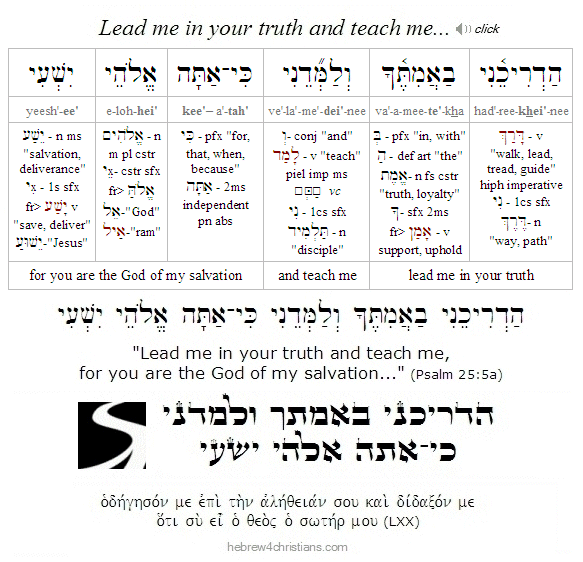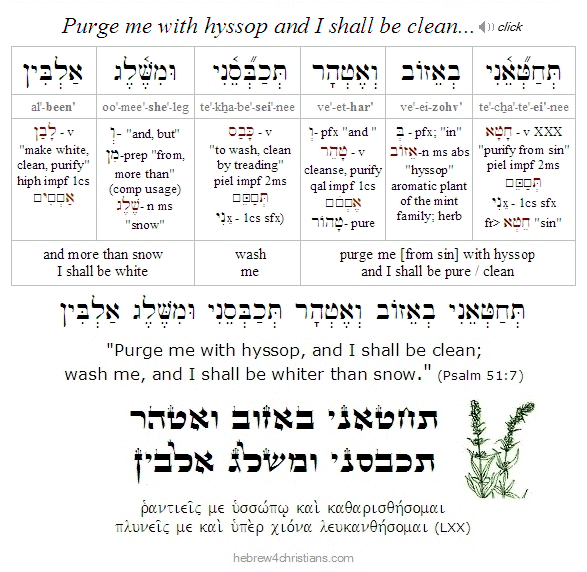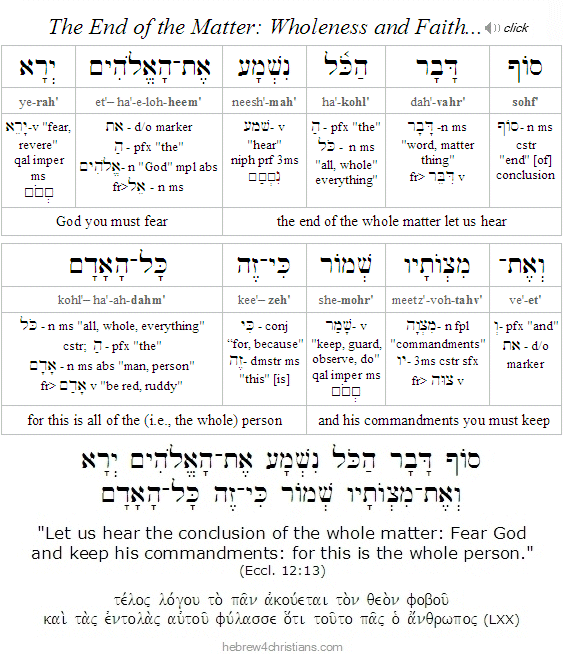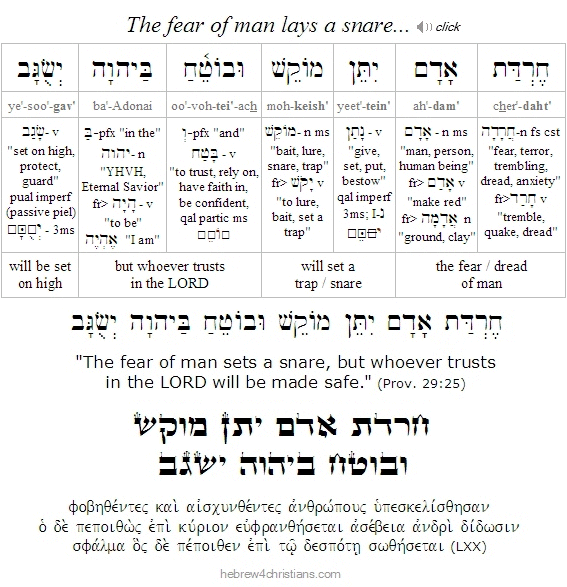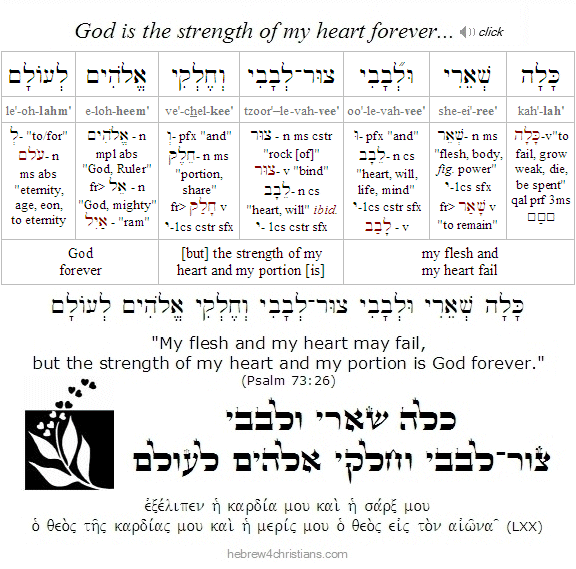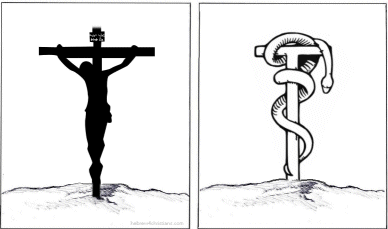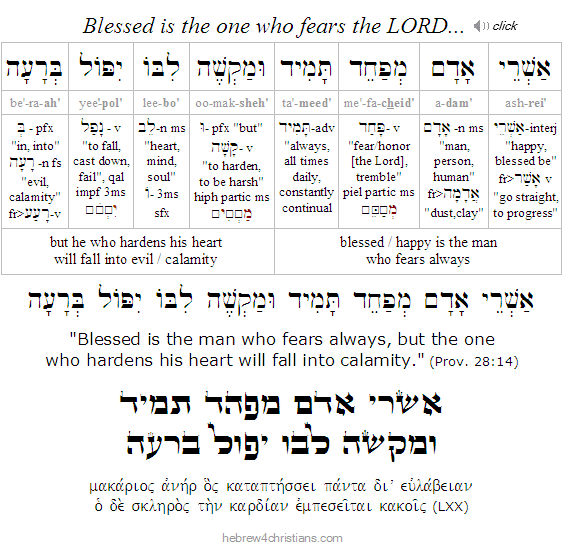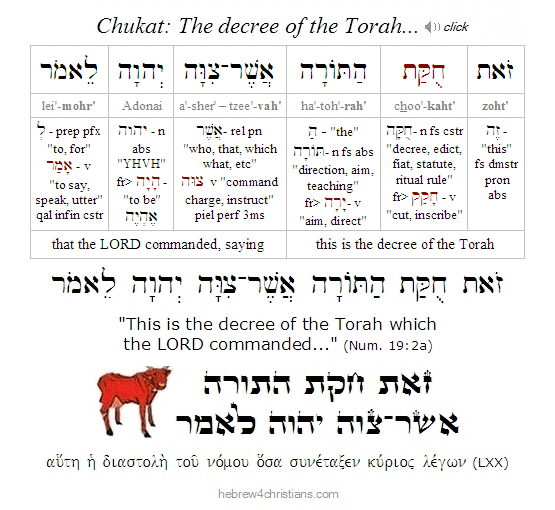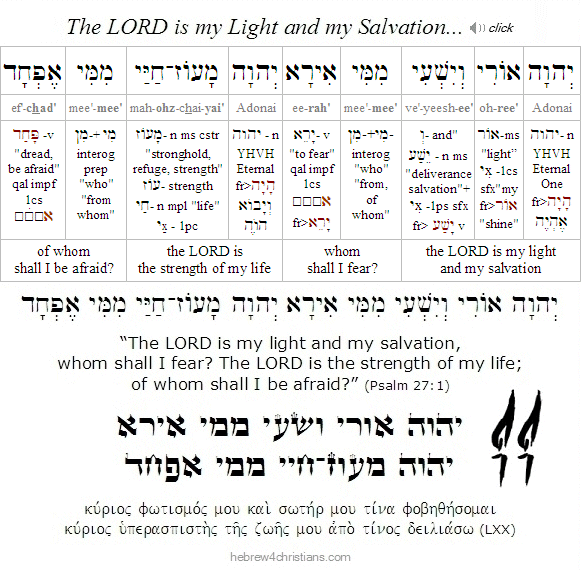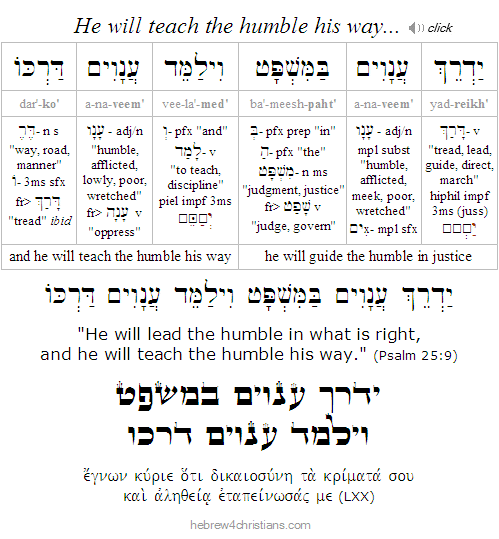|
Jewish Holiday Calendar
For June 2021 site updates, please scroll past this entry....
In the summer there occurs a three week period of mourning that begins with the Fast of Tammuz and ends with Tishah B'Av. The last nine days of this three week period (i.e., from Av 1 until Av 9th) are days of increased mourning. However, after this somber time, the happier holiday of Tu B'Av, the 15th of Av occurs. Summer ends with the 30 days of the month of Elul, a yearly season of teshuvah (repentance) that anticipates Rosh Hashanah and the fall holidays. The 30 days of Elul are combined with the first 10 days of the month of Tishri to create the "Forty Days of Teshuvah" that culminate with Yom Kippur.
Because they occur between the spring and fall holidays, the summer holidays help us prepare for the second coming of the Messiah:
The Summer Holidays:

Note that in accordance with tradition, holiday dates begin at sundown. Moreover, some holidays may be postponed one day if they happen to fall on the weekly Sabbath:
1. Month of Tammuz (Wed. June 9th [eve] - Fri. July 9th [day])
2. Month of Av (Fri. July 9th [eve] - Sat. Aug. 7th [day])
3. Month of Elul (Sat. Aug. 7th [eve] - Mon. Sept. 6th [day])
4. Month of Tishri (Mon. Sept. 6th [eve] - Tues. Oct. 5th [day]) - Fall holidays begin!
Note: For more about the dates of these holidays see the Calendar pages....
June 2021 Updates
Note: If any page content appears to be missing, please refresh the page...
The Book of His Life...

06.30.21 (Tammuz 20, 5781) The sages say that every person's life is a "book," as it is written: "This is the book of the generations of Adam" (Gen. 5:1). There are heavenly scrolls written about the story of your life (Dan. 7:10; Rev. 20:12). They further note that the Hebrew word for "name" (i.e., shem: שׁם) shares the same numeric value as the word "book" (i.e., sefer: ספר), suggesting that a person's name summarizes their life, and that God's Name contains all the letters of the Scriptures - from the first letter Bet (in "bereshit") to the last letter Nun (in "amen") - which, when put together, form the Hebrew word for "son" (i.e., ben: בן). The revelation of God, then, is disclosed in "et" (את), the Alef and Tav, the Direct Object of his heart, the Beginning and End, the glorious LORD over all, Yeshua our King.
Hebrew Lesson:
True and False Zeal...
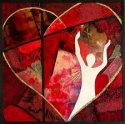
[ The following entry concerns our Torah reading for this week, parashat Pinchas... ]
06.30.21 (Tammuz 20, 5781) You may be entirely sincere in your convictions, but you may be sincerely wrong... In the time of the Second Temple, for instance, the Zealots despised the rule of Rome. Their political hatred caused them to blindly regard anyone who didn't share their passion as a personal enemy. In one of the great tragedies of Jewish history, these Jewish zealots actually killed more Jews than did the Romans themselves! And how many Christians these days "kill" relationships with other believers because of their particular zeal regarding some doctrinal question? I am not suggesting that doctrine is unimportant, of course, but before you pick up that sword to do the business of Pinchas, you might do well to consider your heart's attitude...
"In this respect fundamentalism has demonic traits. It destroys the humble honesty of the search for truth, it splits the conscience of its thoughtful adherents, and it makes them fanatical because they are forced to suppress elements of truth of which they are dimly aware." - Paul Tillich
We need to be careful with our passions. There is a "false zeal" that leads to estrangement and confusion. Withholding love from others is ultimately grounded in an appeal to God as the administrator of Justice. It is an appeal to God as Elohim (אֱלהִים), not as YHVH (יהוה), the Compassionate Source of Life. If we insist on our rights, we appeal to principles of justice, i.e., to God as the Lawgiver. But if we intend to have God be the Judge of others, we must appeal to Him to be our own Judge as well. If we have an unforgiving spirit toward others, we will not receive our own forgiveness (Matt. 6:15); if we are judgmental toward them, we ourselves will be put on trial; if we are cruel and ungiving toward them, we will experience life as hellish, miserable and mean. This reciprocal principle of Kingdom life appears throughout Yeshua's teaching. According to your faith, be it done unto you (Matt. 9:29).
Hebrew Lesson:
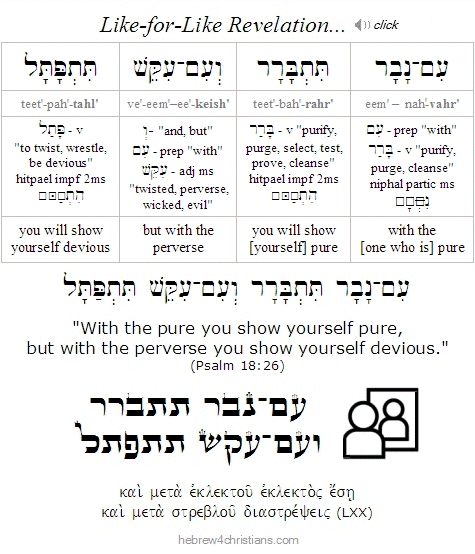 |
Note: For more on this important topic, see "Parashat Pinchas: God's Greater Zeal."
Give up your sickness...
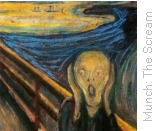
06.29.21 (Tammuz 19, 5781) If we refuse to surrender to God, we will be at war within ourselves... To be inwardly healed we have to want it; and that means being willing to give up everything - including our sickness of heart. For many people, this is too much, and therefore they cling to what makes them sick as a child might cling to a pacifier. This is because to the natural man, the cure is regarded as worse than the sickness itself. As Kierkegaard astutely noted, "When a man is sick or indisposed, the first thing he does is to send for a physician, and medication is what he wants; spiritually, however, it is just the opposite - when a man has sinned, the last thing he wants is the physician and medicine."
רפאני יהוה וארפא
הושׁיעני ואושׁעה כי תהלתי אתה
re·fa·ei'·nee Adonai ve·ei·ra·fei
ho·shi·ei'·nee ve·ee·va·shei'·ah: kee te·hee·la·tee a'·tah

"Heal me, O LORD, and I shall be healed;
save me, and I shall be saved, for you are my praise."
(Jer. 17:14)
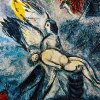
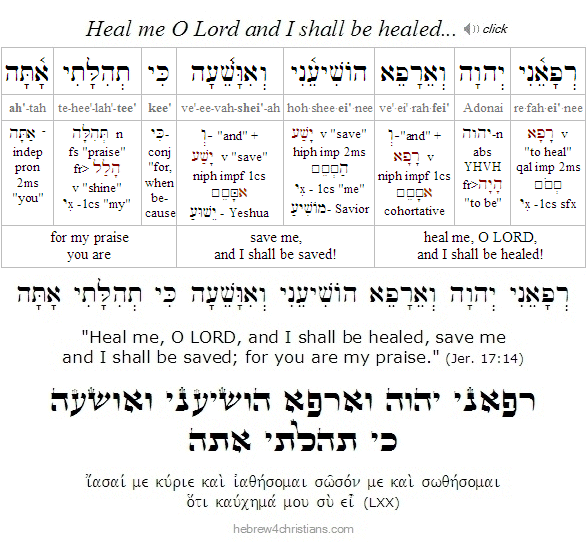
Please note that the healing mentioned in this passage is primarily spiritual (יְשׁוּעָה) rather than physical, since physical illness is a natural consequence of living in a fallen world. The Apostle wrote that while the "outer man is wasting away, the inner man is renewed day by day" (2 Cor. 4:16). There is a divinely appointed "light and momentary affliction" that we all must carry in this life, and it is callous to suggest that every believer should live miraculously immune from any physical illness or suffering whatsoever. "By His stripes we are healed" does not necessarily mean that we are guaranteed physical healing in this life, though it does mean that we are given true and everlasting healing from the plague of death, that is, we are given spiritual healing that far outweighs concern for the present moment and its temporary afflictions. Of course there are miracles of healing that come through prayer (Psalm 6:2; James 5:15; 1 Cor. 12:9), though even then the focus must first be directed to the spirit and then to the flesh...
A person of faith will use the good eye (העין הטובה) to see the good - even in occasions of misfortune, whereas one disposed to despair will use the evil eye (העין הרעה) to see the bad - even in occasions of good. And even in cases where the facts are entirely the same, for one there is hope, but for another there is fear... Therefore, a person's whole view of life is actually a confession of the state of his inner being. As Yeshua said, "according to your faith be it done unto you," which underscores the importance of believing in the good, taking hold of hope, and trusting in the ongoing love and care of the Lord, despite affliction and trouble in this world. True healing means coming out of the nightmare of fear...
People sometimes seek healing for that which needs to be slain. You don't need a cure -- you need let go and allow yourself to die.... The carnal life may indeed scandalized, but the point of life is not how to find healing, strength, sustenance, happiness, and so on, but rather how to give up and die. Flesh and blood can never inherit the kingdom of God.
Again, God's way of healing is entirely different than man's way. Man tries to suppress the flesh, to cover it up, to justify its failings, or to enlist its power in the battle against sin, but God's way is to remove the flesh from the equation. The goal is not to make us stronger and stronger, but rather weaker and weaker, until the flesh is crucified and only the sufficiency of the Messiah remains. Then we can truly say, " I have been crucified with Messiah. It is no longer I who live, but the Messiah who lives in me. And the life I now live in the flesh I live by faith in the Son of God, who loved me and gave himself for me" (Gal 2:20). The word "Hebrew" (עִבְרִי) means one who has "crossed over" (עָבַר) to the other side, as our father Abraham did (Gen. 14:13). Again, it is on the other side of the cross that we experience the very power that created the universe "out of nothing" (i.e., yesh me'ayin: יֵשׁ מֵאַיִן) and that raised Yeshua the Messiah from the dead. Ask the Lord for the miracle...
 |
The Battle of Truth...

06.29.21 (Tammuz 19, 5781) I mentioned recently that our own evil inclination, the yetzer hara, needs to be acknowledged so that we may find inner peace... Often our true motives are hidden - even from ourselves - so that we are unaware of how we are controlled by them. For example, if we harbor an unacknowledged hunger to find approval and validation from other people, we may lose sight of God Himself (Gal. 1:10). The enemy within is usually in hiding, and we need special wisdom from God not to be ruled by fear, anger, and so on. It has been said that "we are only as sick as the secrets we keep," though the secrets we keep from ourselves are surely the most dangerous.
"If your enemy is hungry, give him bread to eat, and if he is thirsty, give him water to drink, for you will heap burning coals on his head, and the LORD will reward you" (Prov. 25:21-22). Some of the sages have said that the "enemy" here refers to the yetzer hara, the "evil impulse," and that by proactively attending to the inner emptiness and neediness we sometimes feel - by feeding ourselves the "bread of Torah" and the "water of the Spirit" - we will overcome the evil with good (Rom. 12:21). If you feel yourself lacking, the evil impulse will offer to fill the void. The only defense against inner emptiness is to be filled with the Spirit of God. Study the truth of Scripture, pray, develop hakarat hatov (gratitude), and perform acts of gemilut chassidim. Overcome the evil impulse with good. The LORD will see to it that your cup will overflow in the presence of your enemy (Psalm 23:5). Thus it is written, "From my enemies You teach me wisdom in doing your commandments" (Psalm 119:98), meaning that the yetzer hara can teach us if we submit to God's will... Therefore Yeshua said, "Be wise as serpents but harmless as doves" (Matt. 10:16).
The essence of sin is unbelief. Sin is not so much disobedience to an external code of behavior as much as it is abandoning your trust, your identity, and your hope as a beloved child of God. As you believe so you will behave, and as you behave so you believe... Therefore one of the greatest of sins is to forget the truth of who you really are – a prince or princess of God! The great temptation of sin is rooted in the lie that we are unworthy people, that God does not really loves us (just the way we are), that He is disappointed in us, and so on. This perspicacious quote by the late Henri Nouwen speaks to my heart:
Over the years, I have come to realize that the greatest trap in our life is not success, popularity, or power, but self-rejection.... Success, popularity, and power can indeed present a great temptation, but their seductive quality often comes from the way they are part of the much larger temptation to self-rejection. When we have come to believe in the voices that call us worthless and unlovable, then success, popularity, and power are easily perceived as attractive solutions. The real trap, however, is self-rejection. As soon as someone accuses me or criticizes me, as soon as I am rejected, left alone, or abandoned, I find myself thinking, "Well, that proves once again that I am a nobody." ... [My dark side says,] I am no good... I deserve to be pushed aside, forgotten, rejected, and abandoned. Self-rejection is the greatest enemy of the spiritual life because it contradicts the sacred voice that calls us the "Beloved." Being the Beloved constitutes the core truth of our existence."
Ultimately sin seduces people to destroy themselves, since it first of all seeks to disown, impugn, and reject what is most important for spiritual life. The devil seeks to murder and destroy all that we need to be eternally healed... And though we might want to escape from this conflict (or to pretend that it's not really here), the battle is intractably real and must be fully engaged until our redemption is complete (1 Pet. 5:8-9). Meanwhile, spiritual struggles can be downright ugly. Would any one deny that the cross of Messiah was a sacred space - and yet it was precisely from there, from the place of blood and suffering and pain and terror, that the grace, beauty, and strength of God for us would shine forth.
To effectively combat the devil, let us first of all pray to the LORD God Almighty and ask for His power, wisdom, and grace to deal with the evil one's devices and strategies used against us (Eph. 6:11-18; Rom. 13:12, 1 Thess. 5:8; 2 Cor. 10:4-5). Since we are not to be ignorant of the devil and his devices (2 Cor. 2:11), let us particularly ask God to remind us of who we really are in the Messiah, and to give us the power of the Holy Spirit to genuine walk in the truth of our sacred identity. Let's ask God to help us practically apply the victory given to us in the resurrection of Yeshua. With God's help, may we be bold to take our place at His banqueting table, assured that we are indeed His dear children. Shalom.
Hebrew Lesson:
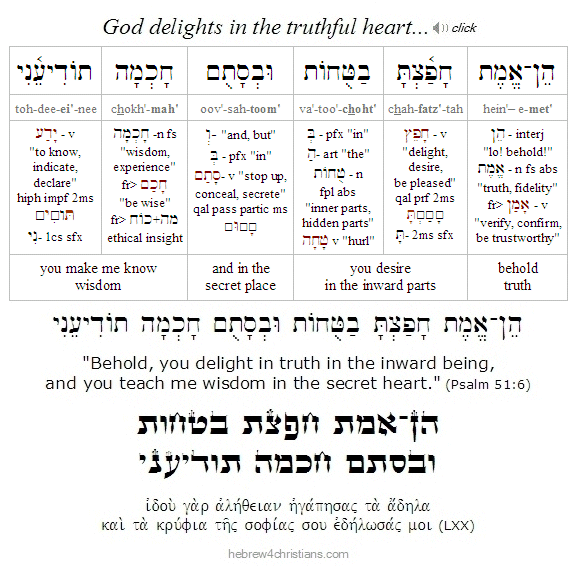 |
The Language of Pain...
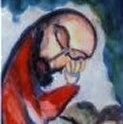
06.29.21 (Tammuz 19, 5781) Regarding the "language of pain," the Talmud discusses how the bleeding of a stubbed toe corrects the relationship between man and God as if it were an "olah sacrifice" (whole burnt offering). They elaborate that this is the case if it was the second time the toe was injured before recovering from its first injury, and that it had occurred on the right toe when the person was on a mission to perform a mitzvah.
The reference to the right toe recalls the anointing of the priest for service (Exod. 29:20) as well as the healing of a leper (Lev. 14:25). The sages note that this signification of the blood is not the result of a punitive measure but instead indicates a wound that brings the heart closer to God. In the case of an injury to the toe while doing a mitzvah, the sufferer is brought to teshuvah (repentance), not because of disobedience, but in order to learn compassion, and to affirm that everything comes only from the Lord (Psalm 136:25-26). "Let this suffering be for atonement," by which is meant, may this too bring my heart closer to God's love... The sages brought this case up as a counterexample to the notion that all suffering or pain is some form of punishment from heaven, and argue that on the contrary, some suffering is the result of God's decree. This is the message of the Book of Job as well.
A pain-free life is not necessarily a sign of blessing, of course, since it might indicate that the person is no longer being "educated for eternity," and therefore that God no longer talks to him anymore. This is one way to understand the irony of why the wicked prosper in this world, for they shall have received their reward here, but nothing in the world to come (Matt. 6:5; Job 27:8). On the other hand, pain can "goad" the soul to draw near to God for healing, which is the essential and consummate blessing, after all... Pain also teaches us to be humble, to consider our own frailty and need, and to learn compassion by extending that consciousness to people as well. The greatest example of this is found in our Savior, who emptied himself and suffered in wholehearted service to his heavenly Father (see Isa. 50:6; Phil. 2:7-8; Heb. 2:10, 4:15; 5:8-9. 7:25, etc.).
The focus of spirituality is not about finding comfort through fulfilling our desires as much as it is devotion to the truth by exercising faith in the divine ideal. We come to God to conform to his will, not because religion is a form of therapy or another self-improvement project. Stoicism has made a come-back in the "postmodern" world, offering people a variety of philosophical diversions meant to diminish the significance of what happens in this world and to direct the mind to a "nirvana-like" equanimity (ataraxia), as if the final reconciliation has already taken place. Such detachment from the world, however, is incompatible with faith in God's omnipotence and love, since it assumes that this age is not meaningful or offers no blessing. Genuine faith in God allows us to mourn when sorrow is called for and to rejoice in times of joy; it does not negate the reality of history nor deny God's providential love in the temporal realm. This is part of the tension we have in a "two-tiered" reality, which requires us to both affirm the reality of life in this world - the mixed bag of sorrows and joys we experience in our sojourn - and the promise of the substance to come, when all tears will be wiped from our eyes and our love will be unhindered by sin... The tension is dialectical and complex: we stand in relation to God not only when we are confronted by his truth, but in our seeking and in the ordinary ups and downs of our everyday existence. As C.S. Lewis said, those who choose a life of truth over happiness often acquire both, whereas those who seek happiness over truth often acquire neither... Therefore as we walk with God, whether in the high places or in the shadow of death, we experience blessing and grace in our lives.
The temptation behind suffering is to regard it as a sign of divine rejection or abandonment. Even when suffering is interpreted to be an invitation to do teshuvah, however, it does not unambiguously indicate where we stand in relation to God... This is true even in light of the work of salvation secured in Yeshua at the cross. Is our suffering a means of correction or "chastening" (Psalm 94; 119:71)? Or is it the result of the common affliction our fallen human nature (Gen. 3:17-19; Job 5:7; 14:1; Rom. 8:20)? Or is our suffering somehow for the sake of the glory of God (John 9:1-3, Matt. 5:11-12)? The writers of the New Testament repeatedly mention fiery trials and tests that would befall God's children (1 Pet. 4:12-13; Rom. 8:17; Phil. 3:10; Matt. 5:11-12; Col. 1:24; 2 Tim. 2:12).
Some have said that this ambiguity makes teshuvah impossible, for you can't repent unless you know what you have done wrong... This raises the question of how much we are able to know of ourselves and our "secret sins," and how these affect us spiritually. "The heart is deceitful above all things, and incurably sick-- who can know it" (Jer. 17:9). The heart is the source of the problem (Mark 7:21) and yet how is it possible to overcome itself? In other words, how can a person be saved from himself, after all? If we are incurably sick, healing must come from a source outside of ourselves... by means of the miracle of regeneration.
We do not relate to God in terms of the "law" but rather in personal terms, by having faith in God's love and grace given in Yeshua (Heb. 4:15-16). The problem of our sin therefore goes beyond "forensic judgment" to that of relationship... Instead of reciting a litany of our sins against heaven, we reach out for connection, for God's mercy and touch, even if we are in darkness about what went wrong or how we lost our way. How have I broken my connection with the Lord? How have I allowed myself to harden and thereby become lost to my true heart? How have I misunderstood? How have I been blind? How have I doubted God's love for me? To "renew our days as of old" we must first understand our need for renewal - for our need to "return to our first love." We return to the Lord in trust that his love is all we need, and that he welcomes us with blessing (Luke 15:11-32).
As Kierkegaard explained, the "self" is really an inner dialog within the heart (a "relation which relates itself to itself"), that is, a self-transcendent relation that witnesses the inner dialog, though we cannot have a true "self" apart from a relationship with what Buber called an "I-Thou" connection. These two relationships are eternal - the one we have with ourselves, and the one we have with God who is the ground of our existence, and therefore we cannot really exist with ourselves apart from having a right relationship with God who establishes who we are. Paradoxically, if all we have is ourselves, we do not have a self at all, and those who seek to have a self must first lose themselves to find themselves.
God's thoughts are not our thoughts nor are our ways his ways (Isa. 55:8), and there is no "recipe" or "formula" to know Him apart from the messy business of struggling within our hearts, seeking and finding, and seeking again, lamenting and praising, and then lamenting again, by living out our evanescent lives in the depths of our needs and our dearest hopes. In times of incomprehensible suffering, a heart connection with God can indeed be quite unsettling, but we must press through the fear, we must "see through the glass darkly" and confess that "God is with us" - even in the midst of this trouble. Faith apprehends God's heart before all else - it trusts that there is unseen good that transcends and constrains the travail of the present hour. Our father Jacob was renamed "Israel" when he surrendered to God's Presence despite everything wrong he had ever done...
Hebrew Lesson
Psalm 55:8 Hebrew reading (click):
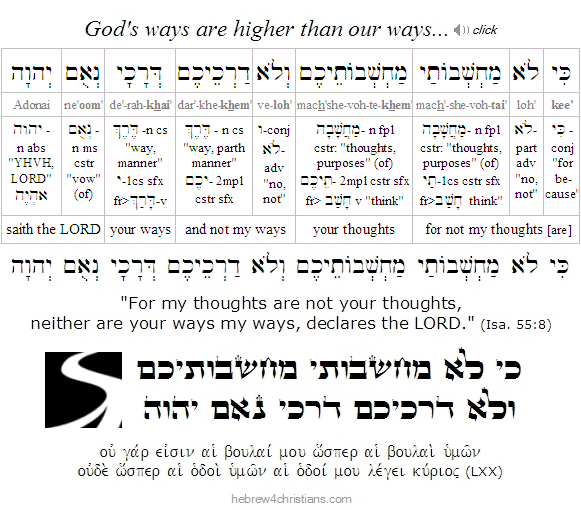 |
Faith not only affirms that God is with us in the present, however, but in the pain of our past as well. In response to the intellectual question, "Where was God in times of our sorrow, our abandonment, our nightmare?" Faith answers: "He was with us." But faith not only affirms that God was with us in the harrowing past but will be with us in the future, in the substance of our yearning for deliverance and for life. Faith "remembers the future" by holding to the promise of God, even in the wake of the past and in the ambiguity of the present...
God is involved in all our sorrows because of his greatness, and his pathos knows when "the flower fadeth and when the sparrow doth fall." As David said: "telleth our wanderings, he collects our tears and stores them in his bottle; the story is written in his book" (Psalm 56:8). The heart of the Lord spans "the breadth and length and height and depth" Messiah, a love that surpasses knowledge (Eph. 3:17-19). "It is higher than heaven-- what can you do? Deeper than Sheol -- what can you know?" (Job 11:8). Despite the sorrows and anguish we sometimes experience in this life, we trust that God will fulfill his promises to us and perfect our salvation at the appointed time. Our exile will then be over and then we will experience the consummate glories and wonders of heaven itself.
Hebrew Lesson
Job 19:25 Hebrew reading (click):
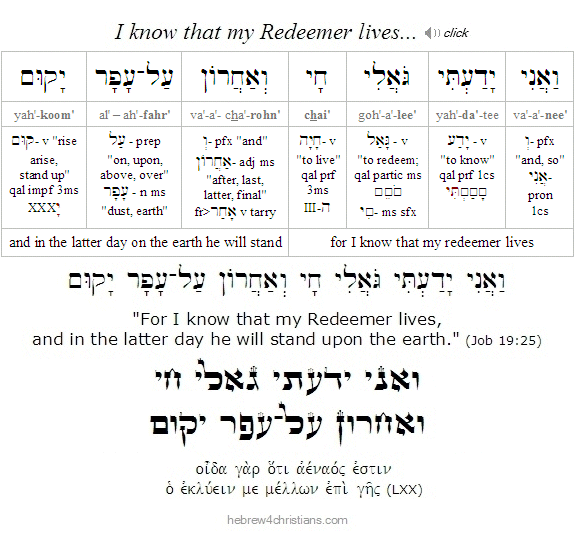 |
"Father in Heaven! You have loved us first, help us never to forget that You are love so that this sure conviction might triumph in our hearts over the seduction of the world, over the inquietude of the soul, over the anxiety for the future, over the fright of the past, over the distress of the moment. But grant also that this conviction might discipline our soul so that our heart might remain faithful and sincere in the love which we bear to all those whom You have commanded us to love as we love ourselves.
You have loved us first, O God, alas! We speak of it in terms of history as if You have only loved us first but a single time, rather than that without ceasing You have loved us first many times and every day and our whole life through. When we wake up in the morning and turn our soul toward You - You are the first - You have loved us first; if I rise at dawn and at the same second turn my soul toward You in prayer, You are there ahead of me, You have loved me first. When I withdraw from the distractions of the day and turn my soul toward You, You are the first and thus forever. And yet we always speak ungratefully as if You have loved us first only once."
- Soren Kierkegaard
Overcoming the Divide...

06.28.21 (Tammuz 18, 5781) "Ambivalence" has been defined as wanting two different and opposing things at the same time, and therefore is a state of inner conflict or contradiction... For example, we may want to be kind and loving toward someone who has hurt us, yet we also may harbor resentment or seek revenge; or we may want to abstain from a forbidden pleasure, yet we find ourselves inwardly hungering for it anyway. Whenever we feel pulled in two different directions or have mixed feelings, we are being called near to God to find help.
Hebrew Lesson:
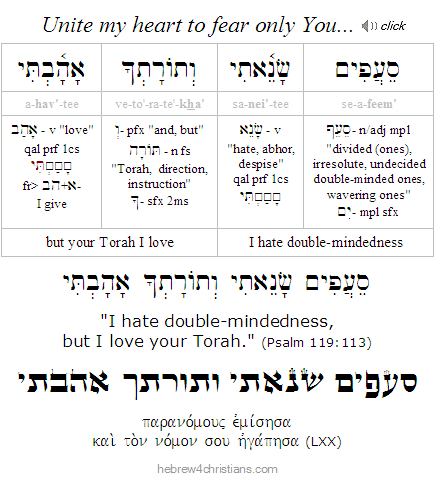 |
King David said, "I hate double-mindedness, but I love your Torah" (Psalm 119:113). Note that the word "double-mindedness" (סֵעֲפִים) is translated as παρανόμους (para+nomos) in the LXX, literally, "one who reasons around the Torah," that is, a lawless person quick to excuse himself from the demands and truth of God's moral will and authority... Some translations render this word as "frivolous-minded," "light-minded," or "vain," though the Hebrew word comes from a root (סעף) that means to split or to divide, fork-like, like branches of trees waved with the wind to and fro (compare James 1:8-9; 4:8; 1 Kings 18:21). "Double-mindedness" therefore seems to be a fair translation in English.
The contrast is between ambivalence, or being "two-souled" (δίψυχος), and the desire for the truth of God's Torah that unifies the soul. To be undivided, wholehearted, pure of heart, and so on, means to abhor all fantasies of imagination or thought that lead us away from the Divine Presence. "Take every thought captive" (2 Cor. 10:5). We must always be on guard lest we be seduced from our heart's focus and direction (Heb. 4:1).
Consider temptation to be a "rabbit hole" that leads to discovery about what you really need. Take your temptation to the LORD and ask Him to fill the void, to strengthen your heart, to heal the inner divide, and so on. He already knows what's happening within your adulterous heart, so come before Him boldly to find healing and help (Heb 4:16). "God has not given us the spirit of fear, but of power and of love, and of a "sound mind" (σωφρονισμός), literally, a "delivered" mind, "healed" from fragmentation (2 Tim. 1:7). The Greek word "sound mind" (σωφρονισμός) comes from the verb sodzo (σῴζω), meaning "to save," from soaos (σοας) "safe," in the sense of being under restraining influence of the Spirit of God...
 |
Wounded Shepherd...
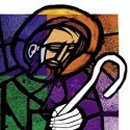
[ The following concerns this week's Torah reading, parashat Pinchas....
06.28.21 (Tammuz 18, 5781) From our Torah this week (i.e., parashat Pinchas) we read Moses' appeal for his successor: "Let the LORD, the God of the spirits of all flesh (אלהֵי הָרוּחת לְכָל־בָּשָׂר), appoint a man over the congregation who shall go out before them and come in before them, who shall lead them out and bring them in, that the congregation of the LORD may not be as sheep that have no shepherd" (Num. 27:16-17). The Koznitzer rebbe commented here that Moses asked God to appoint a leader "for all flesh," le'khol basar (לְכָל־בָּשָׂר). Rearranging the letters of basar (בָּשָׂר), he formed the word shavar (שָׁבָר), which means "to break in pieces," and concluded that a true leader should be one with a broken heart (לב שבור), that is, one who can sympathize and have pity on his people (Heb. 2:8; 4:15; 5:1-ff). God's leader should not be proud or aristocratic, but like a shepherd, a plain and simple person, who guides his people to observe the ways of the LORD. Therefore our beloved Master Yeshua is called a "man of sorrows who knows grief" (Isa. 53:3).
Hebrew Lesson:
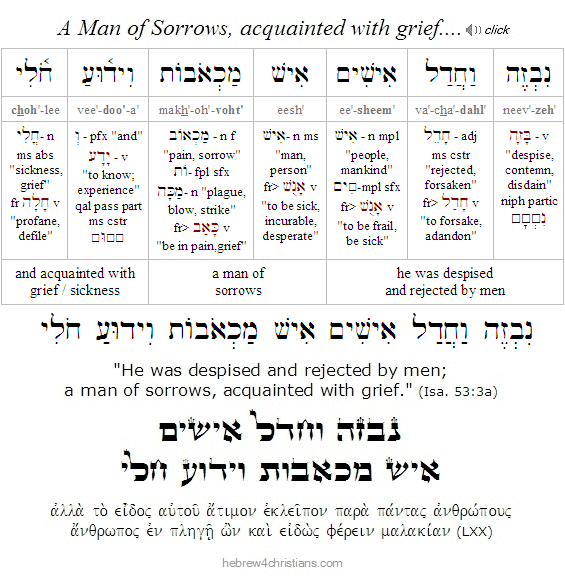 |
Presence in Prayer...
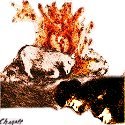
06.28.21 (Tammuz 18, 5781) We often need to pray before we can pray... "Lord, teach us to pray" (Luke 11:1). The sages say that when you so pray, your focus should be so concentrated that you are ready to die during the prayer. Regard yourself as a living sacrifice (korban chai) and offer your blood, your body, your soul, your will upon the altar before God (Rom. 12:1). Say, "Lord, I offer myself to Thee, to do with me as Thou will. Relieve me of the bondage of myself, that I might do Thy will..." Ask for the Holy Spirit to breath out the words of God's heart; cleave to God as if you had ascended before the Throne of Grace. "O LORD, open my lips and my mouth will declare your praise."
Hebrew Lesson:
When we pray earnestly, from the heart, we "come to ourselves" and return to what is most essential for our lives. We offer up everything to God. As we focus on what matters most, namely our need for God, the Holy Spirit will groan on our behalf in intercession (Rom. 8:26).
Hold Fast to Truth...

06.28.21 (Tammuz 18, 5781) One of the main strategies of the devil is to induce a sense of forgetfulness, apathy, and hopelessness... The devil wants you to lose sight of what is real and who you really are. He lives in the darkness of the lie, the fear of the heart, and the rage of the bitter. The truth is your weapon against the cascade of lies that pours forth from the world and its various princes. The entire venture of teshuvah (repentance) presupposes that you are created "in the image of God," that you are related to him, and therefore you have infinite value and dignity. This is all the more evident in light of the awesome ransom that Yeshua gave to reconcile your soul with God. Therefore hold fast to the truth, friends; da lifnei mi attah omed - "know before Whom you stand." Turn to what is real, refuse the lies and despair of this fallen world, and review what will abide the test of Eternity....
Hebrew Lesson:
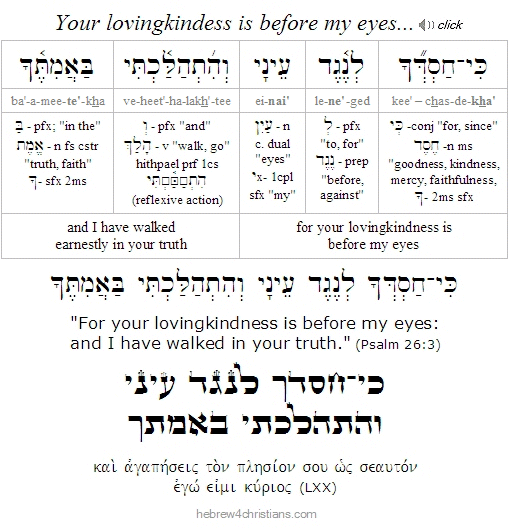 |
Note that the verb translated "I have walked" (הִתְהַלַּכְתִּי) is "hithpael," a verb pattern used to express reflexive, intensive action done to oneself. Therefore we could translate this as "I earnestly choose to walk" in the truth, indicating decisiveness of intent, focus, purpose... As King Shlomo said: בְּכָל־דְּרָכֶיךָ דָעֵהוּ - "choose to know Him in all your ways" (Prov. 3:6).
Perfected Strength...

06.27.21 (Tammuz 17, 5781) "Have you not known? Have you not heard? The Eternal One, the LORD, is the Creator of the ends of the earth (בּוֹרֵא קְצוֹת הָאָרֶץ). He does not faint nor grow weary; his understanding is unsearchable. He gives power to the faint, and to him who has no might he increases strength" (Isa. 40:28-29). Human reason has no objection that God can impart strength, but it objects that strength is found in those who are broken and weary – that is, to those mortally wounded in the battle against evil. The principle of the self-life, the ego, religious observance, "doing the law," etc., is a spiritual dead-end. The word is this: God gives strength to the weary, to the faint, to those who are without potency or power. But this means that we first must be emptied, broken, and stripped of our self-sufficiency before the strength of God is manifest in us: "My power is made perfect (τελειοῦται) in weakness" (2 Cor. 12:9). God's way is first to break us, to make us weaker and weaker, so that he can then fill us with the miraculous divine nature. Like all sacrifices that were brought to the altar, we must pass through death to life by means of our union with the Messiah at the cross... It is only after the cross that it may be said, "It is no longer 'I' who lives; now it is Messiah who lives His life in me." There is indeed strength, power, and victory – but such comes after the cross, after we reckon carnal energy as useless. Not by might, nor by power, but by My Spirit, says Adonai Tzeva'ot (Zech. 4:6).
נתֵן לַיָּעֵף כּחַ
וּלְאֵין אוֹנִים עָצְמָה יַרְבֶּה
no·tein · la·ya·eif · ko'·ach
oo·le·ein · o·neem · otz·mah · yar·beh

"He gives power to the faint,
and to those who have no might he increases strength"
(Isa. 40:29)

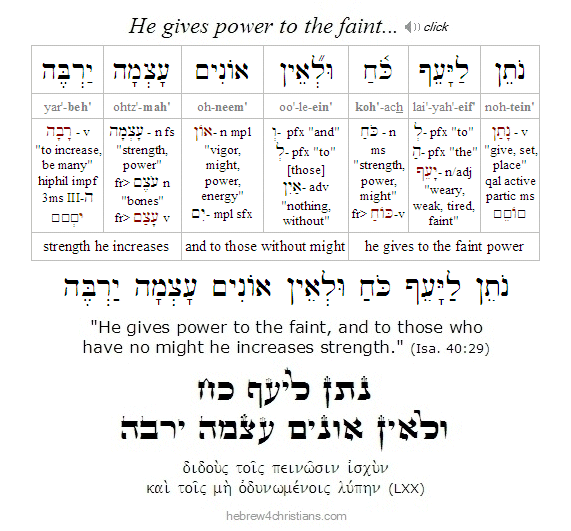
Where we read, "Messiah who loved me and gave himself for me" (Gal. 2:20), we emphasize the object of God's redeeming love; we stress that this word is being spoken to "me," and that Messiah's love is poured out "for me." But how can we justify doing so, in light of the innumerable souls that have been brought forth in the world? The Mishnah asks, "Why was man created alone?" and answers so that each person must say the world was created for me. "Whoever destroys a soul, it is considered as if he destroyed an entire world; and whoever saves a soul, it is considered as if he saved an entire world..."
Shavuah Tov Podcast:
Parashat Pinchas...
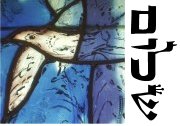
06.27.21 (Tammuz 17, 5781) The audio podcast for parashat Pinchas provides an overview of the Torah reading as well as a discussion of the meaning of faith, the importance of the gospel message, and how Yeshua is revealed in the life of Pinchas... I also discuss the "Three Weeks of Sorrow" leading up to the somber holiday of Tishah B'Av as well as the significance of the Jewish holidays (mo'edim) in general. I hope you find it helpful.
Parashat Pinchas - פינחס
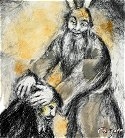
06.27.21 (Tammuz 17, 5781) Last week's Torah portion (i.e., parashat Balak) first introduced us to a man named Phinehas (i.e., "Pinchas"), the son of Eleazar the priest and grandson of Aaron, who, during the tragic rebellion at Baal Peor, zealously removed evil from Israel by driving a spear through a tribal prince who was brazenly cavorting with a Midianite princess in defiance of God's law. On account of Pinchas' zeal for the truth of Torah, God stopped the plague and Israel was delivered from great destruction... This week's Torah portion (i.e., parashat Pinchas) begins with the LORD rewarding Pinchas by granting him a "covenant of peace" (ברית שׁלום) and an everlasting priestly line in Israel (ברית כהנת עולם). As I hope you will see, Pinchas pictures the Messiah Yeshua, and the covenant of priesthood given to him is a picture of the greater priesthood after the order of Malki-Tzedek.
Jewish tradition says that when Aaron and his sons were commissioned as the exclusive priests of Israel (Exod. 40:12-15), the office applied only to themselves and their future descendants. Since Aaron's grandson Pinchas had already been born at the time the promise was given, however, he did not automatically receive this honor, especially since his father Eleazar (the son of Aaron) was married to an "outsider" -- namely, the daughter of Yitro (also called Putiel, Exod. 6:25). This explains Rashi's statement that the other tribes mocked Pinchas. How dare this "son of an outsider" kill a nassi (prince) of Israel (i.e., Zimri), especially since Pinchas' mother was regarded as an idol worshipper! The LORD honored Pinchas' zeal, however, and overruled the tribalism of the Israelites, and he was therefore elevated to be a priest with special honor before the LORD.
God looks at the heart, chaverim, and is able to make those who have zeal for Him true priests of the LORD! You don't have to be born Jewish to impress the LORD God of Israel, since He's "no respecter of persons" (Rom. 2:11). Not only can He create spiritual children of Abraham from the stones of the ground (Matt. 3:9; Luke 3:8), but He can turn someone considered a non-Jew (by the rabbis, anyway) into a highly honored priest of Israel (1 Pet. 2:9-10). Indeed, many descendants of Pinchas later became the most faithful of the High Priests of Israel during the First Temple period.
Note that according to one midrash, when Zimri and Cozbi (the Midianite princess) were cavorting, they actually ran inside the Tabernacle compound itself, directly past Moses and the people who were weeping at its entrance (Num. 25:6)! Pinchas then took a spear from the Tabernacle guards and followed after them. When he caught up with them within the Tent of Meeting itself, he pierced them through (Num. 25:7-8). After this, thousands of men from the tribe of Simeon ran in after him, seeking to kill him. Pinchas was in such a state of terror that "his soul left him" and the souls of Nadav and Abihu (Aaron's deceased sons) entered his body -- and by this means he became a Kohen.
Parashat Pinchas (like parashat Emor in Leviticus) also mentions of all of the (sacrifices of the) mo'edim (holidays) given to the people Israel (Num. 28). These include the daily (tamid), weekly (Shabbat), monthly (Rosh Chodesh) sacrifices, as well as the sacrifices assigned to the special holidays: Passover, Shavuot, Rosh Hoshannah (Terumah), Yom Kippur, Sukkot and Shemini Atzeret. The sages said that remembering the joys of the Temple and the special celebrations of the Jewish people promote the call to do teshuvah during the otherwise somber time of the Three Weeks of Sorrow.
Fast of the Fourth Month...

[ This year the Fast of Tammuz begins at dawn Sunday, June 27th and lasts until sunset...]
06.26.21 (Tammuz 16, 5781) According to Jewish tradition Moses shattered the tablets on the 17th day of the 4th month, after he came down from Sinai and found the people worshipping the golden calf. Today, this tragic date is commemorated as a fast day (i.e., the "Fast of Tammuz"), which marks the beginning of a Three Week season of mourning that culminates on Tishah B'Av (i.e., the date when the people tragically believed the evil report of the spies and were sent into exile).
During this Three Week season of national lamentation, the weekly readings from the prophets are all "Haftarahs of Rebuke" that warn the people about imminent judgment from heaven, and therefore the theme of most Jewish religious services is teshuvah (repentance). In addition, weddings or other joyous events are usually not held during this time of year. Indeed, among the very Orthodox, the last nine days of the three weeks are the most rigorous and solemn. Beginning on the first day of the month of Av, traditional mourning customs are practiced in anticipation of the most solemn fast day of Tishah B'Av, when the Book of Lamentations (Megillat Eichah) is plaintively recited during the evening service.
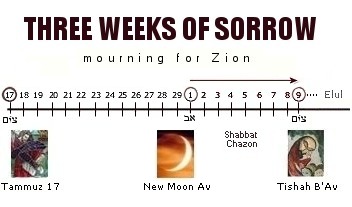 |
This year the Fast of Tammuz begins at dawn Sunday, June 27th and lasts until sunset. Tishah B'Av begins sundown Saturday, July 17th and ends at sunset the following day.
Hebrew Lesson:
Shepherd in Darkness....

06.25.21 (Tammuz 15, 5781) "Yea, though I walk through the valley of the shadow of death, I will fear no evil..." (Psalm 23:4). O God of Light, Light of the world, surely You know my need for light as I look to You, especially when darkness tries to extinguish my hope. Despite my inability to see you now, help me to know that you are with me; let "thy rod and thy staff comfort me" and lead me closer to you. Lord, when I am afraid, quicken the faith you have put within my heart. Be Thou my Shepherd in my darkness, O Lord my God...
Hebrew Lesson:
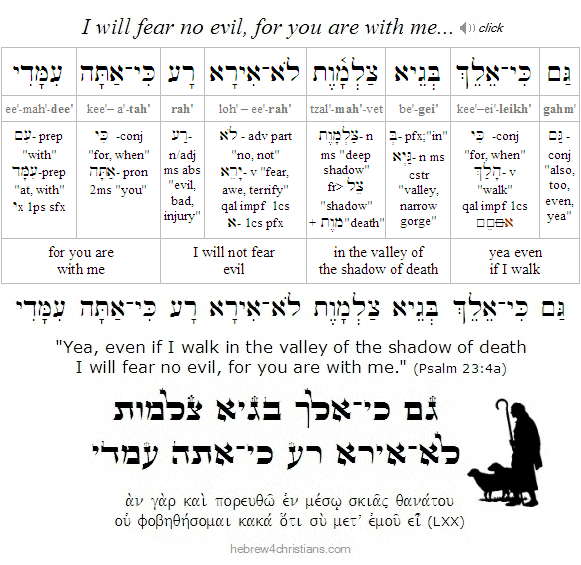 |
"Be not afraid." Over and over again in the Scriptures we hear the LORD saying to those who trust in Him, al-tirah, "be not afraid." Nachman of Breslov is reported to have once said, "All the earth is a very narrow bridge (כָּל־הָעוֹלָם כֻּלּוֹ גֶּשֶׁר צַר מְאד), and the point of life is never to be afraid." Likewise we trust Yeshua to be the Bridge to the Father, the narrow way of passage that leads to everlasting life. He calls out to us in the storms of this world, "Take heart. It is I; be not afraid" (Matt. 14:27). The heart of faith senses the LORD's presence, even in the darkness, and hears the Spirit saying, "I am with you..."
I do not see the road ahead of me, I cannot know for certain where it will end. Nor do I really know myself, and the fact that I think I am following your will does not mean I am actually doing so. But I believe the desire to please you does in fact please you, and I hope I have that desire in all that I am doing. I hope that I will never do anything apart from that desire. And I know that if I do this you will lead me by the right road, though I may know nothing about it. Therefore, I will trust you always, though I may seem to be lost and in the shadow of death. I will not fear, for your are ever with me, and you will never leave me to face my perils alone. - Thomas Merton
In times of testing, how desperately do we need a sense of companionship and intimacy with the Lord! When you feel abandoned, ashamed, or alone; or when you are afraid and unsure of yourself; or when pain distances you from others, nudging you to isolation or loneliness, then may God's Spirit brood over you, whispering your name, reminding you that you are never alone, and that God Himself is forever for you, despite yourself. Therefore "fear no evil," because God is with you in the midst of your present darkness. As it is written: "Surely goodness and love shall pursue you all the days of your life, and you shall dwell in the house of the LORD forever" (Psalm 23:6). Come alive, O heart of faith!
Note: You prayers for this ministry are sincerely appreciated, friends... Shabbat Shalom!
Truth's Narrow Gate...
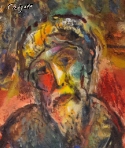
06.25.21 (Tammuz 15, 5781) The theology of our Messiah insists that truth matters, and that knowing the truth about God is absolutely essential for life itself. Nothing is more important; nothing is more vital. As Yeshua solemnly affirmed: "This is eternal life (חַיֵּי עוֹלָם), that they may know you, the only true God (אֶל־אֱמֶת), and Yeshua the Messiah (יֵשׁוּעַ הַמָּשִׁיחַ) whom you have sent (John 17:3). Note that the Hebrew word for knowledge is da'at (דַּעַת), a word that implies intimate cognitive differentiation and the apprehension of spiritual reality. Your life is a venture of faith, an irrepeatable, infinitely costly venture.
Faith both affirms and negates at the same time. Like falling in love with someone, the cost of passionately believing that Yeshua (alone) is the "way and the truth and the life" comes at the expense of other faith possibilities -- and thereby incurs the risk of offense (Rom. 9:33, 1 Pet. 2:7-8; Gal. 5:11, Matt. 24:8-11; etc.). Does this make faith in Messiah intolerant then? Not at all... All faith expressions - including skepticism, universalism, or "politically correct" humanism - are exclusivistic commitments to whatever the believer embraces as his or her "ground of ultimate concern." Each person has their own "narrow gate" -- though this gate does not necessarily lead to life. Yeshua taught that the "narrow gateway of life" (שַּׁעַר אֶל־הַחַיִּים) is found only by the few (Matt. 7:13-14), and this doubtlessly was said to reprove the mob mentality that regards "tolerance" as the greatest of all virtues and fanaticism as the greatest of all evils. There is safety in numbers, the mob reasons, and the life of genuine conviction makes you an outcast of the group, since it exposes the "groupthink" and its inevitable moral evasions.... To worldly culture, public enemy number one is the person of real conviction. This was true in the days of the Hebrew prophets as it is today. "The voice crying in the wilderness" often cries alone.
Hebrew Lesson:
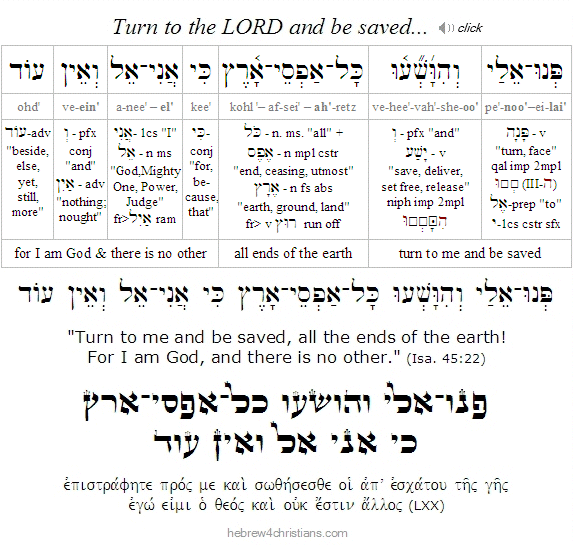 |
Keep on Trusting...

06.25.21 (Tammuz 15, 5781) When Yeshua said, "Let not your heart be troubled... I go to prepare a place for you," he was assuring his friends that he had matters well under his control, and therefore they did not need to worry, since his passion rendered their salvation completely secure... The future is a "prepared place" for you, even if life in this world is often marked by testing and various refining fires. God has not promised to rescue us according to our own schedule, however, so if it appears that your prayers are not immediately answered, keep waiting in faith: "Rejoice, even if you have been grieved by various trials, because the tested genuineness of your faith -- more precious than gold that perishes though it is tested by fire -- may result in praise and glory and honor at the revelation of Yeshua the Messiah" (1 Pet. 1:6-7). God works "all things together for good," and since the exercise of faith is your good, he engineers all things to build your faith. "For my thoughts are not your thoughts, neither are your ways my ways, says the LORD" (Isa. 55:8).
Recall the words: "Let him who walks in darkness and has no light trust in the name of the LORD and rely on his God" (Isa. 50:10). Trusting in God (i.e., bittachon - בִּטָּחוֹן) doesn't mean that we are obligated to say this is "the best of all possible worlds," though it does mean we believe that eventually God will wipe away every tear and make all things right... Bittachon is a word for this world, which says, "Though he slay me, I will trust in him..." Those who call upon the LORD can trust not only in concealed good behind ambiguous appearances ("all things work together for good") but also in a future, real, substantive good that will one day be clearly manifest for us all... We fight the "good fight" of faith, which is a worthy struggle that eventually is realized for blessing. Meanwhile, may the LORD our God keep us from such depth of sorrow that leads to sickness, darkness and despair.
Hebrew Lesson:
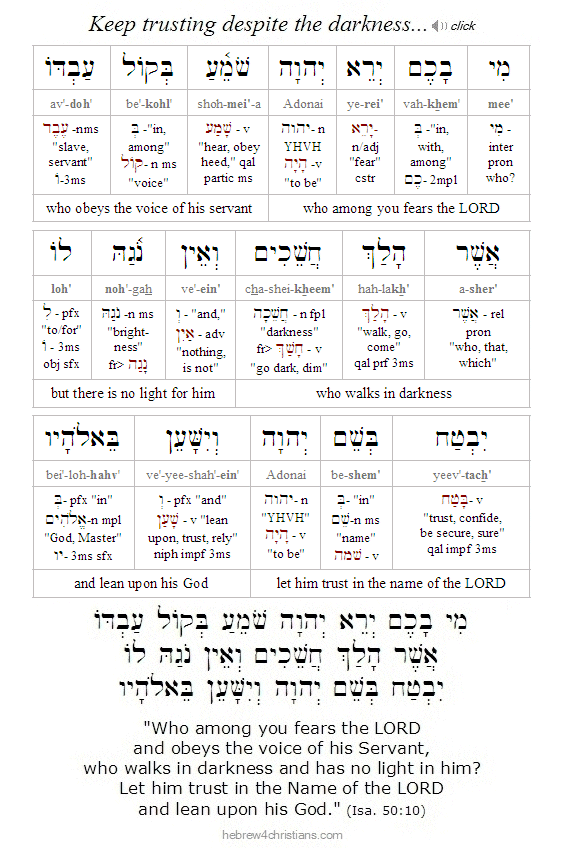 |
The very last promise of Scripture is "I come quickly" (אֲנִי בָא מַהֵר) and the last prayer is, "Amen, come, Lord Yeshua" (אָמֵן בּאָה־נָּא הָאָדוֹן יֵשׁוּעַ) [Rev. 22:20]. Meanwhile we "inwardly groan" for the fulfillment of our redemption; since presently we are suspended between worlds, walking in hope yet subject to the vanities that befall all flesh. And though God may tarry, He declares, "I am the LORD; in its time I will hasten it" (Isa. 60:22). So we are made captives to hope, clinging to the promise of our ultimate healing and redemption. Our hearts therefore affirm that God is faithful "to keep you from falling, and to present you faultless before the presence of his glory with exceeding joy" (Jude 1:24). Amen. God will help us before He will help us, and may He come speedily, and in our day....
If you listen closely you can hear the hoof-beats of an approaching White Horse, and on it the One whose name is Truth… He is coming and he cannot be stopped.
 |
Rebirth and Spiritual Death...

06.25.21 (Tammuz 15, 5781) People tend to underestimate the radical nature of their sinful condition, which truly is a "sickness unto death." However, even the metaphor of lethal sickness itself is not strong enough, since the spiritual condition of the natural man is spiritual death... Apart from direct divine intervention on behalf of the individual soul, a person is literally unable to respond to God and receive the gift of eternal life. That is why Yeshua taught that we need a spiritual rebirth in order to see the Kingdom of God (John 3:3). This is the new principle of life from God (i.e., chayim chadashim: חַיִּים חֲדָשִׁים) that operates according to the "law of the Spirit of life" (Rom. 7:23, 8:2). God loves His children with "an everlasting love" (i.e., ahavat olam: אַהֲבַת עוֹלָם) and draws us to Himself in chesed (חֶסֶד, i.e., his faithful love and kindness). As it is written: "I love you with an everlasting love; therefore in chesed I draw you to me" (Jer. 31:3). Note that the word translated "I draw you" comes from the Hebrew word mashakh (מָשַׁךְ), meaning to "seize" or "drag away" (the ancient Greek translation used the verb helko (ἕλκω) to express the same idea). As Yeshua said, "No one is able to come to me unless he is "dragged away" (ἑλκύσῃ, same word) by the Father" (John 6:44). We are chosen from above (John 15:16). God's chesed seizes us, takes us captive, and leads us to the Savior... Spiritual rebirth is a divine act of creation, "not of blood nor of the will of the flesh nor of the will of man, but of God" (John 1:13). God is always preeminent, and the salvation of a particular soul is ultimately His prerogative.
Hebrew Lesson:
Daily Dvar Podcast:
Torah of the Vine...

06.25.21 (Tammuz 15, 5781) In today's "Daily Dvar" broadcast (link below) I discuss the "Torah of the Vine," that is, the analogy of the Vine and the branches that Yeshua taught his disciples: "If anyone does not live in me, he is cast off as a branch, and withers..." (John 15:6). We find life only as we remain connected to the Source and Conduit of life, who is the Messiah, the Savior and LORD. True life grows out a heart connection with Yeshua, and without that connection our lives become vain and yield no eternal significance. I hope you find it encouraging, friends.
The Outer and the Inner...
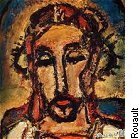
06.24.21 (Tammuz 14, 5781) The message of the cross of Messiah is that your deepest need for love, peace, and happiness is not to be found in this world, nor in the religious philosophies of this world, but instead is found by being healed from the sickness of spiritual death. That's the gospel message, after all, which presents an offense to the "flesh," that is, to natural human pride and humanistic aspiration. Indeed many religious people seem to think that something more is needed than the miracle of Messiah, and they therefore both underestimate the severity of our lost condition while flattering the ego with the conceit that it can contribute something to prospect of genuine eternal life... The Apostle Paul admonished: "If with the Messiah you died to the axioms of this world, why, as though you still belonged to the world, do you submit to its presuppositions (i.e., δόγματα)?" (Col. 2:20). Religious "legalism" (i.e., adherence to formula or ritual rather than living in personal faith) is a worldly practice that leads to a false sense of security in the mantras, ceremonies, "virtue signaling," theological jargon, and various "mummeries" of religion. Worse still may such worldly religion lead to a "holier-than-thou" sense of spiritual superiority or elitism. Yeshua denounced the religionists of his day by focusing on what mattered most of all -- healing the outcasts, touching the lepers, seeking the lost, and being a "friend of tax collectors and sinners" (Matt. 11:19). Focusing on outer forms of religion -- even Torah based religion -- elevates the law to an end in itself rather than as a means to the greater end of love and healing. We have to be careful not to make an idol out of religious practices, for all the commandments are meant to serve the end of receiving God's love and sharing that blessing with others. Any "Torah observance" that leads you to "thank God that you are not like other people" (Luke 18:11) is therefore not genuine Torah observance at all, for the heart of the Torah is love, just as love is the Torah of the Gospel (John 15:12).
"Since you are precious and honored in my sight, and because I love you, I will give people in exchange for you, nations in exchange for your life" (Isa. 43:4). Receiving this message takes faith that is not based on your human experience. If you really know yourself, that is, if you are conscious of your own inner condition, then you are familiar with the voice of self-rejection and you may harbor the conviction that you are unlovable, unworthy, and essentially unacceptable. This is a place of profound loneliness and exile.... the hell of self-hatred. The deeper Torah of God's love (i.e., the cross), however, looks away from the self to the beauty of the LORD, to the one who calls you "precious and honored," "beloved," "redeemed," "treasured," "my child." Faith in God demands that you understand that he esteems your life as infinitely valuable, and indeed worth the very sacrifice of what is most dear to himself, so that you may know yourself as his beloved.
"Escape for your life. Do not look back..." (Gen. 19:17). You must turn away from what once defined you and never look back... This includes not only turning away from your former sins, but turning away from the guilt and shame of your sins... Living in the past, wallowing in your sin and regretting your mistakes, can cause you to feel worthless and even hopeless. If you feel compelled to revisit your former life, then be sure to do so before the foot of the cross, in light and presence of God's redemptive love for you. You can't change the past, but you can leave it behind by turning it over to God for healing. Teshuvah (repentance) means accepting who you are in light of God's love and salvation for your soul. "Brothers and sisters, I do not consider myself to have attained this, though I am single-minded: I forget the things that are behind and reach out for the things that are ahead ... heeding the upward call of God in Yeshua our Messiah" (Phil. 3:13-14). May you "find yourself in Him, not having a righteousness of your own that comes from the law, but that which comes through faith in Messiah, the righteousness from God that depends on faith" (Phil. 3:9).
Remember that God's way of deliverance is entirely different than man's way. Man tries to suppress the flesh, to cover it up, to justify its failings, or to enlist its power in the battle against sin (i.e., religion), but God's way is to remove the flesh from the equation. The goal is not to make us stronger and stronger, but rather weaker and weaker, until the flesh is "crucified" and only the sufficiency of the Messiah remains. Then we can truly say, "I have been crucified with Messiah. It is no longer I who live, but the Messiah who lives in me. And the life I now live in the flesh I live by faith in the Son of God, who loved me and gave himself for me" (Gal 2:20). The word "Hebrew" (עִבְרִי) means one who has "crossed over" (עָבַר) to the other side, as our father Abraham did (Gen. 14:13). It is on the other side of the cross that we experience the very power that created the universe "out of nothing" (i.e., yesh me'ayin: יֵשׁ מֵאַיִן) and that raised Yeshua the Messiah from the dead.
Hebrew Lesson:
Blessing of Inner Peace...

[ In our Torah portion this week (Balak), we read how Balaam intended to curse the Israelites, but God "took hold of his tongue" and made him bless the people instead... ]
06.24.21 (Tammuz 14, 5781) It is remarkable that the traditional morning blessing recited at synagogues around the world begins with words attributed to Balaam, the enigmatic and self-styled prophet: Mah Tovu: "How lovely are your tents, O Jacob; your dwelling places, O Israel!" (Num. 24:5). The sages say that the word "tent" (אהֶל) refers to the inner life – how we really feel inside – whereas the word "dwelling" (מִשְׁכָּן) refers to the outer life - our place or circumstances. Together, the inner and the outer mark the quality of our lives, but the inner is the starting point, since we must first learn to live in peace with ourselves. This is vital: we must first tolerate our shortcomings and practice compassion toward our frail humanity... This is sometimes called shalom ba'bayit, "peace in the home" (of the self). Such inner peace is the greatest of blessings, since without it we will cling to pain, fear, and anger, thereby making us unable to find our place at the table in God's kingdom of love.
מה־טבו אהליך יעקב
משׁכנתיך ישׂראל
mah - toh'·voo · o·ha·ley'·kha · Ya·a·kov
meesh·ke·no·tey'·kha · Yees·ra·el
"How lovely are your tents, O Jacob,
your dwelling places, O Israel"
(Num. 24:5)

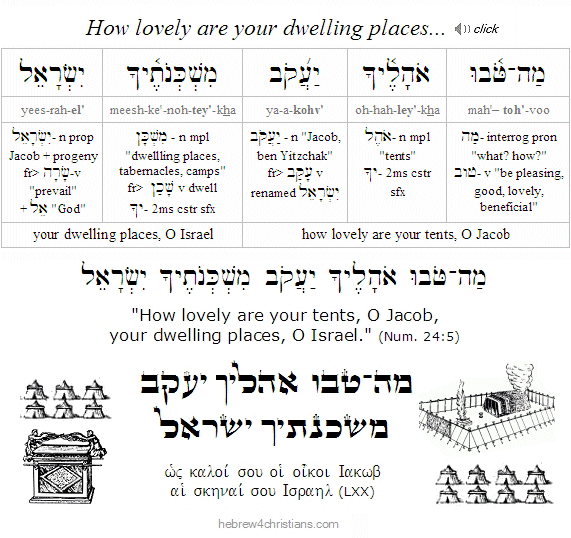
The Doctrine of Balaam...

[ The following entry concerns this week's Torah reading, parashat Balak... ]
06.24.21 (Tammuz 14, 5781) The "doctrine of Balaam" (ἡ διδαχή Βαλαάμ) is the wicked strategy of enticing others to sin by encouraging them to "eat food offered to idols" and to engage in sexual immorality and lawlessness (Rev. 2:14). This was how Balaam was able finally to curse the Israelites at Baal Peor, after all (see Num. 25:1-10; 31:16). In short, Balaam's doctrine was one of "syncretism," advocating a mindless "tolerance" that arrogantly claimed that all religions are equally true, and therefore all are equally false... Such "tolerance" is a charade for moral and spiritual nihilism that creates weakened people easily controlled by political fascism. In ancient Rome, official "tolerance" led to the brutal intolerance of the "Imperial Cult" where the power of the State (represented by the Emperor) was worshiped. In our age, the doctrine of Balaam first entices people to "eat food offered to idols," that is, to partake in the irrational dogma of "absolute tolerance" and unthinking universalism. After opening the heart to accept such idolatry, sexual immorality is the natural expression, a consequence of self-deception. We must remain vigilant: God sets us free from the slavery of surrounding culture to become a witness of the truth. Assimilating with this world and its political ideals and cultural idols is a form of spiritual adultery. Do not fool yourself: Whoever makes himself a friend of the world is an enemy of God (James 4:4).
Hebrew Lesson:
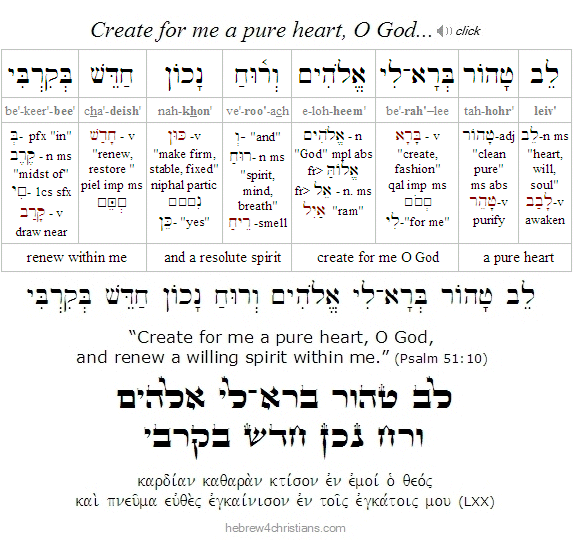 |
The Star Still Shines...
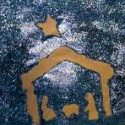
06.24.21 (Tammuz 14, 5781) In this week's Torah portion (i.e., Balak) we read an ancient prophecy of the coming Messiah: "a Star shall come out of Jacob..." Amazingly, the "meshugenah" prophet Balaam – who may have been the forebear of the "magi of the east" (Matt. 2:1-2) – actually foresaw the advent of the Messiah: "I see him, but not now; I behold him, but not near: a Star shall come out of Jacob (כוכב מיעקב), and a Ruler shall rise out of Israel" (Num. 24:17). Balaam's prophecy actually described the coming of the Messiah and his reign in two distinct aspects: "A Star from Jacob shall come" (literally, "shall lead the way," i.e., דרך), which refers to our Messiah's first coming as the way of life (i.e., הדרך החיים, John 14:6), "and a Ruler shall arise (i.e., וקם שׁבט) from Israel," refers to our Messiah's second coming to establish the Kingdom of Zion upon the final redemption.
דרך כוכב מיעקב
וקם שׁבט מישׂראל
da·rakh · ko·khav · mee·ya·a·kov
ve·kahm · she'·vet · mee·yees·ra·el

"A Star shall lead from Jacob,
and a Ruler shall arise from Israel"
(Num. 24:17)

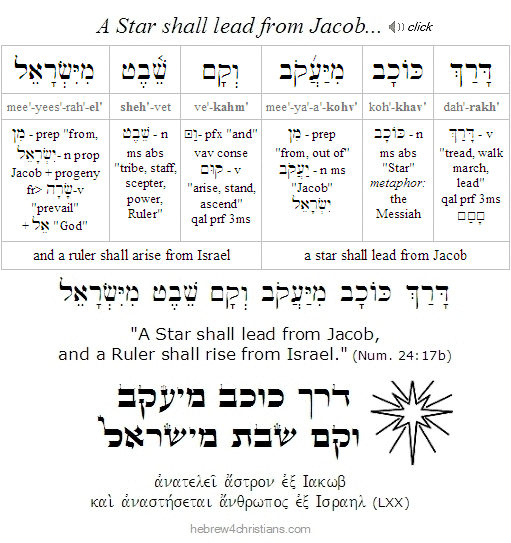
Curses turned to Blessings...
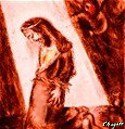
06.23.21 (Tammuz 13, 5781) Among other things, our Torah reading this week (i.e., Balak) teaches that God can (and does) turn curses into blessings (see Neh. 13:2). There are many instances given in Scripture. For example, Joseph was blessed despite the ill-will of his brothers: "You devised evil against me, but God devised it for good" (Gen. 50:20). Note that the same verb for "devised" (i.e., chashav: חשׁב) is used to describe both the evil intent of the brothers and the good intent of the Lord. This teaches us that God overrules the malice of men to effect his own good purposes, and therefore we can rightfully affirm gam zu l'tovah (גם זו לטובה), "this too is for good" (Rom. 8:28). Underlying the surface appearance of life (chayei sha'ah) is a deeper reality (chayei olam) that is ultimately real, abiding, and designed for God's redemptive love to be fully expressed. Resist the temptation, therefore, to judge by mere appearances. Forbid your troubles (or the troubles of this world) to darken the eye of faith. Do not unjustly judge God's purposes or try to understand His ways. As the story of Balaam shows, God makes even the wrath of man praise Him (see Psalm 76:10). "Then God opened Balaam's eyes, and he saw the Angel of the LORD (מלאך יהוה) standing in the way, with his drawn sword in his hand. And he bowed down..." (Num. 22:31). Indeed, every knee will bow to the LORD our God and Savior (Isa. 45:22-23; Phil. 2:10-11).
Hebrew Lesson:
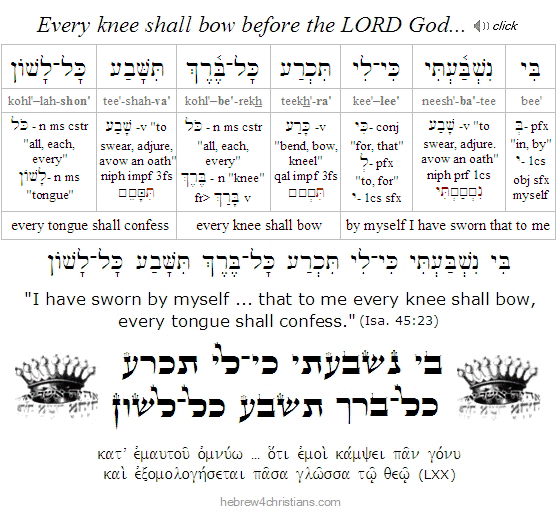 |
We find comfort that the schemes of the wicked are ultimately subject to the sovereign purposes of the LORD our God. Ein od milvado (אין עוד מלבדו) - there is no power that can be exercised apart from God's consent and overarching will... Indeed all authority on heaven and earth belongs to Yeshua, the "the Ruler of the Kings of the earth" (עֶלְיוֹן לְמַלְכֵי־אָרֶץ). As it is written, "All the nations you have made shall come and worship before you, O Lord, and shall glorify your name" (Psalm 86:9). Amen. Hashevenu, Adonai...
He is Faithful and True...

06.23.21 (Tammuz 13, 5781) In our Torah portion this week (Balak), we read how Balaam intended to curse the Israelites, but God "took hold of his tongue" and made him bless the people instead... It is encouraging to realize that despite the repeated failures of the Israelites in the desert, the LORD never let go of his people... Indeed, as the story of Balaam reveals, if a spiritual enemy should secretly arise to curse Israel, God would take the sorcerer "by the tongue" to evoke God's blessing instead (Deut. 23:4-5). As Balaam himself later confessed: "there is no sorcery (i.e., nachash: נחש) against Jacob; there is no divination (i.e, kesem: קסם) against Israel" (Num. 23:23). Unlike scheming Balaam, who was willing to say whatever people wanted to gain temporal reward, God is "not a man that he should lie, nor a son of man, that he should change his mind" (Num. 23:19, 1 Sam. 15:29). Whatever the LORD has promised he will invincibly perform: His word is full of integrity and truth: "The grass withers, the flower fades, but the word of our God will stand forever" (Isa. 40:8). Amen. The God of Israel is forever faithful in his love, and no one can overrule his desire (Num. 23:20; Rom. 11:29; Isa. 40:13). You can trust in your promised future, friend. As it is written: "No weapon fashioned against you shall succeed, and you shall refute every tongue that rises against you in judgment. This is the heritage of the servants of the LORD (זאת נחלת עבדי יהוה) and their vindication from me, declares the LORD" (Isa. 54:17).
Hebrew Lesson:
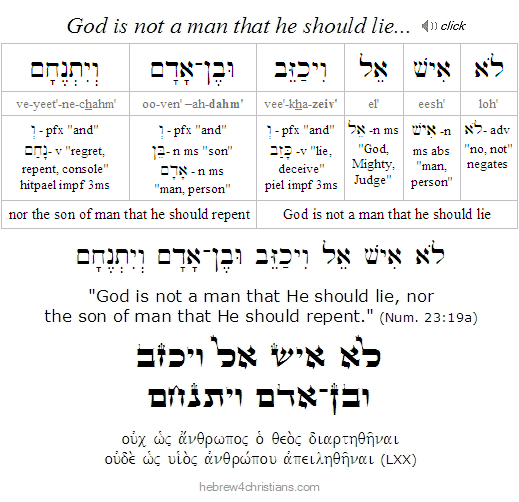 |
Through the Shadows...

06.23.21 (Tammuz 13, 5781) "Whom have I in heaven but you? And there is nothing on earth that I desire besides you" (Psalm 73:25). Such is the "exile of hope" we suffer in this world... Torah begins: "In the beginning God created the heavens and the earth, and the earth was "tohu va'vohu v'choshekh" (תהוּ וָבהוּ וְחשֶׁךְ) - confusion and emptiness and darkness - which the sages interpret to mean that when we truly understand that God created the heavens and the earth, we will realize our earthy desires to be barren, empty and unreal.
In their despair, Plato and the early Greek philosophers sought "timeless universals" which they believed disclosed the reality of an "upper world," a heavenly realm of unchanging goodness, beauty, and truth. The world we experience with our senses is a shadowy place of change and decay; but the real world, discerned by clear thinking, is a place of permanence, goodness and illumination. Likewise the righteous soul trusts that despite this fleeting world (העולם הנעלם) that turns to dust, there is an eternal realm (התחום הנצחי), a place of abiding love, and a heavenly home.
The land of promise is a "foreign land" to this world, but the heart of faith beholds "the city that has foundations, whose designer and builder is God" (Heb. 11:10). "For here we have no lasting city, but we seek the city that is to come" (Heb. 13:14). Therefore "we look not to the things that are seen but to the things that are unseen; for the things that are seen are transient (πρόσκαιρος), but the things that are unseen are eternal. For we know that if the tent that is our earthly home is destroyed, we have a building from God, a house not made with hands, eternal in the heavens" (2 Cor. 4:18-5:1). In this world we suffer exile, groaning to be with our Savior, the Source of all blessing: "I say to the LORD, "You are my Lord; I have no good apart from you" (Psalm 16:2).
Hebrew Lesson:
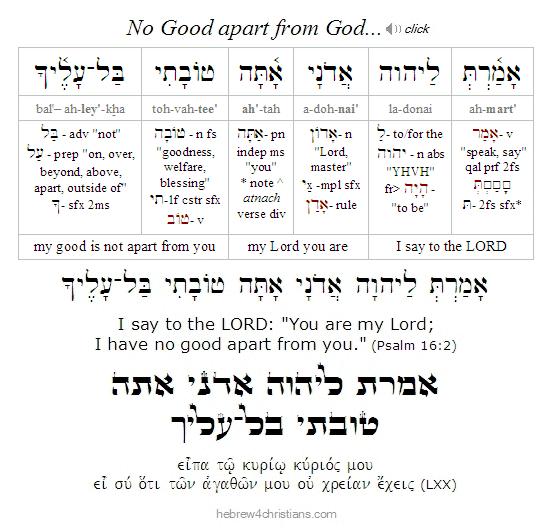 |
Established in God's Way...

06.23.21 (Tammuz 13, 5781) When you come to know the truth that the LORD is your Rock, the very ground upon which you live, move, and have your being, then are your steps are made sure, as it says, "The steps of a man are established by the LORD, when he delights in his way; though he fall, he shall not be cast down: for the LORD holds his hand" (Psalm 37:23-24). When you are unsure of your way, however, when you walk in uncertainty, you are unsteady in your resolve and are tempted to regard your life as being without any solid foundation. As you commit your way to the LORD, your steps are made sure, for you are walking before his Presence, and therefore you are upheld by his power.
Hebrew Lesson:
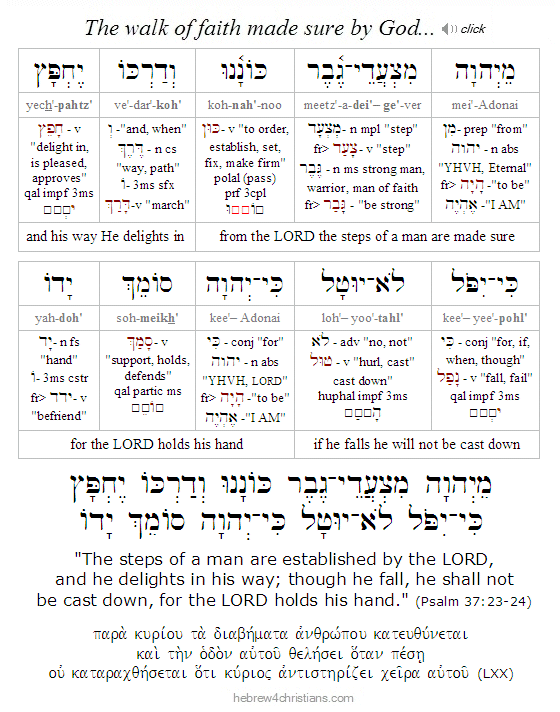 |
"I know that You know me, O LORD, for You indeed know all things; but am I known by You as someone who knows You? which is to say, do I really know You? am I really connected with You in the truth? I know that You are with me, O LORD, but am I with You? O LORD, draw me close to You now, in this hour; establish my steps and keep me from falling... Amen."
The Enigma of Balaam...
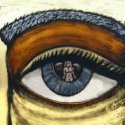
06.22.21 (Tammuz 12, 5781) In our Torah reading for this week (i.e., parashat Balak), we are introduced to a strange character named "Balaam" (בִּלְעָם), who was famously rebuked by a talking donkey, though in light of his supposed ability as a seer with the ability to prophesy in the Name of the LORD (יהוה), we may wonder what to make of this man. Was Balaam, who was a Midianite, a true prophet or a mere puppet in the hands of God?
Jewish scholar Nehama Leibowitz (1906-1997) notes two essential differences between Balaam (who was a Gentile) and the Hebrew prophets of Israel. First, Balaam sought "special visitations and visions," building altars and performing rituals to "force" the prophetic spirit. The Hebrew prophets, on the other hand, never engaged in these sorts of activities to hear from the LORD, and many were reluctant messengers, convinced of their own unworthiness and nothingness. Second, the Hebrew prophets cautiously spoke in the name of the LORD ("thus saith the LORD...") to authenticate their message, but Balaam took credit for his visions, flamboyantly describing himself as a great "seer" with special powers. Based on Joshua 13:22 (which describes him as a sorcerer), it is likely that Balaam was given a temporary gift of prophecy, perhaps like the "witch of Endor" was allowed to temporarily communicate with the dead (1 Sam. 28:7-20). In other words, God raised up Balaam to demonstrate his authority over the powers of darkness and to reassure Israel of God's ongoing protection of his people.... Ein od milvado.
In the New Testament, Balaam is regarded as one who sought to corrupt others for his own personal gain. The Apostle Peter does not call him the "son of Beor" but "son of Bosor" (τοῦ Βοσόρ), apparently a play on the Hebrew word basar (בָּשָׂר), meaning "flesh," implying that he was a "son of carnality" who enticed of Israel to sin at Baal Pe'or (see 2 Pet. 2:15; Num. 31:16). Peter further described him as a spiritual hireling who loved the "wages of unrighteousness" (μισθὸν ἀδικίας ἠγάπησεν), and who (like the Sophists of ancient Greece) was willing to sell his spiritual "services" without regard for the truth (Num. 22:7, Deut. 23:4-5). Balaam so loved the prospect of reward and the flattery of men that he justified his venture into darkness. "An evil eye, a haughty spirit, and a lusting soul - these are signs of disciples of the wicked Balaam" (Avot 5:22).
The Hebrew word melekh (מֶלֶךְ) means "king" and shares the same letter value as the word lemech (לֶמֶךְ), a name that means "powerful," but can also mean "fool." The sages reasoned that since the letter Mem represents the brain (מוֹחַ) or thought (מַחֲשָׁבָה), and the letters Lamed-Kaf refers to the kidneys (כליות), a king is one who uses right thinking to rule the heart (מ-לך), but a fool reverses the order and makes thinking a servant of the passions and the lower nature... Therefore Balaam was properly regarded as a fool.
Hebrew Lesson:
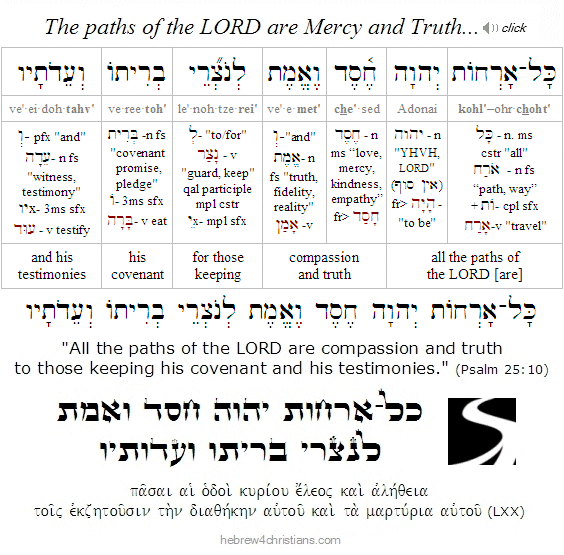 |
Note: For more on this topic, see the article: "The Way of Balaam."
Healing and Affliction...

06.22.21 (Tammuz 12, 5781) How do we suffer gracefully, without becoming hardhearted and bitter? How do we cope with the disappointment of unanswered prayer? How do we bear with the inevitable grief and loss of those whom we love? How do we understand some of the promises of God such as "ask whatever you will and I will do it" in relation to life in this world? Does God really listen to our prayers? Does he really care what happens to us?
Our options are somewhat limited regarding the existential question of why we suffer. We can either ignore the question altogether or face it directly. If we seek to earnestly answer the question, however, we again only have a couple of "live" theological options. First, if we affirm that God is both all-powerful and all loving but will not remove our personal suffering on the basis of some sort of "principle" (for example, because he will not overrule the consequences of our free will), then he may seem indifferent to our pathos, since this would seem to imply that God values the ideals of justice more than those of mercy and compassion. It should be clear that this option is not viable for believers in our Lord Yeshua, who clearly taught us that God desires "mercy and not sacrifice" and taught us to show compassion to all people (Matt. 9:13; 12:7; Matt. 6:15, etc.). Another approach is to affirm that God is indeed all-loving but not all-powerful. God simply can't intervene to end our suffering because he is unable to do so. God wants to bless us and take away our pain, but he's limited in his means to do so. In other words, evil exists independently of God's control as a powerful force that contends with and undermines creation. It should also be clear that this option is also not viable for believers in our Lord, since God is repeatedly affirmed to be "omnipotent" or all-powerful throughout the Scriptures (e.g., Job 42:1-2; Isa. 14:27, 43:13; Jer. 32:27; Dan. 4:35; Matt. 19:26; Psalm 147:5, etc.). This leaves us with the option that indeed God is all-loving, all-powerful, and therefore pain and suffering are "tools" in his hands, intended or permitted to work for his glory and for our ultimate good (Rom. 8:28). In other words, God uses suffering as a means of transformation of the soul (soul-building theodicy). In short, if we have trouble accepting God as our "Heavenly Father" who may use trouble in our lives to transform us in love, then we run the tragic risk of becoming bitter and resentful people. More can be said on this subject, of course, but this must suffice for now.
In light of such profound questions that so intimately affect our lives, it is important that we are "real" and honest with God... From our Torah we read: "You were not willing to go up but rebelled at the word of the LORD your God. And you murmured in your tents and said, 'Because the LORD hates us he has brought us out of the land of Egypt...'" (Deut. 1:26-27). We may decry the childish insolence of the people, we lament their lack of faith, and yet God was still speaking through Moses to Israel... The sages ask whether we can ever be justifiably angry at God, and answer that yes we can, because otherwise we could never love Him "bekhol levavkha," with all our heart (Deut. 6:5). Indeed, how can we claim to love God if we withhold the truth, lie to ourselves, and attempt to hide who we really are from Him? If you are angry at God, he already knows, so why the pretense? Being angry with God is part of being a real person in a real relationship with Him, and allowing yourself to express the truth of your heart to him is a sign of trust. God can "handle" the darker storms of your heart: trust Him to heal you this hour.
Hebrew Lesson:
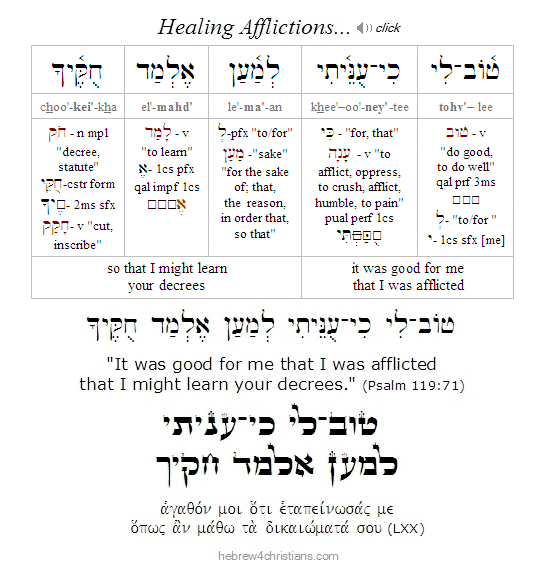 |
The Message of Jude...
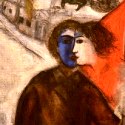
06.22.21 (Tammuz 12, 5781) Recall that our Torah portion last week centered on the rebellion of Korah, a man who questioned God's authority and arrogantly sought to "intrude" into the office of the priesthood. It is noteworthy that his rebellion is explicitly mentioned only once in the New Testament - in the Book of Jude - as an example of the fate that awaits those false teachers who likewise despise God's moral law. Unfortunately, Jude's warning is often neglected today, probably because people feel uncomfortable over the prospect of God's judgment. After all, in our "politically correct" age, people have been indoctrinated to regard "tolerance" as the greatest of virtues and "intolerance" (especially of moral evil) as the greatest of vices.... Most unbelievers don't mind hearing the "good news" of God's love, but they take exception when they are confronted with their personal duty to live according to the moral truth revealed in the Torah. Everyone wants to go to heaven though they don't want to find a Holy LORD when they get there... False teachers within the church are dangerous because they feed on this sense of discomfort and attempt to rationalize or compromise it away. Jude identifies them as spiritual impostors who "work from the inside" to confound or obscure the truth of God. Such a charlatan may appear to be a genuine believer, but their hidden agenda is to sow confusion and sin among God's children. They are proverbial "wolves in sheep's clothing" (Matt. 7:15). Jude's warning is especially important for us to heed today, because in the time immediately preceding the coming of the Messiah, spiritual deception and unbridled godlessness will greatly increase (2 Tim. 3:1-5).
It is important to see that the primary characteristic of a false teacher is that they "deny our only Master and LORD, Yeshua the Messiah" -- that is, they deny His moral authority and identity as the LORD God (Jude 1:4). Since Jude is writing to those who are "beloved by God," that is, to sincere Jewish believers, he is careful to remind us that it was Yeshua Himself who saved the people from Egypt -- but afterward destroyed those who did not believe (Jude 1:5). In other words, Jude wanted to ensure that we fully understand that it was Yeshua who was the thunderous "Voice of the Living God speaking from the midst of the fire" at Sinai (Deut. 5:26), and therefore to regard Him as none other than the great Lawgiver Himself (Matt. 5:17-7:29). That is why he is called "our only Master and LORD," and to esteem him as anything less is to deny the reality and truth of God.
Many churches today teach that we can (and should) disregard the moral law of God. They may give lip service to the "old testament," and they may claim it is still of historical interest that provides some interesting stories, but they arrogantly discount its essential message of holiness as being inapplicable to our daily lives. Often they are antinomian, teaching that we are no longer "under the law" and therefore are free to live in sin. Because they disregard (or "reinterpret") the clear moral teaching of the Torah (and the New Testament), they wink at fornication, support alternative "marriages," endorse gay clergy, and clamor for abortion rights. Many of the institutionalized churches promote syncretistic "replacement theology" that invent rituals, holidays, and symbols that are alien to the truth revealed in the Jewish Scriptures. These churches are often tolerant of "universalism," new age mysticism, and regard postmodern skepticism as "trendy." They may claim they are "seeker sensitive" but this is often "code" that they disregard the moral duty believers have to walk in personal righteousness. And because of their willful ignorance, some of these churches unthinkingly accept anti-Jewish propaganda - despite the irrevocable promises God has made to the Jewish people. Jude likens advocates of such doctrines to be "inhabitants of Sodom and Gomorrah" who will likewise be judged by God with eternal fire...
In this connection let me remind you of a verse from the New Testament: "Let no one in any way deceive you, for it [Yeshua's return] will not come until the apostasy (ἀποστασία) comes...." (2 Thess. 2:3). The word "apostasy" literally means "standing away" (ἀπό + ἵστημι) from the truth while making a pretense of abiding within it. In Hebrew, the word is meshuvah (מְשׁוּבָה), one who "turns away" from God. It is not a word that describes an unbeliever as much as it describes a traitor.... Some people think there will be a great time of revival just before Yeshua returns, but unfortunately that is not true. Indeed, Yeshua asked if he would find anyone who had faith at that time (Luke 18:8). At any rate, Jude states that those who "creep into" congregations to teach truth contrary to the revealed will of God are apostates, and the judgment they face is terrible to consider.
We can guard against false teachers by using discernment to "test their spirits" (1 John 4:1), but we can only be equipped to do so if we "build ourselves up in the most holy faith" (Jude 1:20). We build ourselves up by carefully studying the word of God - especially the Torah, since it is the foundation of all that follows. In this way we will be able to accurately wield the Sword of the Spirit (2 Tim. 2:15-16, 2 Pet. 1:19-20). In order to grow, we must have "good soil" for the seed of the word to take root. We "get rooted by knowing the roots" of our faith! Studying the Scriptures and praying in the Holy Spirit keeps us in the love of God as we await the mercy of Yeshua who gives us eternal life (Jude 1:21). This equips us to show mercy to those who have honest doubts and to save those defiled by sin (Jude 1:22-23).
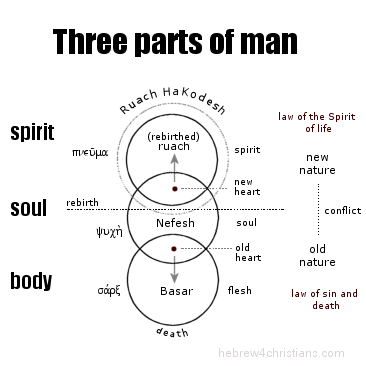 |
Note: For more on this subject, please see: "The Message of Jude..."
Beware of False Prophets...

06.22.21 (Tammuz 12, 5781) A common characteristic of false teachers (like Balaam) is that they are inwardly covetous, though they carefully cloak themselves as godly and pious... Of such the Apostle Peter says, "in their greed they will exploit you with 'plastic words' (πλαστοῖς λόγοις) to make merchandise out of you" (2 Pet. 2:3). This suggests they "mold" their speech to exploit (or to suit) their listeners, plastering over what they really believe, and using words with elastic meaning to deceive others... Such teachers therefore appeal to the flesh, to human pride, by scratching the "itch" people have to feel superior toward others, and therefore they often find their audience among the insecure, the weak, and the vulnerable... Because they are covetous - always wanting more – they invariably seek positions of power, authority, fame, and of course they crave wealth to fund their "entitled" lifestyle. Peter says such false teachers make "merchandise" out of you, that is, they regard you as a commodity, an article of exchange, a coin in their pocket... They are not really there for you, though they appeal to you to be there for them, or for the sake of the "little children" or some other cause they will exploit for their advantage.
"Beware of false prophets," Yeshua warned, "who come to you in sheep's clothing (literally, "the skins of sheep," ἐν ἐνδύμασι προβάτων), but who inwardly are ravenous wolves. You will recognize them by their fruits" (Matt. 7:15; cp. 2 Pet. 2:1). However, because they come in disguise, pretending to be "children of light," we must be all the more vigilant. On the one hand, we must beware of those who "wrap themselves in a tallit" (legalists) and teach that we should come under the yoke of the law (Matt. 23:15), and on the other, we must beware those who minimize words of the holy Torah, who falsely claim that the way to heaven is "broad," and that we therefore are "free" to walk after the desires of our own hearts (antinomianists). We must use godly discernment, friends. Note this well: The LORD allows false teachers in our midst to test our hearts: "For there must be (δεῖ) factions among you so that those who are genuine among you may be recognized" (1 Cor. 11:19). Therefore "test the spirits" to see if they are "of God," that is, whether they focus on the righteousness of God given exclusively through Yeshua, the "narrow way that leads to life" - or whether they focus on something else. The Holy Spirit always centers the heart on the glory of God revealed in Yeshua (John 16:14; 1 Cor. 2:2, etc.).
It is written in our Scriptures, "Watch out, friends, lest there be in any of you an evil, unbelieving heart (לֵב מְרֻשָּׁע וַחֲסַר אֱמוּנָה), leading you to fall away from the living God, but exhort one another every day, as long as it is called "today," that none of you may be hardened by sin's deception" (Heb. 3:12-13). Note that the Greek word translated "exhort" here (i.e., parakaleo: παρακαλέω) comes from the same root used to describe the work of the Holy Spirit to strengthen God's people: As Yeshua said: "But the Parakletos (῾ο παράκλητος), the Holy Spirit, whom the Father will send in my Name, will teach you all things and bring to your remembrance all that I have said to you" (John 14:26). Each and every day, then, we need exhortation from one another to remind us of what is real to encourage us to turn toward the Living God (אֱלהִים חַיִּים). As we do this we serve as vessels of God's Spirit, empowering us to remain steadfast and constant in our devotion, and guarding our hearts from the temptation to despair....
Hebrew Lesson:
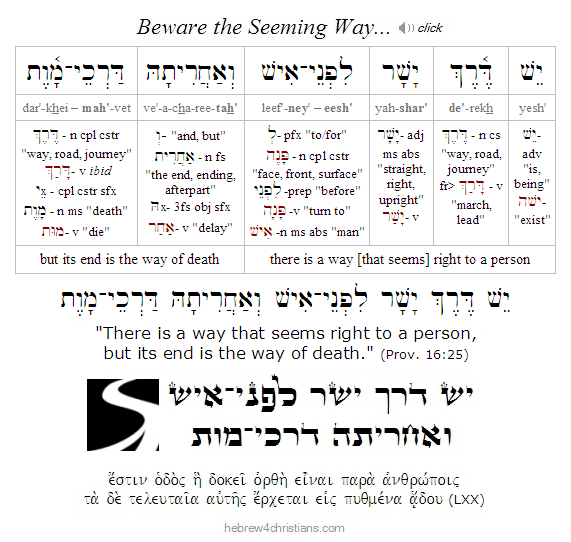 |
The Torah of Balaam...

06.22.21 (Tammuz 12, 5781) In our Torah portion this week (i.e., Balak), we read how Balaam intended to curse the Israelites, but God "took hold of his tongue" and made him bless the people instead... It is encouraging to realize that despite the repeated failures of the Israelites in the desert, the LORD never let go of his people... Indeed, as the story of Balaam reveals, if a spiritual enemy should secretly arise to curse Israel, God would take the sorcerer "by the tongue" to evoke God's blessing instead (Deut. 23:4-5). As Balaam himself later confessed: "there is no sorcery (i.e., nachash: נחש) against Jacob; there is no divination (i.e, kesem: קסם) against Israel" (Num. 23:23). Unlike scheming Balaam, who was willing to say whatever people wanted to gain temporal reward, God is "not a man that he should lie, nor a son of man, that he should change his mind" (Num. 23:19, 1 Sam. 15:29). Whatever the LORD has promised he will invincibly perform: His word is full of integrity and truth: "The grass withers, the flower fades, but the word of our God will stand forever" (Isa. 40:8). Amen. The God of Israel is forever faithful in his love, and no one can overrule his desire (Num. 23:20; Rom. 11:29; Isa. 40:13). You can trust in your promised future, friend. As it is written: "No weapon fashioned against you shall succeed, and you shall refute every tongue that rises against you in judgment. This is the heritage of the servants of the LORD (זאת נחלת עבדי יהוה) and their vindication from me, declares the LORD" (Isa. 54:17).
Hebrew Lesson:
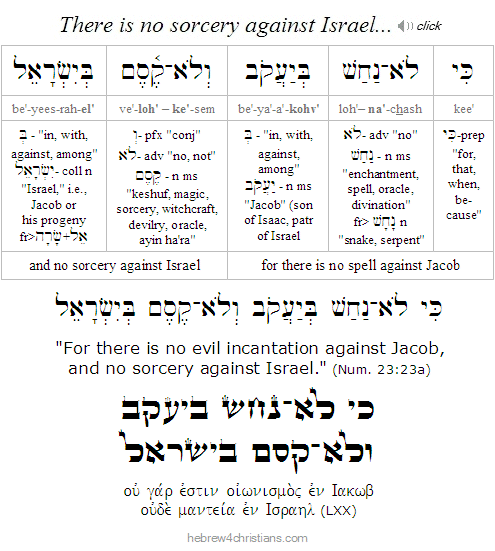 |
Relying on God Alone...
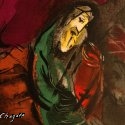
06.21.21 (Tammuz 11, 5781) "We we were so utterly burdened beyond our strength that we despaired of life itself, yes, we felt that we had received the sentence of death; but that was to make us rely not on ourselves, but on God who raises the dead" (2 Cor 1:8-9). This marks the end of carnal hope, when we realize we are but "dead men walking," and from this extremity of inner desperation and clarity we learn to rely solely on God for what we need. Here we abandon ourselves to God's care, despite the despair, darkness, and fear. We rely on "God who raises the dead," because all other remedies have been vanquished. It is a great gift to be so tested, for these "troubles of love" teach us to trust God alone for all we need. The only way out is through. We don't seek an easy way of life, but only that the LORD our God be with us throughout our troubles. May God do the miracle within us. Amen.
Hebrew Lesson:
Parashat Balak:
Overruling the Wicked
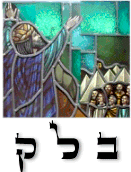
06.20.21 (Tammuz 10, 5781) Our Torah reading for this week is named after an ancient Moabite king entitled "Balak" (i.e., בָּלָק, "the destroyer") who sought to curse Israel by hiring the services of a wicked Midianite "prophet" named "Balaam" (i.e., בִּלְעָם, "one set above the people"). It begins this way: "And Balak the son of Zippor saw all that Israel had done to Amalek (e.g., אֱמרִי, the "big talkers") and grew fearful. King Balak's plan was to employ Balaam's sorcery (i.e., kashafut: כַּשָׁפוּת) against the Israelites to prevent them from entering the Promised Land. Similar to the delicious irony that befell the villain Haman in the Book of Esther, however, King Balak's scheme was upended, and the curse he sought to put on the Jewish people was repeatedly pronounced as a blessing by Balaam instead. After several foiled attempts, Balak fretfully dismissed the prophet, but before departing from the dejected king, Balaam ironically prophesied the destruction of the Moabites and the victorious establishment of Israel. Some peoples lives, it seems, are meant to serve as warning of the dangers of self-destruction.... The shameful story of Balaam reveals that "there is no enchantment against Jacob, no divination against Israel" (Num. 23:23). Ein od milvado (אֵין עוֹד מִלְבַדּו) - no weapon or scheme devised against God will ever prosper (Isa. 54:15-17).
But who was this mysterious prophet named Balaam? According to Jewish tradition, Jacob's wicked uncle Laban had a son named Beor (בְּעוֹר), who became the father of Balaam. In other words, the "cursing prophet" Balaam was none other than the grandson of Laban:
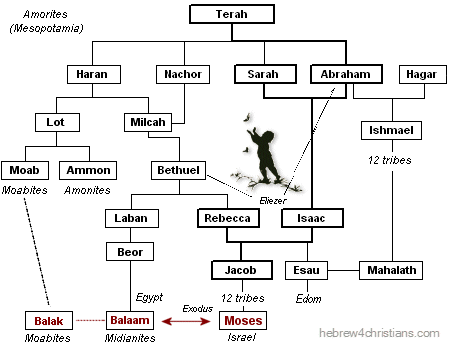 |
Note that the name "Beor" first appears in connection with a king of Edom (Gen. 36:32), which suggests that Balaam might have once been a king of the Edomites (i.e., the descendants of Esau). Further note the phonetic similarity to Peor. If Beor and Peor are the same, then Balaam was actually a prophet of Baal Peor, a local Semitic god.
Balaam was regarded as a great seer, magician and an adept in the occult. He had an "evil eye" and drew the spirit of demons to anything he gazed upon (Avot 5:22). His notoriety made him famous, and powerful people asked him to invoke curses on their enemies. The Talmud (Sanhedrin 106a) states that Balaam became so famous as a magician that he later became a chief advisor to Pharaoh. It was Balaam who advised the new Pharaoh to enslave the Israelites and to afflict them with brutal taskmasters (Exod. 1:8-11). For more information about the identity of Balaam, see the entry entitled, "The Curses of Balaam."
Beauty for Ashes...

[ The following entry concerns this week's Torah reading, parashat Chukat. Please read the Torah summary to "find your place" here. ]
06.18.21 (Tammuz 8, 5781) The ashes of the red heifer represented the death and sacrifice of something extremely rare, valuable, and precious. The ashes were mixed with "living water" (מַיִם חַיִּים) to reveal the truth that though the end of all flesh is but dust and ashes, the Spirit gives cleansing and life. Indeed the word ashes (אֵפֶר) may be rearranged to spell both cure (רַפֵא) and beauty (פְאֵר). The author of the book of Hebrews argues from the lesser to the greater: If the sprinkling of water mixed with the ashes of a red heifer purify the flesh from contamination with physical death, how much more does the blood of Messiah purify the soul from the deeds that cause spiritual death? (Heb. 9:13-14). Indeed, because of Yeshua's sacrifice we are given "beauty for ashes, the oil of joy for mourning, the garment of praise for the spirit of heaviness," that we may be called oaks of righteousness, the planting of the LORD, that He may be glorified (Isa. 61:3). Shabbat shalom friends...
Hebrew Lesson:
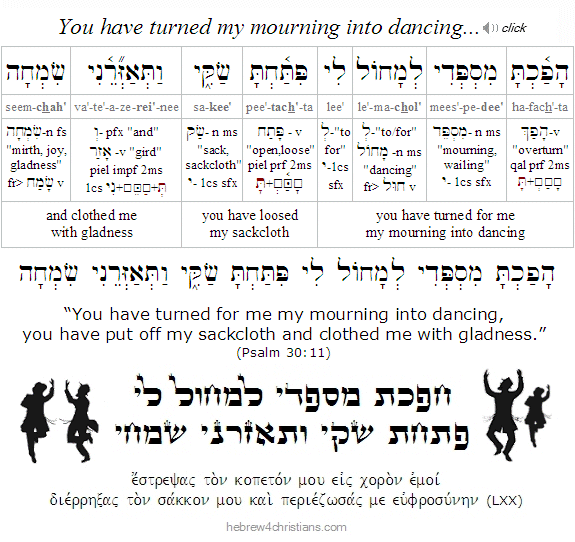 |
Kaddish and Comfort...
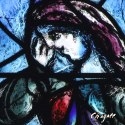
06.18.21 (Tammuz 8, 5781) "And he opened his mouth and taught them, saying... 'Blessed are those who mourn, for they shall be comforted' (Matt. 5:4). Mourning is the expression of care, the voice of pain, the sorrow of a broken heart. Those who mourn care deeply; they feel the weight of loss; they grieve over sin. Such sorrow expresses the longing to be released from inner sickness of evil, as Yeshua said: "from within, out of the heart of man, come evil thoughts..." (Mark 7:21). Our own evil desires convict us of the truth... Here there is no place left to hide, no rationalization, no vain hope for self-reformation - just the raw revelation of our fatal condition and the sincere appeal for God's mercy in Yeshua. Mourning over our sins draws us to God, to the Comforter (παράκλητος) who "comes alongside" to bind up the broken heart. The danger remains, however, for those who deny their sin and refuse to mourn, since they are made blind to God's forgiveness and comfort (John 9:41). How shall God be able in heaven to dry up your tears when you haven't wept?
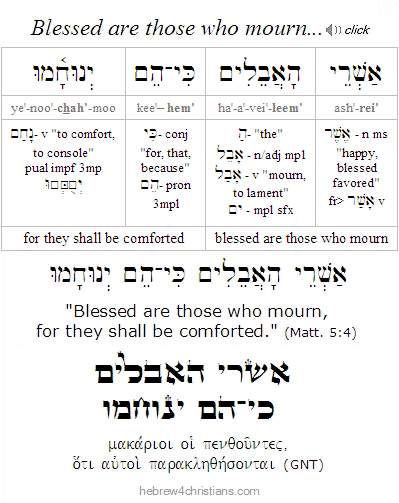 |
One of the great tests of our faith is "enduring ourselves" as we learn to love as God loves us... To do so, we must receive the miracle of Jesus... We must look beyond the realm of appearance, where the "outward man" perishes, to the realm of ultimate healing, where the "inward man" is finally liberated from the ravages of sin and death. This is comfort we have in affliction: God's promise revives our hearts to say, "I know that my Redeemer lives, and at the last he will stand upon the earth" (Job 19:25). Even in the "shadow of the valley of death" (i.e., this moribund and broken world), the LORD is with us and comforts us with His Presence (Psalm 23:4). We are given this great promise: "Just as we have borne the image of the man of dust, we shall also bear the image of the man of heaven" (1 Cor. 15:49).
Decision and Revelation...

06.18.21 (Tammuz 8, 5781) Every one of us is a teacher of sorts, proclaiming through our personal choices what we believe to be true. False teachers are those whose choices "teach" that there is no God, no eternal life, no meaning to life, and ultimately, no real hope... It cannot be any other way, for we all teach by our choices; we communicate by our assumptions of what we regard is of "ultimate concern." Postmodern philosophy never answered any of the haunting existential questions of life, such as: What is reality? Why is there something rather than nothing? What is the purpose of life? What happens when we die? Who am I? Do moral choices matter? and so on, but instead merely reinterpreted the hunger for meaning to be about power and control... Nonsense! People may evade the great questions of life by pretending they are unknowable, but Scripture attests that all people are created in God's image and are intuitively aware of God's reality and power: "For His invisible attributes, namely, his eternal power and divine nature, have been clearly perceived, ever since the creation of the world, in the things that have been made; so they are without excuse" (Rom. 1:20). We have a sacred duty to honor God's truth and that implies we bear a sacred animosity toward lies and false teaching. "Do not be deceived: associating with false teaching corrupts good character" (1 Cor. 15:33). We hate sin because it wounds and kills the soul. Think straight; awaken to the holiness of life; turn away from vain thoughts and lies; embrace the truth of God's salvation.
Hebrew Lesson:
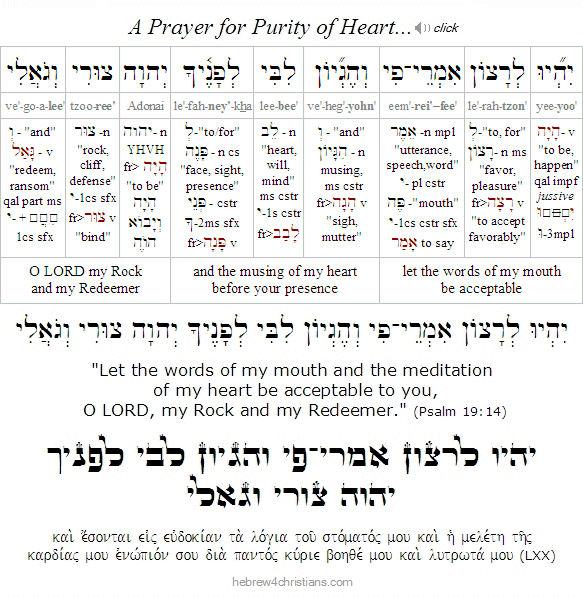 |
Every day we make decisions regarding good and evil, and therefore every day we are deciding (i.e., proclaiming, teaching, and attesting) our faith to others. The issue is not whether we love or whether we hate, but what we love and what we hate....
Followers of Yeshua must love the truth and abhor the lie. Tolerating sin in a world ripe for judgment is a tacit form of "collaboration" with the enemy... Indeed, the only thing regarded as intolerable in the devil's world is the objection that people have a supposed "liberty" to sin. But the LORD is clear on this point: those who call evil good and good evil are doomed. Therefore we are enjoined: "O you who love the LORD, hate evil" (Psalm 97:10). Yes, hate what is evil and love what is good (Amos 5:15). The connection between loving God and hating evil is repeated in the New Testament: "Let your love be genuine (ἀνυπόκριτος, without a "mask" put on): abhor what is evil; cling to what is good (Rom. 12:9). If we truly love the LORD, let us walk in the awe of His great Name by hating what is evil. "God's firm foundation stands, bearing this seal: "The Lord knows those who are his," and, "Let everyone who names the name of the Lord depart from iniquity" (2 Tim. 2:19).
Our Duty to Truth...
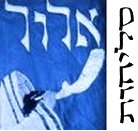
06.18.21 (Tammuz 8, 5781) As followers of the God of Truth (אלוהי האמת), we are responsible to "do truth" (עשה את האמת) and to reject what is false (1 John 4:6). As Yeshua said, "For this purpose I was born and for this purpose I have come into the world -- to testify to the truth. Everyone who is of the truth listens to my voice" (John 18:37). This means that we have a moral and spiritual duty to think clearly and not to abuse our minds (Phil. 4:8; Rom. 12:2). The LORD will help us to do this, as Yeshua said: "I will ask the Father, and he will give you a Helper (παράκλητος, someone "called to one's side"), to be with you forever, even the Spirit of Truth (i.e., ruach ha'emet: רוח האמת), whom the world cannot receive, because it neither sees him nor knows him" (John 14:16-17). The Spirit of Truth helps us "discern what is the will of God, what is good, acceptable, and perfect" (Rom. 12:2) and empowers us to take "every thought captive" to the reality of God's Presence (2 Cor. 10:4-5). Truth is connected to memory - both in our personal histories as well as the history of God's redemptive actions performed on our behalf. Truth is described as "a-letheia" (ἀλήθεια), literally meaning "not forgetfulness..." Hence we are constantly commanded to remember what God has done for us and to "diligently repeat" (ושׁננתם לבניך) the truth to our children (Deut. 6:4-9). Similarly, the Spirit of Truth brings to remembrance the words of Yeshua to our hearts (John 14:26).
Followers of Yeshua are commanded to love the truth (אוהב את האמת) and to think clearly about their faith. The ministry of reconciliation (τὴν διακονίαν τῆς καταλλαγῆς) is defined as "the word of truth, by the power of God, through weapons of righteousness" (2 Cor. 5:18, 6:7). Indeed, the word of truth (τὸν λόγον τῆς ἀληθείας) is a synonym for the "gospel of salvation" itself (Eph. 1:13; Col. 1:5; James 1:18). We are saved by Yeshua, who is the "way, the truth, and the life" (John 14:6). God commands all people to believe this truth (Acts 17:30-31; 1 Tim. 2:4). People perish because "they refuse to love the truth and so be saved" (2 Thess. 2:10-12). Therefore we see that the issue of truth is central to salvation itself....
Genuine teshuvah (repentance) implies that we will change our thinking in order to be transformed by God's truth. The follower of Messiah "cannot do anything against the truth, but only for the truth" (2 Cor. 13:8). During this Season of Teshuvah, may God help us all to think clearly and to turn our thoughts to Him. May He protect us from the vanity of a darkened mind and from all distractions that attempt to seduce us away from Him. May the LORD give us the purity of heart to know and do His will in the truth. Amen.
Hebrew Lesson:
The Scarlet Thread (תְּחַטְּאֵנִי בְאֵזוֹב)
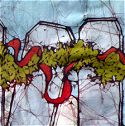
[ The following concerns this week's Torah reading, parashat Chukat (i.e., Num. 19:1-22:1). ]
06.17.21 (Tammuz 7, 5781) This week we are reviewing the significance of the "Red Heifer" sacrifice. Recall that the Red Heifer was a completely red cow that was entirely burned on the altar - its hide, internal organs, and blood - and its ashes were then mixed with living water to create "waters of separation" that were used to cleanse from contact with death (Num. 19:1-10). In this connection it is noteworthy that three elements used for purification (cedarwood, hyssop, and scarlet thread) were used not only for ritual cleansing from contact with death and tza'arat (Lev. 14), but were also used during the ratification of the covenant at Mount Sinai (see Exod. 24:8; Heb. 9:19-20) and indeed during the crucifixion of our Lord Yeshua. Recall that "hyssop" (אֵזוֹב) is first mentioned regarding the application of the blood of the lamb upon the doorposts during the Passover (Exod. 12:22), and that King David later appealed to God for cleansing saying, "purge me with hyssop, and I shall be clean" (Psalm 51:7). A hyssop branch was also used to offer vinegar to Messiah during the time of his crucifixion (John 19:29). Likewise the wood from a cedar tree (עֵץ אֶרֶז) is likely the type of wood used for the cross of Messiah. Finally, scarlet (שָׁנִי) thread symbolizes both blood and royalty, and appears in the birth of Judah's children Zerach and Peretz (Gen. 38:28), in the coverings of the Mishkan (i.e., Tabernacle), as a sign of Rahab's faith (Josh 2:8,21), and as the color of the robe of Messiah during his crucifixion (Matt. 27:28). There are lots of connections to be found as we study Torah and Ha'Brit Ha'Chadashah, chaverim!
Hebrew Lesson:
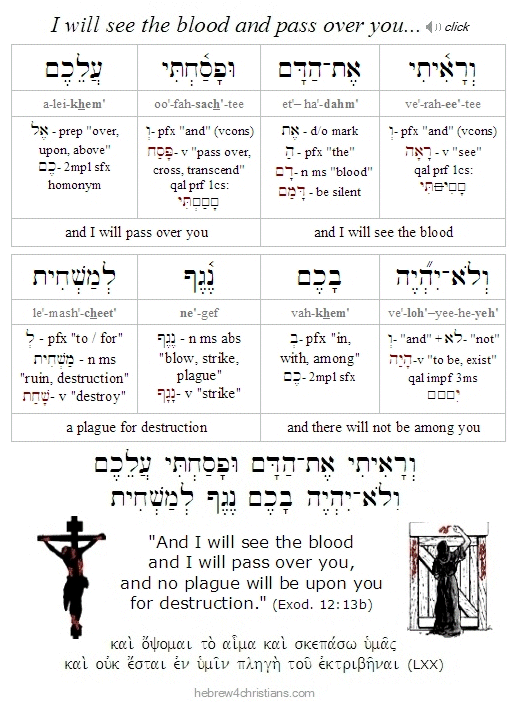 |
Paradox and Faith (פרדוקס ואמונה)
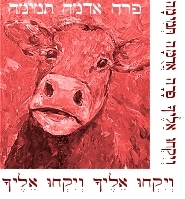
[ The following concerns this week's Torah reading, parashat Chukat (i.e., Num. 19:1-22:1). ]
06.17.21 (Tammuz 7, 5781) Our Torah portion this week (i.e., Chukat) describes the sacrifice of parah adumah (פרה אדומה), or the "Red Heifer" (see Num. 19:1-10). The Red Heifer is considered paradoxical to most Jewish thinkers, since the one who offers this sacrifice becomes ritually impure, while the sprinkling of the ashes from it makes people clean... The ritual is considered chok (חק) within Jewish tradition, meaning that it makes no rational sense. The Talmud states that of all the 613 commandments given in the Torah, even King Solomon with all his wisdom could not fathom this decree. However, the sacrifice of Yeshua the Messiah can be understood as the fulfillment of the symbolism of the Red Heifer: Both were entirely rare and without defect (sin); both were sacrificed "outside the camp"; both made the one who offered the sacrifice unclean but made the one who was sprinkled by it clean; and finally, both sacrifices cleanse people for priestly service.
The Red Heifer had to be a perfect specimen (temimah) that was completely red, "without blemish, in which there is no defect (mum)." The rabbis interpreted "without blemish" as referring to the color, that is, without having so much as a single white or black hair. This is the only sacrifice in the Torah where the color of the animal is explicitly required. Moreover, the Red Heifer was never to have had a yoke upon it, meaning that it must never have been used for any profane purposes.
Unlike all other sacrifices offered at the altar, the red heifer was taken outside the camp and there slaughtered before the priest, who then took some of its blood and sprinkled it seven times before the Mishkan (thereby designating it as a purification offering). [During the Second Temple period, the High Priest performed this ceremony facing the Temple while atop the Mount of Olives.] Then the red heifer would be burned in its entirety: its hide, flesh, blood, and even dung were to be burned (unlike other Levitical korbanot). Do not miss this: unlike all other animal sacrifices, all the blood of the offering was to be burned in the fire.
Hyssop, scarlet yarn, and a cedar stick would then be thrown upon the burning Red Heifer (these same items were used to cleanse from tzara'at, skin disease). In other words, the blood was assimilated into the ashes of the sacrifice, which were then gathered and mixed with water to create the "water of separation" (mei niddah) for the Israelite community. Note that the word "separation" (niddah) refers to menstrual impurity and hearkens to Zech. 13:1: "On that day there shall be a fountain opened for the house of David and the inhabitants of Jerusalem, to cleanse them from sin and from niddah."
Anyone (or anything) that came into contact with a corpse (the embodiment of sin and death) was required to be purified from tumah by means of the mei niddah. The purification procedure took seven days, using stalks of hyssop dipped into the water and shaken over the ritually defiled person on the third day and then again on the seventh day. After the second sprinkling, the person undergoing the purification process would be immersed in a mikvah (pool of running water) and then be unclean until the following evening.
According to Jewish tradition, the red heifer sacrifice was to atone for the sin of the Golden Calf, though the Torah itself does not make this association. The LORD Yeshua, our High Priest of the New Covenant, is the perfect fulfillment of the Red Heifer, since he was completely without sin or defect (2 Cor 5:21; John 8:46); he was sacrificed outside the camp (Heb 13:13); he made himself sin for us (2 Cor 5:21); his sprinkling makes us clean (1 Pet 1:2; Heb 12:24; Rev 1:5); and the "water of separation" that his sacrifice created is the means by which we are made clean from the impurity of sin (Eph 5:25-6; Heb 10:22).
As mentioned above, Torah commandments (mitzvot) that defy reason are called "chok" (חק). The Jewish sages tend to focus on the Red Heifer as the "mother of all mystery mitzvas," but surely we must go back to the Akedah - that is, to the sacrifice of Isaac at the hand of his father Abraham - as the greatest of God's decrees that defy human reason. The willingness of both Abraham and Isaac to obey - despite their inability to understand - was a direct result of their unwavering faith in God's love and promises. Likewise the heart of our faith says simply: "Jesus saves." His sacrifice saves us from sin and death, yet this also is "chok" - a matter of faith... We may seek logical reasons or explanations, but ultimately it is a matter of divine mystery, just as the darkness covered the earth while the Savior suffered for us on the cross at Calvary (Mark 15:22). "Jesus saves" is the mystery of our confession (Rom. 10:9-10). We are cleansed by our contact with sin and death through him, just as he bears our sin and defilement on our behalf. as it is written: "God made the One who did not know sin to be sin for us, so that in him we would become the righteousness of God" (2 Cor. 5:21).
"But when Messiah appeared as a High Priest (כּהֵן גָּדוֹל) of the good things that have come, then through the greater and more perfect tent (not made with hands, that is, not of this creation) he alone entered once for all into the Holy Places, not by means of the blood of goats and calves but by means of his own blood, thus securing an eternal redemption (גְּאוּלַּת עוֹלָם). For if the blood of goats and bulls, and the sprinkling of defiled persons with the ashes of a heifer (אֵפֶר הַפָּרָה), sanctify for the purification of the flesh, how much more will the blood of Messiah (דַּם הַמָּשִׁיחַ), who through the eternal Spirit (בְּרוּחַ עוֹלָם) offered himself without blemish to God, purify our conscience from dead works to serve the living God (אֱלהִים חַיִּים)?" – Heb. 9:11-14
The Torah of the new covenant is inner, deeper, and eternal, whereas the Torah of the older covenant is outer, limited, and subject to obsolescence (Heb. 7:12; 8:13). The older covenant foretold of the coming Substance by means of the "ashes that purify the impure yet make the pure, impure." Only after we have been "sprinkled with the ashes" are we made clean from death; only when we make contact with the "ashes of Yeshua" offered on our behalf are we cleansed from sin and death (1 Pet. 1:2; Heb. 10:22).
Hebrew Lesson:
Our Great Need to Forgive...

06.17.21 (Tammuz 7, 5781) In the Gates of Repentance it is written: "I hereby forgive all who have hurt me, all who have wronged me, whether deliberately or inadvertently, whether by word or by deed. May no one be punished on my account. And as I forgive and pardon those who have wronged me, may those whom I have harmed forgive me, whether I acted deliberately or inadvertently, whether by word or by deed." Amen...
Yeshua taught us to pray "forgive us as we forgive others," which implies that our forgiveness (of others) is the measure of our own forgiveness. In other words, as we forgive others, so we experience forgiveness ourselves... Forgiveness releases the hurt, the anger, and the disappointment so these feelings do not inwardly consume and exhaust our souls. And yet forgiveness must be self-directed, too, since refusing to forgive yourself denies or negates the forgiveness given from others. Forgiving yourself means admitting that you act just like other people, that you are human, and that you are in need of reconciliation too. We have to move on, past the shame, and to turn back to hope. As a Yiddish proverb puts it, "You are what you are, not what you were..."
It is written, "in many things we offend all," and therefore we must confess our sins one to another to find healing (James 5:16). However the practice of love overlooks a multitude of sins, and if we do not condemn those who offend us, then we will not need to forgive them for their offenses. Walking in God's love sets us free from the slavery of negative emotions such as resentment, bitterness, anger, unresolved grief, and so on.
I love this affirmation and prayer attributed to Eusebius of Caesarea (c. 263-339 AD): "May I be the friend of that which is eternal and abides. May I never quarrel with those nearest me; and if I do, may we be reconciled quickly. May I never devise evil against anyone; and if any devise evil against me, may I escape uninjured and without any desire to hurt them. May I love, seek, and attain only that which is good. May I wish for the happiness of all and the misery of none. May I never rejoice in the ill-fortune of one who has wronged me. When I have done or said what is wrong, may I never wait for the rebuke of others, but always rebuke myself until I make amends."
"May I, to the extent of my ability, give all needful help to my friends and to all who are in want. May I never fail a friend in danger. When visiting those in grief, may I be able by gentle and healing words to soften their pain. May I respect myself. May I always keep tame that which rages within me. May I accustom myself to be gentle, and never be angry with people because of circumstances. May I never discuss who is wicked and what wicked things he has done, but know good men and follow their footsteps." Amen.
Hebrew Lesson:
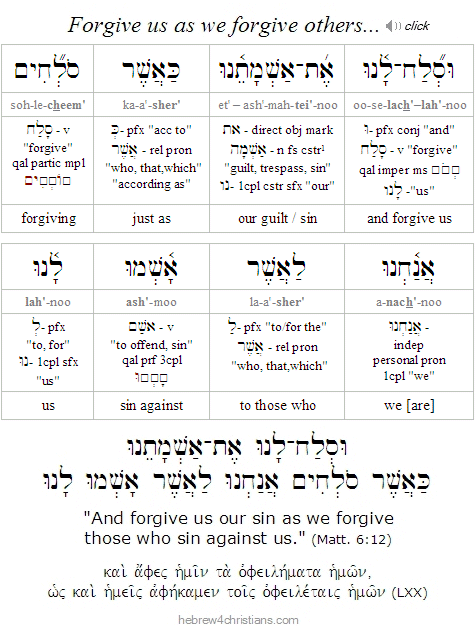 |
Believing to Understand...
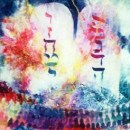
[ The following is related to our Torah reading for this week, parashat Chukat... ]
06.16.21 (Tammuz 6, 5781) The commandments of God are usually divided between the rational laws (i.e., mishpatim) and the divine decrees (i.e., chukkim), though this distinction is somewhat artificial, since all of the commandments of Torah (and that includes the Torah of the New Covenant) are grounded in the mystery of God's will, which is to say that we are to obey them simply because they derive from the Divine Authority itself... When the people gathered before Moses to receive the covenant at Mount Sinai, they said all the LORD has spoken "we will do and we will hear" (na'aseh ve'nishmah: נַעֲשֶׂה וְנִשְׁמָע). Note the order: first comes faith in God expressed in the decision to act (na'aseh), and then comes understanding (ve'nishmah). As Yeshua said, "If anyone's will is to do God's will, he will understand" (John 7:17). The heart of faith is willing to do what God asks before hearing (or understanding) what is required. Many people operate the other way round, sitting in judgment of God's word, demanding to understand why they should obey. You cannot understand apart from faith, however, and that is categorically true of all forms of knowledge, which is usually defined as "justified true belief." We are to be "doers of the word and not hearers only, deceiving ourselves" (James 1:22). The Greek verb used in this verse is emphatic: "Be doers!" (γίνεσθε) means "be born!" "Come alive!" "Do, live, and exist before God!" This is a call to creative action, to newness of life...
Hebrew Lesson:
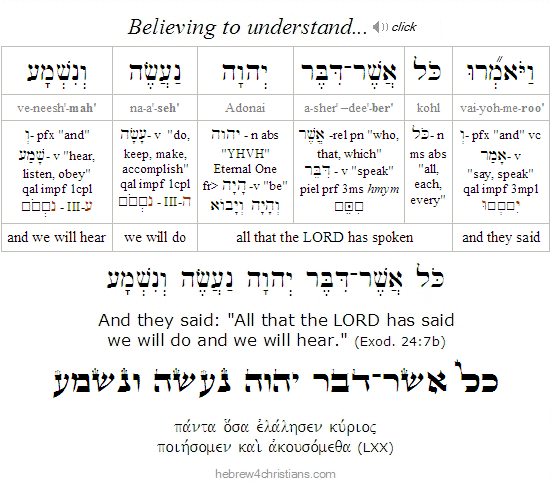 |
The Scriptures state that "if anyone is a hearer of the word and not a doer, he is like a man who looks intently at his natural face in a mirror. For he looks at himself and goes away and at once forgets what he was like" (James 1:23-24). If we just hear the truth but do not act upon it, we are comically likened to someone who carefully looks at his face in a mirror but then promptly forgets what he looks like after he steps away... Likewise those who only hear the word but do not "bring it to life" in their deeds forget who they are and why they were created (Eph. 2:10; Titus 2:14; Col. 1:10). When we look into the mirror of truth we see our need for teshuvah and turn to God for the healing miracle he provides (Heb. 4:12). It's not about doing but being, though being is revealed in doing... If your actions do not align with your values, then back up and recover who you really are in Messiah, understand what your new nature truly is. That is what it means to "take up the yoke" of Messiah, for his yoke is easy (kal) and burden is light, and the task is to repeatedly practice allowing Him to carry your pain, shame, and sin far, far away from your heart.
There is a deeper law, however, a "mirror" that reveals something beyond our passing image. When we look intently into the "perfect law of liberty" (תּוֹרַת הַחֵרוּת וּמַחֲזִיק) - the law of faith, hope, and love for our Savior - we find blessing in our deeds (James 1:25). Note that the verb translated "look into" the law of liberty is the same used when John stooped down to "look inside" the empty tomb of Yeshua (John 20:5). The deeper law reveals the resurrection power of God's invincible love. The Torah of the New Covenant also has many mitzvot, though these are based on the love God gives to us in Yeshua: "This is my Torah: that you love one another as I have loved you" (John 13:34).
Two Kinds of Fear...

06.16.21 (Tammuz 6, 5781) King Solomon wrote, "The fear of the LORD adds days [to life], but the years of the wicked will be cut short" (Prov. 10:27). The sages have said that these "added days" of life include the appointed times and seasons (i.e., the moedim) when the veil of "everydayness" is lifted and we can glimpse the sacred. Living in dissonance with God's will yields days that are shortened - by vanity, by dissipation, and by despair. And what good are length of days when they are filled with emptiness and illusion? As Solomon also concluded in his great scroll of Kohelet, fearing God and keeping his commandments is the "end of the matter" (סוֹף דָּבָר) and the "whole duty" of our lives (Eccl. 12:13).
Hebrew Lesson:
"The fear (anxiety) of man (חֶרְדַּת אָדָם) sets a snare, but whoever trusts in the LORD will be made safe" (Prov. 29:25). The fear that mankind engineers is a trap intended to shorten life, but the fear of the LORD (yirat Adonai) is life-giving and healing. Every day God makes miracles for people of which they are unaware. God didn't create the universe and then remove Himself from its care: Yeshua sustains all things by the Word of His power and in Him all things "subsist" - τὰ πάντα ἐν αὐτῷ συνέστηκεν (Col. 1:17). Living in the light of God's Presence reveals the daily bread that comes from Heaven, but those who refuse the truth find no lasting sustenance for the world to come... We all must believe that God is making miracles for us to live and grow in this age; otherwise we are not living in faith.
Hebrew Lesson:
Suffering and Hope...

06.15.21 (Tammuz 5, 5781) Reflecting on the role of suffering in the heart of faith, Dietrich Bonhoeffer once wrote: "Here is the decisive difference between Christianity and all religions. Man's religiosity makes him look in his distress to the power of God in the world: God is the deus ex machina [i.e., "quick fix"]. The Bible [on the other hand] directs man to God's powerlessness and suffering: only a suffering God can help" (Letters and Papers from Prison). Bonhoeffer's comment alludes to the difference between an "Elohim" (אֱלהִים) conception of God as the omnipotent power and Judge of reality, and the "YHVH" (יהוה) conception of God as the compassion Source and Breath of life - the Suffering God who empties himself to partake of our condition - to know our pain, to bear our sorrows, to heal us from the sickness of spiritual death, and to touch us in the loneliness of our exile... The Spirit enables us to "groan" in compassion, directing us away from the impulse to "kill the pain" to accept it as part of our lament and need for connection with God.
Hebrew Lesson:
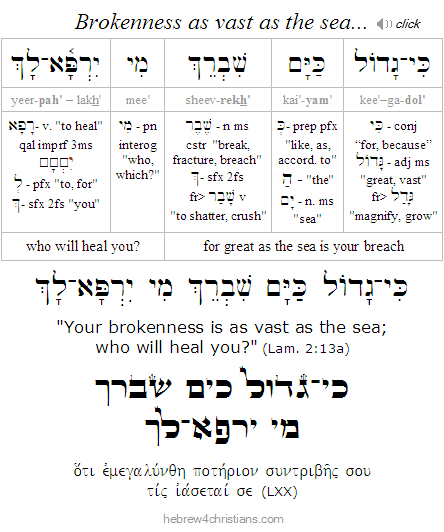 |
Unlike cognitive faith (i.e., emunah: אֱמוּנָה) that assents to theological propositions or creeds, trust (i.e., bittachon: בִּטָחוֹן) emotionally commits to God's presence in the sorrows of our lives and retains hope that we are not finally alone, abandoned, helpless... Trust goes beyond the "idolatries of theology," that is, various theological conceptions of God as impassive, inexpressive, and distant in his decrees of transcendence, to engage God personally, existentially, and from within the whirlwind of harrowing pain and pain's great loneliness. Authentic theology is dialectical or "dialogical" -- a conversation of the heart with God - seeking, yearning, protesting, lamenting, and struggling with life's inscrutabilities and unfathomable questions as it appeals to God for the assurance of genuine hope. Trust finds courage to give voice to our sorrow and fears, inviting God into the midst of our brokenness, often yielding to tearful silence in unknowing expectation. As Dorothy Soelle wrote: "Prayer is an all-encompassing act by which people transcend the mute God of an apathetically endured reality and go over to the speaking God of a reality experience with feeling in pain and happiness" (Soelle: Suffering). This is perhaps the deepest meaning of the Shema - to listen for God's heart in the midst of your struggle; it is learning to encounter God's compassion in the place of your brokenness and need.
"Unto thee O Lord, do I lift up my soul" (Psalm 25:1). Before we can lift up our soul as an offering before the LORD in sacrifice, that is, yielding to his will, surrendering our desires, our hopes, yea, our very lives to him, we must first be broken and confess our heart's unwillingness to let go of its pain, its mistrust, and its cowardly evasion of suffering...
Hebrew Lesson:
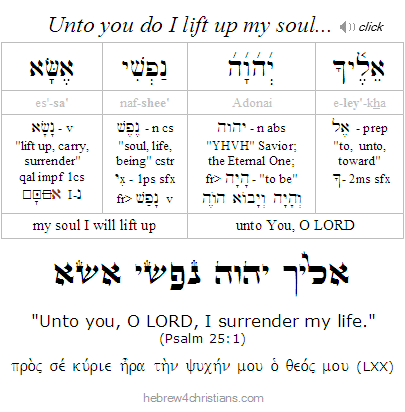 |
When I feel hopeless, I seek hope; when in pain, I seek comfort; when in despair over besetting sins, I yearn again for a place I can call home... In the midst of these things, my heart wonders whether my suffering has come because I deserve it or somehow "need" it. I reason that it may make sense that God extends special care for his godly ones, for those who are righteous and who seem free from the vexation of despair, but does it make sense for me, one who is undone, broken, alone, and unworthy? My heart protests that this is not the whole story of my life, and that more to be said. I need God and I know that he cares for me. I recall his promises to heal, to bind up the broken of heart, and extend his comfort for our afflictions. Might pain herald the advent of something new to come? Might there be a deeper beauty and surpassing grace going "through the wound" instead of objecting to it?
"In time of trouble say: "First, He brought me here. It is by His will I am in this straight place; in that I will rest. Next, He will keep me here in His love, and give me grace to behave as His child. Then, He will make the trial a blessing, teaching me the lessons He intends me to learn, and working in me the grace He means to bestow. Last, In His good time He can bring me out again – how and when He knows. [Therefore] let me say I am here, (1) by God's appointment; (2) in his keeping; (3) under His training; and (4) for His time." (Andrew Murray)
Deep within I discover that I can bless the Lord, losing sight of myself as I affirm my deepest purpose and heritage: "My (boundary) lines have fallen to me in pleasant places; indeed, my inheritance is beautiful to me" (Psalm 16:6). Though I might have felt bereft and even tempted to curse my estate, by God's grace I am made able to give thanks and to bless, even in the midst of my troubles and pain: "I will bless the LORD who has counseled me; my conscience disciplines me in the night" (Psalm 16:7). Therefore שִׁוִּיתִי יְהוָה לְנֶגְדִּי תָמִיד - "I have set the Lord always before me" – especially in desperate moments when I can barely endure – since I have learned that "because he is at my right hand, I shall not come undone" (Psalm 16:8). God gives me strength to renew my hope: therefore "my heart is made glad, my whole being rejoices, and my body rests in trust" (Psalm 16:9).
Hebrew Lesson:
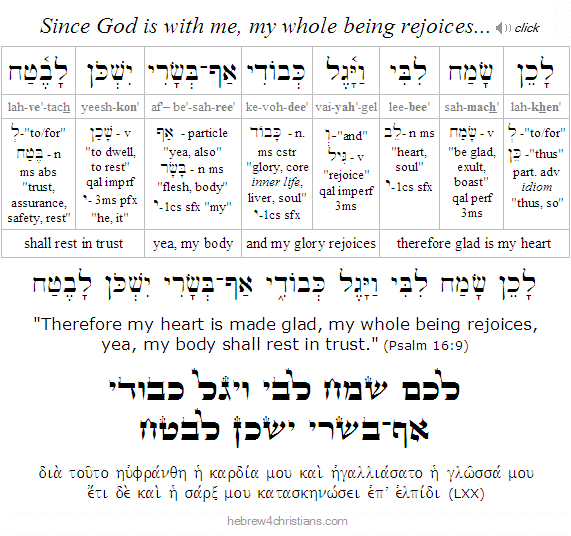 |
Suffering and hope, the two go together... Separate one from the other and you become unbalanced and double-minded (i.e., δίψυχος, "two-souled"). Those who turn away from hope in their suffering fall into despair; those who hope to turn away from suffering enter into delusion. The message of suffering presents both the call to hope and offers us comfort. Only the One who suffers "with us" (עִמָּנוּ אֵל), who clothes himself with our sorrows, our infirmities, and who understands the cry of our hearts can help truly help us. "If I must boast, I will boast about the things that show my weakness; for God has said: "My grace is enough for you, for my power is made perfect in weakness." So then, I will boast most gladly about my weaknesses, so that the power of Messiah may reside in me" (2 Cor. 11:30, 12:9).
Blessing for Darkness...
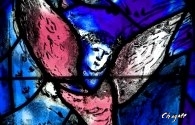
06.15.21 (Tammuz 5, 5781) "If I say, surely darkness covers me ... the night shines as the day; nothing hides from your radiance" (Psalm 139:11-12). We have to trust that God is in our darkness, in the silence, in the unknown... You come out of the shadows when you admit that you act just like other people, that you are human, in need of reconciliation yourself... Above all you need God. You need help. You need a miracle to help you to truly love. You may find excuses for many things, but you cannot escape the "wretched man that I am" reality that is grounded in your fears. God sees in the darkness and is present there, too. When you feel alone, like an unbridgeable gulf lay between you and all that is good; when you feel like you want to scream but are afraid that even then no one would hear, may the LORD shine His light upon you...
Hebrew Lesson:
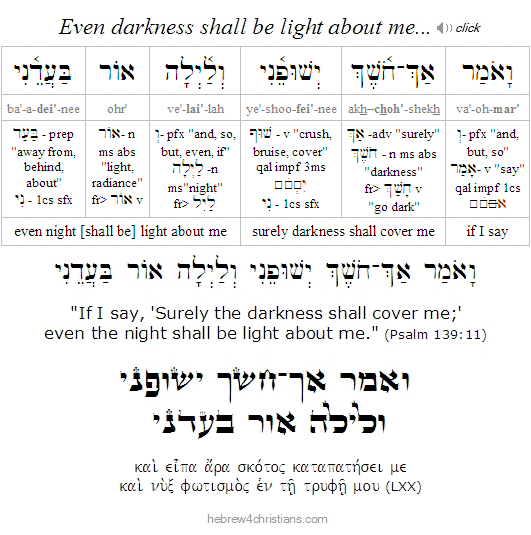 |
"For it is you who light my lamp; the LORD my God outshines my darkness" (Psalm 18:28). There is "depression," and there is the dark night of the soul, and these are different matters, though they may overlap... "Hope deferred makes the heart sick." The dark night of the soul is an experience of trusting God in the darkness yet has a spiritual direction and end. From strength to strength, chaverim. We walk through this darkness with God and learn from him even there....
Note: I hesitate to share this here, but I have been pretty sick the last few days, feeling pretty exhausted. Please remember me in your prayers, friends. Thank you!
Cleansing from Death...
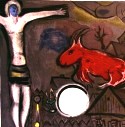
[ The following entry concerns this week's Torah reading, parashat Chukat, though the mysterious themes of purity and impurity are first described in parashat Tzav... ]
06.15.21 (Tammuz 5, 5781) Contact with the dead causes spiritual impurity (i.e., tumah) because death, as the separation from life, is the ultimate expression and consequence of sin. People routinely deny the meaning of death, explaining it away as the result of some cause from which one might escape ("he worked too hard," "she got sick," "it was an accident," etc.). People rationalize death because they refuse to see it as the effect of sin, the consequence of the original transgression of Adam and Eve that humanity as a whole has "inherited" (Gen. 2:17; 3:19; Rom. 5:12). Therefore the Torah states that the birth of a child results in impurity (Lev. 12:2,7). Full atonement comes from "digging up the root of sin" by being purified from its source, namely, the curse of death itself. The Red Heifer alludes to the sin of the Golden Calf, which finds its source in the original idolatry of Adam and Eve. Even the blood of the sacrifice was burned to ash "outside the camp," putting a complete end to the "life of death" and its power to corrupt. The Red Heifer is therefore a special sort of "sin offering" (chatat) that cleanses from contact with death itself (Num. 19:9).
 |
The "fall" of man implies that we have contact with death - both inwardly and outwardly. The sacrifice of Yeshua as our "Red Heifer" cleanses us from all tumah and lovingly makes us clean (tahor) before the Father. The "water and the blood" is part of the "olah sacrifice" of Yeshua for our redemption and purification before God offered at Calvary (John 19:34, 1 John 5:6). The water and blood flowing from His wounds are the means by which we are purified from sin and death... All this comes from the love (chesed) of God given in our Messiah and Savior. Just as the sacrifice of the Red Heifer cleansed from the effects of physical death, so the sacrifice of Yeshua cleanses us from the effects of spiritual death. For more on this subject, see the "Gospel of the Red Cow."
Hebrew Lesson:
Daily Dvar Podcast:
Choosing to Believe...

06.14.21 (Tammuz 4, 5781) Shalom chaverim. The Spirit of God cries out, "choose life that you may live!" (Deut. 30:19), which implies that is our responsibility to believe in the Reality of God, to trust in his providential care, to affirm that "all is well and all manner of thing shall be well," and to understand that our present struggle is designed by heaven to help us grow in grace and the knowledge of the truth (1 Pet. 3:16). In this "Daily Dvar" audio podcast, I discuss the challenge of faith and how we can draw closer to the Lord despite the ambiguity and challenges we regularly face. I hope you might find it helpful.
Podcast:
Saved from Death's Sting...
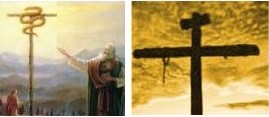
[ The following concerns this week's Torah reading, parashat Chukat... ]
06.14.21 (Tammuz 4, 5781) "Everyone who is bitten, when he looks upon it, shall live" (Num. 21:8). The fiery serpent – the very sting of which brings death – is what must be looked upon, confronted, and confessed. We must look at that which kills us, and by seeing it, we can then see God's miracle (נֵּס) that delivers us... Therefore we look to the cross – the place where Yeshua clothed himself with our sickness and sin – to realize God's remedy for our eternal healing. As Yeshua explained to Nicodemus, "As Moses lifted up the serpent in the wilderness, so must the Son of Man be lifted up, that whoever believes in him may have eternal life" (John 3:14-15). Humanity as a whole has been "bitten by the snake" and needs to be delivered from its lethal venom. Just as the image made in the likeness of the destroying snake was lifted up for Israel's healing, so the One made in the likeness of sinful flesh (Rom. 8:3) was to be lifted up as the Healer of the world. In Yeshua the miraculous exchange takes place: "For our sake he made him to be sin who knew no sin, so that in him we might become the righteousness of God" (2 Cor. 5:21). Bless His holy name!
Hebrew Lesson:
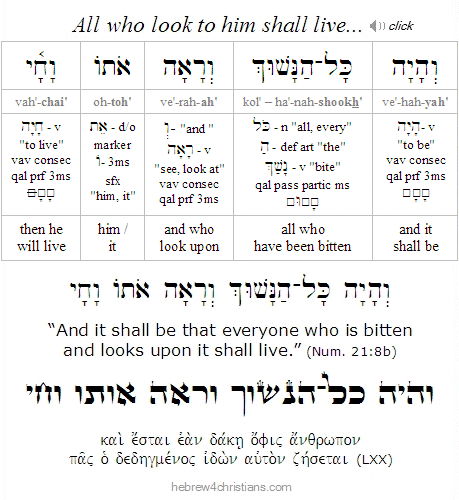 |
The serpent on the cross is the image of the serpent on the Tree of Life in the garden that was tempting Eve. It is fascinating that it was the same image nailed to the stake that represents the death of Messiah for our sins:
The Central Decree of Torah...
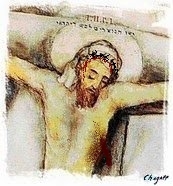
06.14.21 (Tammuz 4, 5781) Our Torah portion this week (i.e., parashat Chukat) begins with the words: zot chukat ha-Torah (זאת חקת התורה), "this is the decree of Torah" (Num. 19:2). The language here is both striking and unique, suggesting that what follows, namely, the sacrifice of the parah adumah or "red heifer," is nothing less than "the seminal decree" of the entire Torah... However if we think about the meaning of the mysterious decree of the red heifer, we will realize that its ashes were used to create the "waters of separation" (i.e., mei niddah: מֵי נִדָּה) to cleanse people from contact with death (i.e., separation). To fulfill God's vital decree, however, required sacrificial love, since the priest who offered this service would become defiled (separated) for the sake of the healing of others... The Hebrew word for love is ahavah (אַהֲבָה), from a root verb (יָהַב) that means "to give." Love means giving of yourself to benefit another person (John 15:13). The central decree of Torah, then, beyond our ability to rationally understand, is that God's love is so great that it is willing to become dust and ashes on our behalf so that we might find blessing and life.
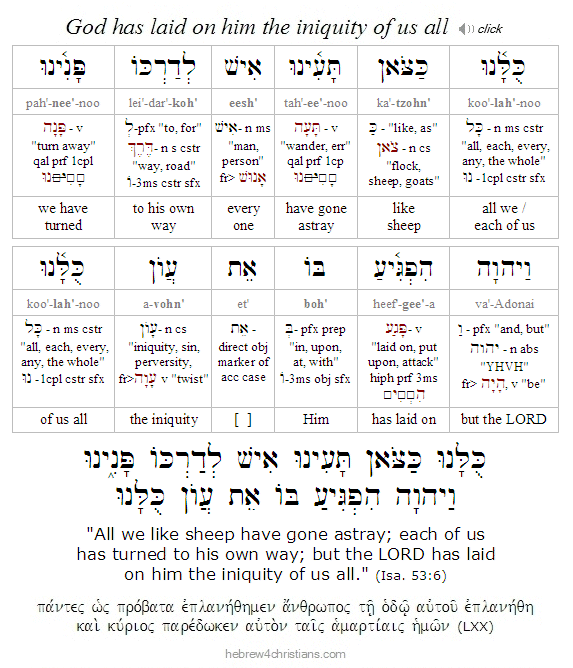 |
Yeshua willingly became unclean on our behalf - through contact with our sin and death - so that we could become clean (Isa. 53:3-6, 2 Cor. 5:21, Gal. 3:3, Eph. 5:2, Titus 2:14). The pure became impure through His sacrificial offering. Because of Him, we have been cleansed from our sins "by a better sprinkling" than that which the Tabernacle of Moses could afford (Matt. 26:28, Heb. 9:14, 12:24, Eph. 1:7, 1 Pet. 1:2,18-19, Rom. 5:9; Col. 1:14, 1 John 1:7, etc.).
The ashes of the red heifer represented the death and sacrifice of something extremely rare, valuable, and precious. The ashes were mixed with "living water" (מַיִם חַיִּים) to reveal the truth that though the end of all flesh is but dust and ashes, the Spirit gives cleansing and life. Indeed the word ashes (אֵפֶר) may be rearranged to spell both cure (רַפֵא) and beauty (פְאֵר). The author of the book of Hebrews argues kal va'chomer (i.e., קַל וְחמר, "light and weighty"), that is, "from the lesser case to the greater." If the sprinkling of water mixed with the ashes of a red heifer purified the flesh from contamination with physical death, how much more does the blood of Messiah purify the soul from that which causes spiritual death? (Heb. 9:13-14). Indeed, because of Yeshua's sacrifice we are given "beauty for ashes, the oil of joy for mourning, the garment of praise for the spirit of heaviness," that we may be called "trees of righteousness (אֵילֵי הַצֶּדֶק), the planting of the LORD, that He may be glorified" (Isa. 61:3). Amen. Yehi shem Adonai mevorakh!
 |
A Blessed Reverence...
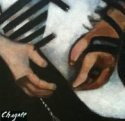
06.13.21 (Tammuz 3, 5781) The sages say the verse, "Blessed is the person who fears always" (Prov. 28:14), means that whenever you want to do something, you should first soberly consider the consequences... If you do not think clearly, you will not fear, and such carelessness invariably leads to sin. The sacred is bound up with care; it sets boundaries between the profane and the holy. The "fear of the LORD" is expressed as vigilance against the lusts of the lower nature (yetzer ha'ra)... We "tremble" before God when we are awake to His holiness and wonder (Phil. 2:12). The Temple was destroyed because of our forefathers did not think about their actions; they first exiled themselves from the Divine Presence and then they "caught up with" the pain of their exile for themselves.
אשׁרי אדם מפחד תמיד
ומקשׁה לבו יפול ברעה
ash·rei · a·dam · me·fa·cheid · ta·meed
oo·mak·sheh · lee·bo · yee·pol · be·ra·ah

"Blessed is the one who fears the LORD always,
but whoever hardens his heart will fall into calamity."
(Prov. 28:14)

Hebrew Lesson:
Parashat Chukat (חֻקַּת הַתּוֹרָה)...

06.13.21 (Tammuz 3, 5781) Our Torah portion this week (i.e., parashat Chukat) begins,with the words: zot chukat ha-Torah (זאת חֻקַּת הַתּוֹרָה), "this is the decree of Torah" (Num. 19:2). The language here is both striking and unique, suggesting that what follows, namely, the ritual of the parah adumah or "red heifer," is nothing less than "the seminal decree" of the entire Torah... If we think about the meaning of the mysterious decree of the red heifer, however, we will realize that its ashes were used to create the "waters of separation" (i.e., mei niddah: מֵי נִדָּה) to cleanse people from contact with death (i.e., separation). To fulfill God's vital decree, however, required sacrificial love, since the priest who offered this service would become defiled (separated) for the sake of the healing of others... The Hebrew word for love is ahavah (אַהֲבָה), from a root verb (יָהַב) that means "to give." Love means giving of yourself to benefit another person (John 15:13). The central decree of Torah, then, beyond our ability to rationally understand, is that God's love is so great that it is willing to become dust and ashes on our behalf so that we might find blessing and life. The traditional Jewish interpretation of the meaning of the Red Heifer is a shadow of the Substance in Messiah:
"The mitzvah of parah adamah (i.e., the red heifer) represents the suspension of logic in deference to the Divine Will. This attitude is not restricted to this mitzvah. Scripture introduces the mitzvah of the parah adamah with the words "this is the law of the Torah." Surrendering one's own reasoning and accepting the superior reasoning of Hashem is the law of the entire Torah... To the extent that we let go of our own will, we can understand the Divine will. Our ancestors at Sinai understood this ideal when they proclaimed, "we will do and then we will understand." Torah is not beyond our understanding, but we must be willing to make the sacrifices that true Torah understanding demands." (Abraham Twerski)
Yeshua willingly became unclean on our behalf - through contact with our sin and death - so that we could become clean (Isa. 53:4, 2 Cor. 5:21, Gal. 3:3, Eph. 5:2, Titus 2:14). The pure became impure through His sacrificial offering. Because of Him, we have been cleansed from our sins "by a better sprinkling" than that which the Tabernacle of Moses could afford (Matt. 26:28, Heb. 9:14, 12:24, Eph. 1:7, 1 Pet. 1:2,18-19, Rom. 5:9; Col. 1:14, 1 John 1:7, etc.).
Shavuah Tov Audio Broadcasts
In the "Shavuah Tov" audio broadcast for this week I discuss the content of the Torah portion (i.e., Chukat), and particularly consider: 1) the significance of the mysterious Red Heifer (פרה אדומה) sacrifice, 2) the gospel message of the nachash nachoshet (the "bronze serpent"), and 3) the sin of Moses... In last year's audio I go into some discussion regarding the meaning of the mitzvot (commandments) of the written Torah, including the subcategories of chukkim (decrees), mishpatim (rules or judgments), eidot (testimonials, holidays) with a discussion of the oral tradition's corresponding categories of halakhah (oral law) and its subcategories of gezeirot ("fences"), takkanot (case laws), and minhagim (customs). Throughout special attention is given to how Yeshua the Messiah is the Substance and Inner Meaning of all true Torah. It is best to listen to these broadcasts in order:
In connection with our Torah reading for this week, note that the Hebrew word "chok" means a "divine decree," related to a verb meaning "to engrave" (חָקַק). The sages say that the word is directed to a desire to do God's will that is "engraved" upon the heart rather than simply understood with the intellect (2 Cor. 3:3). Indeed the very first time "chok" (חוֹק) appears in the Torah concerns Abraham's obedience of faith as demonstrated by the sacrifice of his beloved son (Gen. 26:5), and the second time concerns the sacrifice of the Passover Lamb of God: "This day shall be for you a memorial day, and you shall keep it as a feast to the LORD; throughout your generations, as an eternal decree (חֻקַּת עוֹלָם), you shall keep it as a feast (Exod. 12:12-13). Because both the Akedah and the sacrifice of the Passover lamb reveal God's yeshuah, his salvation, we are to engrave the significance of our deliverance by the Lamb of God within our hearts forever... Amen, just as God Himself has so engraved us upon his own heart, it is written, "behold, I have engraved you on the palms of my hands" (הֵן עַל־כַּפַּיִם חַקּתִיךְ; Isa. 49:16). Shavuah Tov chaverim!
 |
The Inner Torah...

06.11.21 (Tammuz 1, 5781) Strictly speaking the content of the Ten Commandments, from a moral perspective, presented no new revelation, since sacred reality is intuitively understood within every created soul (Gen. 1:27; John 1:9; Acts 17:24-28). As it is written, "The wrath of God is revealed from heaven against all ungodliness and unrighteousness of men, who suppress (i.e., hold down: κατέχω) the truth by their unrighteousness, because that which can be known about God is evident within them, for God has revealed it to them" (Rom. 1:18-19). Where Paul says, "against all ungodliness" he refers to our universal duty before the Living God (בֵּין אָדָם לָמָקוֹם); and likewise "all unrighteousness," refers to our universal duty toward other people (בֵּין אָדָם לְחֲבֵרוֹ). The "invisible things of God are seen" so vividly that people are "without excuse" (ἀναπολόγητος) for their evasion and rejection of the Divine Presence, which constitutes a disposition of rebellion, treason, and desecration (Rom. 1:20). The deeper revelation given at Sinai, however, was not an elaborate lawcode but something else, namely, the solution for the problem of sin as prefigured in the Altar of the Tabernacle and the daily sacrifice of the lamb (i.e., korban tamid: קָרְבַּן תָּמִיד; Num. 28:1-8). "The people stood far off, while Moses drew near to the thick darkness where God was" (Exod. 20:21). The onlookers saw the outer, the imposing, the threatening, and this made them distant, but Moses entered the inner region and was given the vision of the altar (Exod. 25:9; John 5:46-47; Heb. 8:6). Likewise Yeshua did not come to be a moral teacher of the law but to bear the penalty of our lawlessness (2 Cor. 5:21; Gal. 3:13). Our Savior died upon the cross shrouded in complete darkness, yet entering the inner region reveals God's passion offered up for you (Luke 23:44-45).
Hebrew Lesson:
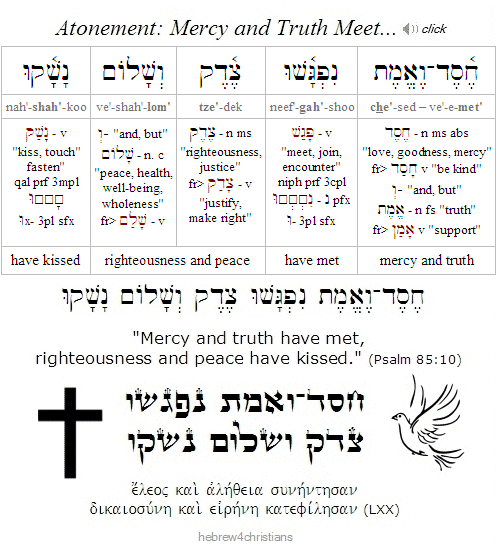 |
Keeping hope during exile...

[ Today is Rosh Chodesh, the start of the 4th month of the calendar. Chodesh Tov, chaverim. ]
06.11.21 (Tammuz 1, 5781) "Grass withers, a flower fades, but the word of our God will stand forever" (Isa. 40:8). This verse sets up a great contrast between olam ha-zeh and olam haba – between this present world and the heavenly realm. King David states, "Behold, you have made my days a few handbreadths, and my lifetime is as nothing before you (וְחֶלְדִּי כְאַיִן נֶגְדֶּךָ). Surely all mankind stands as a mere vanity" (Psalm 39:5). Our hearts are restless until they find their rest in God, the Eternal, the abiding, and true: "Whom have I in heaven but you? And there is nothing on earth that I desire besides you" (Psalm 73:25). To the extent that we regard this world as our "home" we will find the transience of life to be tragic; but when we regard ourselves as strangers here, merely passing through, our transience becomes a passageway to the heavenly places...
Hebrew Lesson:
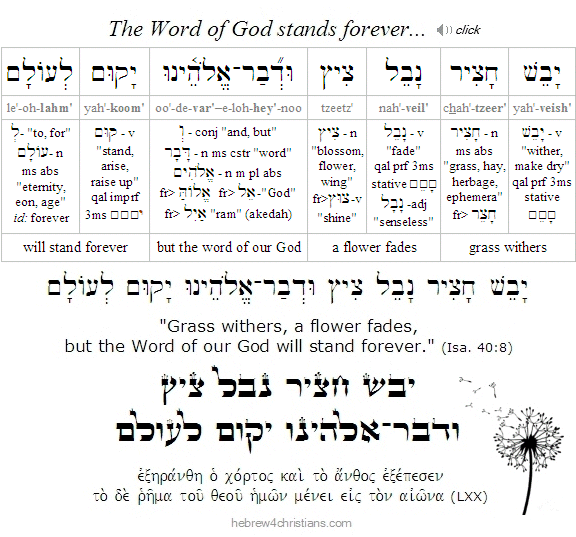 |
The carnal mind instinctively is afraid of change, since it implies death and dissolution, and therefore it reasons from a continuous state of dread (whether conscious or not). Hence the "besetting sin" of the flesh is to "absolutize" the moment and to otherwise regard the finite as an end in itself. But God is our "Rock," a metaphor that implies that He is the immovable foundation and cornerstone of all reality. The LORD is our strong refuge in the stormy changes we all face in this world; the Divine Presence both grounds us and sustains our way. Therefore the LORD is called El Ne'eman (אֵל נֶאֱמָן), "the faithful God." His very Name means certainty, reliability, strength, truth, reality, presence, being, life, and so on...
Whenever I read the news I am reminded that we are living in a "withered and fading world" -- nearing the prophesied "End of Days" (אַחֲרִית הַיָּמִים). But Baruch Hashem, our place (מָקוֹם) is grounded in truth that stands (i.e., יָקוּם, lit. "is raised up") forever! Yeshua is our life; he is the Word of our God that is raised up forever! So press on faith. Believing is seeing, not the other way around. "Keep yourselves in the love of God, waiting for the mercy of our Lord Yeshua the Messiah that leads to eternal life" (Jude 1:21).
"Providence is wonderfully intricate. Ah! You want always to see through Providence, do you not? You never will, I assure you. You have not eyes good enough. You want to see what good that affliction was to you; you must believe it. You want to see how it can bring good to the soul; you may be enabled in a little time; but you cannot see it now; you must believe it. Honor God by trusting Him." - Charles Spurgeon
Note: For more on this topic, see "Our Everlasting Consolation."
Life Worth Living...

06.11.21 (Tammuz 1, 5781) It is common to encounter people today who refuse to believe that God exists, not because there are compelling reasons to do so, but simply because they do not want God to exist, and therefore they willfully suppress the intuitions of logic, the apprehension of value, the awareness of glory in creation, and the sentiments of conscience, since all these experiences point to the realm of moral and spiritual reality. As it is stated in our Scriptures: "For that which may be known of God is manifest in them; for God has revealed it to them. For the invisible attributes of him from the creation of the world are clearly seen, being understood by the things that are made, even his eternal power and divinity; so that they are without excuse" (Rom. 1:19-20). Indeed, atheists and agnostics arrogantly preach that there is no transcendental "moral law" or Moral Lawgiver before whom all people will give account, again, not because reason indicates that this is so, but on the contrary, merely because they wish to be "free" to do whatever they want and to pursue their own selfish desires. In this regard the atheist merely chooses to close his mind because he does not want to see. As Rabbi Israel ben Eliezer (בש"ט) once said, "The world is full of wonders and miracles but man takes his little hand and covers his eyes and sees nothing." Indeed the deification of the self makes the soul a stranger to God and blind to moral and spiritual reality. The modern man will split hairs and fastidiously object to questions of truth and meaning all for the sake of living life as he pleases, on his own terms, without recognizing any moral authority beyond himself....
Socrates famously said that "the unexamined life is not worth living," which of course implies that a life worth living is discovered by asking questions, searching for meaning, pursuing truth, celebrating wonder, and living with integrity. "Seek the LORD while He may be found..." Contrary to the ideals of worldly culture, the meaning of life is not found in the pursuit of personal happiness (or pleasure) but rather in the pursuit of truth and meaning. Apathy about such matters is a symptom of lifelessness: it is to be spiritually dead while seemingly "alive." Indifferent people are likened to those who go through the outward motions of life without ever making inner traction with it... The righteous, even in death, are called "living"; the wicked, even while alive, are called "dead" (Berachot 18a).
"Truth is so obscure in these times, and falsehood so established, that, unless
we love the truth, we cannot know it." - Blaise Pascal
Why is there something rather than nothing at all? Such a fundamental question strikes at the heart of our assumptions and habitual ways of thinking, jolting us from our sleepy "cave-like" consciousness to face the glaring light of the sun... The natural instinct is to turn away, to pull the covers over our head, and try to go back to sleep. However if pressed, the simple question "why" irresistibly leads to a concatenation of explanations and a regress of causes that quickly points to metaphysical properties and realities. For instance, if a child asks her parent, "Why do people die?" the parent might answer, "Because people get sick or injured or they might grow very old." "But why do people have to grow old?" the child continues. "Because they are born, live for awhile, and eventually pass away... All things change, and that means they come into being, exist for a while, and then pass away. Look around you; everything you see – the people, the animals, the plants, rocks, mountains and seas, the earth and sky, the stars and galaxies, and indeed the whole universe – is constantly changing, coming into being, existing for awhile, and then passing away..." "But why does everything have to pass away?" the child persists... In this imaginary dialog we see how quickly "why questions" begin pointing to deep metaphysical mysteries such as the nature of being, the phenomenon of time, the ubiquity of change and its existential relationship to human consciousness. The dialectic of asking and answering questions helps us detect the assumptions that underlie our everyday thinking, often revealing wonders that pervade our lives. The failure to seriously ask the "big questions" of life, for instance, "What am I?" "Where did I come from?" "Why am I here?" "Where am I going?" and "What does it all mean?" is to abandon what makes life itself worth living... It is to give up the quest to find meaning, purpose, hope, and a sense of destiny.
Hebrew Lesson:
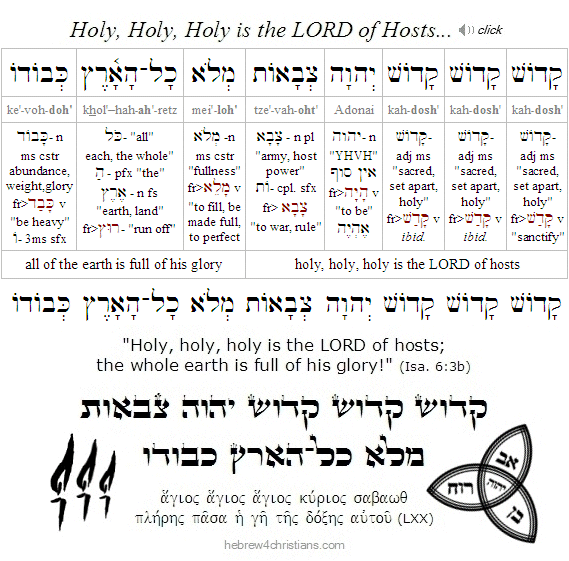 |
Endurance to Hope...
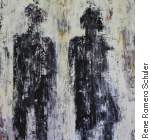
06.11.21 (Tammuz 1, 5781) Though we are optimistic about the purpose and end of reality, and though we believe that God "works all things together for good" (Rom. 8:28), we are not therefore monistic idealists, that is, those who falsely say that evil is not real or who claim that it is "part of God." We are given "exceedingly great and precious promises," yet in this world we suffer and experience real pain, heartache, and troubles. Yeshua said "in this world you will have tribulation," though that is not the end of the story, of course, for there is the cheer of God's' victory, even if we must repeatedly ask God for grace to endure our troubles without murmuring (John 16:33; Heb. 4:16). I realize that is often difficult, and some of you might be within the fiery furnace even now. You might be asking, "Where are you, Lord, in all of this? Why don't you bring me out of these troubles?" In such testing you need endurance (ὑπομονή) to hold on to hope, believing that God uses affliction to refine you for good. As Paul said, "We rejoice in our sufferings, knowing that suffering produces endurance, and endurance produces refined character, and refined character produces hope" (Rom. 5:3-4). Each of us is still upon the "Potter's wheel," and God's hand continues to shape us into vessels that one day will reveal his glory and honor. "The LORD will give strength to his people; the LORD will bless his people with peace" (Psalm 29:11).
Hebrew Lesson:
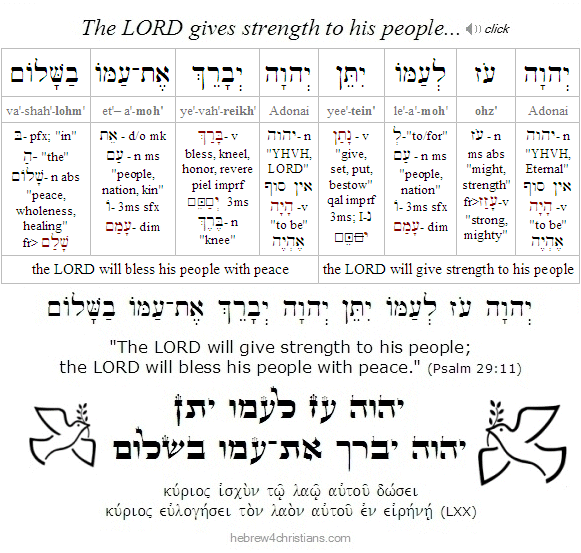 |
Keep holding on, dear friends! The Lord our God is faithful and true. He gives us acharit ve'tikvah (אַחֲרִית וְתִקְוָה), "a future and a hope" (Jer. 29:11). Shabbat Shalom.
Echoes from the Future...
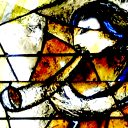
06.11.21 (Tammuz 1, 5781) Yeshua forewarned of the alienation and moral sickness that would pervade mankind just before the time of his return: "Because lawlessness (i.e., ἀνομία, from -α ('not') + νομος, 'torah') will be increased," he said, "the love of many will grow cold (i.e., ψύχομαι, 'be extinguished')" (Matt. 24:12). Note the link between Torah and love: true love requires respect for God's authority, for without that the divine image is disfigured and desecrated. Likewise the Apostle Paul foresaw that the "End of Days" (אַחֲרִית הַיָּמִים) would be a time of peril (καιροὶ χαλεποί) because people would become increasingly narcissistic, self-absorbed, infatuated with their own sense of self-importance, abusive toward others, disrespectful to elders, ungrateful, heartless, unforgiving, without self-control, brutal, treacherous, and so on (2 Tim. 3:1-4). Therefore, in light of the spiritual war that rages all around us, it is vital that we remain firmly rooted in what is real by taking hold of our identity and provision as children of God. "God has not given us the spirit of fear, but of power (גְּבוּרָה / δύναμις) and of love (ἀγάπη), and of a "sound mind" (σωφρονισμός), i.e., a "delivered" mind -- centered and "healed" from inner chaos (2 Tim. 1:7). The name of the LORD (יהוה) means "Presence," and in Him "we live and move and have our being" (Acts 17:28). He is as close as our heart and our very breath (Rom. 10:8). We are not to be troubled like the world that lives in terror of man, nor are we to crave security from the vain devices of mere men. No - we must look to God Almighty, the Master of the Universe. He alone is our Refuge and Defense, the One who gives us steadfast love in the midst of these storms. "Let not your heart be troubled" - God is in control of the whirlwind, friends...
According to orthodox Jewish eschatological tradition, the period of time immediately before the Messiah's arrival is sometimes called ikvot meshicha (עִקְּבוֹת מְשִׁיחַ), the time when the "footsteps of the Messiah" can be heard. Some of the "signs" of this period include the rise of various false prophets, numerous wars and "rumors of wars" (including the rise of Magog: Iran), famines, earthquakes, worldwide apostasy from the faith, persecution, and a globalized sort of godlessness that is revealed in unbridled selfishness, greed, chutzpah (audacity), shamelessness, and a general lack of hakarat ha-tov (gratitude). The greatest sign, however, will be that Israel will exist once again as a sovereign nation, despite the prophesied exile among the nations (Deut. 4:27-31; Jer. 30:1-3).
Hebrew Lesson:
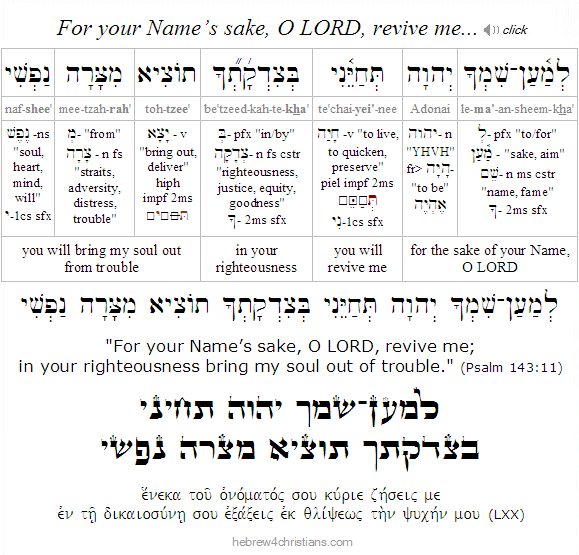 |
For more on this fascinating subect, see the article "Birthpangs of Messiah."
With all your heart...
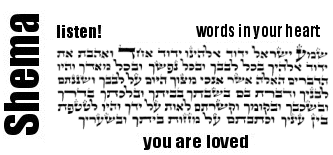
06.11.21 (Tammuz 1, 5781) We love God because He is our Creator, our Breath of Life, the Source of all true good, our Savior, our Healer, and the substance of all that is real and significant... We are able to love because he discloses his love to us (1 John 4:19). We respond to God with a heart of gratitude and love, not out of fear of punishment; with a whole heart (כָּל־לֵבָב), not a heart divided by fear. The Torah says you are to love God bekhol levavkha (בְּכָל־לְבָבְךָ), "with all your heart" – like Abraham, who loved God wholeheartedly; and you are to love God bekhol nafshekha (בְּכָל־נַפְשְׁךָ), "with all your soul" – like Isaac, who gave his soul over to God, willing to be sacrificed for our atonement; and you are to love God bekhol me'odekha (בְּכָל־מְאדֶךָ), "with all your muchness" – like Jacob who gave from his substance to support his children, the sons of Levi. And these words, namely, the words that return us to God's love, shall today be on your heart (הַיּוֹם עַל־לְבָבֶךָ), which means we are to love God at all times, for this is the day that the LORD has made...
Hebrew Lesson:
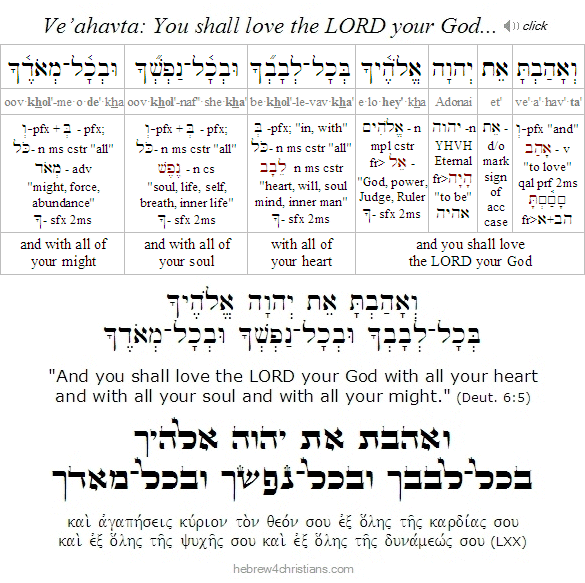 |
Being Born Again...

06.10.21 (Sivan 30, 5781) Yeshua taught that we discover the truth about spiritual reality by way of revelation from heaven, not by way of human reasoning. He said that we can come to know God only through Him: "No one has ever seen God; the only God (μονογενὴς θεὸς), who is at the Father's side, he has made him known" (John 1:18).
For example, when a religious leader named Nicodemus visited Yeshua to inquire who he was, Yeshua redirected the inquiry by asking what sort of man he was instead (John 3). Nicodemus was impressed with the reports of miracles ascribed to Yeshua and supposed that he was some sort of teacher sent from God. Yeshua, however, abruptly told him that unless he was "born from above" he would be unable to see the truth of the kingdom (John 3:3). He explained that no one can see the hidden kingdom of God apart from a spiritual "rebirth," that is, a new mode of being that enables the person to enter another realm of existence altogether. Such transformation comes by means of the agency of God's Spirit, that is, by an encounter with God that imparts heavenly life (רוח) to the soul.... Once that happens, the person is able to receive the truth of heavenly things.
Nicodemus objected to the idea of being "born again." "How can a man be born when he is old? He cannot enter his mother's womb and be born a second time, can he?" Perhaps he was suggesting that spiritual rebirth would be as impossible as physical rebirth. People are just too set in their ways to change... Yeshua reminded him of the distinction between the realm of the natural ("born of water") and the realm of the spirit ("born of the Spirit"): "That which is born of the flesh is flesh, and that which is born of the Spirit is spirit. Do not marvel that I said to you, 'You must be born again.' The wind (ruach) blows wherever it will, and you hear the sound it makes, but do not know where it comes from and where it is going. So it is with everyone who is born of the Spirit." When Nicodemus still expressed uncertainty about all this by asking "How can these things be?" Yeshua chided him for his shortsightedness: "If you don't believe when I explain in earthly terms, how will you believe if I tell you about heavenly things?" As a respected teacher of Torah, Nicodemus should have known the prophetic teaching of "rebirth" from the Scriptures, such as Ezekiel 36:25-28, Jeremiah 31:33; and indeed he had a responsibility to know this truth. Moreover the general theme of Scripture concerned the coming of Messiah, the Son of Man, who would undo the curse that befell humanity through Adam's transgression, and this meant a new beginning...
To help Nicodemus see, Yeshua reminded him of the episode recorded in the Torah when the people became discouraged about the journey in the desert. At one stop they could not find water and they began to say that the LORD had abandoned them to die there (see Num. 21:4-9). God then sent "fiery serpents" (הַנְּחָשִׁים הַשְּׂרָפִים) that bit the people and many began dying. When the people cried out in distress, God instructed Moses to make a semblance of a fiery serpent and to lift it up on a stake, so that everyone who was bitten could look upon it and live. Yeshua then made the connection for Nicodemus: "Just as Moses lifted up the serpent in the desert, so the Son of Man must be lifted up: so that whoever believes in Him would not perish but have eternal life" (John 3:14-15).
The episode in the desert provides a vivid picture of deliverance for all who have likewise come under divine judgment. The lifted up serpent was an sign of righteous judgment; the people were entirely unable to rescue themselves, and the venom was lethal and without antidote. Only God could save them, and God's way of healing was to have the people look at the impaled serpent to receive life. Only God's power could kill the power of death's hold over them... When Yeshua told Nicodemus that he likewise would be "lifted up," he used the same word used elsewhere to refer to crucifixion (ὑψόω). "Looking at" God's provision for deliverance at the cross is the means of salvation -- that is, the greatest blessing of all: healing from our separation from God, deliverance from the judgment for sin, and the promise of eternal life. Again, all this comes by faith: "looking at" God's remedy means accepting it as being offered for your sake. You are set free from condemnation, you receive newness of life, and you are able to live before God in honesty and confidence of his love for you...
"Unless you are born again, you cannot see the kingdom of God." You are blind until God opens your eyes. When Yeshua gave sight to a man born blind, the Pharisees concluded that he could not be a true prophet of God because he healed someone on the Sabbath day (John 9). In response Yeshua said, "For judgment I came into this world, that those who do not see may see, and those who 'see' may become blind." When the Pharisees heard this they asked, "Are we blind then?" and Yeshua replied: "If you were blind, you would not be guilty of sin, but now because you claim that you can see, your guilt remains." Likewise the Apostle Paul was made blind in order to see; he had to lose the blindness of his seeing in order to behold the truth of God's kingdom (Acts 9). As long as Paul thought he could see he remained blind, but as soon as he realized he was blind, he began to be able to see...
The difference between believers and unbelievers does not turn on the problem of sin and the condition of spiritual death - for both are in the same helpless state before God - but rather with the different responses they have toward "the light," that is, the revelation of God manifest in Yeshua. Those who love evil hate the light and turn away from its disclosure, whereas those who "do truth" love the light so that their deeds are revealed as God's power at work within their hearts (John 3:19-21; Eph. 5:13). There is an "exclusive disjunction" in the realm of the spirit: either you will love what is evil and hate the light, or you will love the light and hate what is evil. "No one can serve two masters, for either he will hate the one and love the other, or he will be devoted to the one and despise the other" (Matt. 6:24).
In the end there will be found two types of people: those who love the truth and those who love the lie. These are the children of light (בְּנֵי הָאוֹר) and the children of darkness (בְּנֵי הַחשֶׁךְ), respectively. Followers of Yeshua the Messiah are told to "walk as children of light" / ὡς τέκνα φωτὸς περιπατεῖτε (Eph. 5:8). The children of light are called to be am kadosh - a holy people - separate from the evil engendered by the fallen world and its forces, just as the very first creative expression of God was the separation of light from darkness (Gen. 1:3-4). The children of light "hate evil and love the good," and conversely, the children of darkness "hate the good and love evil" (Psalm 34:21, Prov. 8:13, Amos 5:15, John 3:20-21). Regarding the heavenly Zion to come, it is written: "nothing ritually unclean will ever enter into it, nor anyone who does what is detestable or practices falsehood (lit. "makes a lie"), but only those whose names are written in the Lamb's book of life" (Rev. 21:27).
The essential question is whether you are willing to believe in the light of God's love, or not... What sort of person are you, after all? Yeshua is the light of the world, and those who follow him will not walk in darkness, but will have the light of life (John 8:12). So, do you have ohr ha-chayim (אוֹר הַחַיִּים), "the light of Life," shining within your heart? The light beckons: "wake up, open your eyes, and believe" the good news: darkness and despair will not prevail; your mourning will find comfort, your grief its solace. Your heart's deepest longing shines brightly, even now, if you will but believe... Now may you find courage and remember what is written: "The LORD is my light and my salvation (i.e., my Yeshua); whom shall I fear? The LORD is the refuge of my life; of whom shall I be afraid?" Amen.
Hebrew Lesson
Psalm 27:1 reading (click):
Marks of False Teachers...
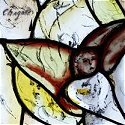
[ The following entry concerns this week's Torah reading, parashat Korach. Please read the Torah portion to "find your place" here. ]
06.10.21 (Sivan 30, 5781) False teachers tend to be "people pleasers." They desire the esteem of the crowd, the praises of men, and therefore appeal to the murmurings of the unregenerate heart: "Do not prophesy to us what is right; speak unto us smooth things, prophesy deceits" (Isa. 30:10). They flatter people by "tickling their ears"; they offer either platitudes or "new revelation" based on their own imagination. Consequently, they tend to be grandiose and quick to disparage God's faithful servants. Thus Korah accused Moses of wanting to exalt himself, when this only disclosed the evil lurking within his own heart (Num. 16:3). False teachers speak in their own name and presume to be something when they are nothing (Gal. 6:3). "The prophets prophesy lies in my name: I sent them not... they are prophesying to you a lying vision, the deceit of their own minds" (Jer. 14:14). They secretly deny that Yeshua is LORD (יהוה), though they may offer "lip service" about his importance (2 Pet. 2:1). Instead of focusing on the message of the gospel and the greatness of salvation found in Messiah, they "major in minors," passing over the weightier matters for the sake of various divisive doctrines (Matt. 23:23). They desire to be teachers of the law, but they have no idea what they are talking about (1 Tim. 1:7). Often such deceivers have natural charisma, charm, "good hair," and an ability to bewitch people through buttery oratory or clever presentation (Col. 2:4,8). Often they focus on the truth of the head rather than the truth of the heart; they are more concerned with being vindicated than healing broken hearts. Finally, they tend to exploit people to promote their own self-serving agenda (1 Pet. 2:1-3). They make "merchandise" out of the gullible, regarding them as the means to support their "ministry" rather than as precious souls in need of God's love and care...
False teachers inevitably "twist the Scriptures" by offering unsound interpretations contrary to the ruach, or spirit of the Hebrew prophets, and by evading the commandment to "rightly divide" the word of Truth according to basic logic and clear thinking (2 Tim. 2:15; 2 Pet. 1:20-21; 3:16). In Christian circles, they often come in the name of the law (legalism) or in the name of grace (licentiousness), but rarely do they take the trouble to carefully (and equitably) work through the paradoxical tensions. False teachers are uncomfortable humbly confessing they don't know something, and therefore they are quick to style themselves as an infallible prophet or source of authoritative wisdom...
There is no substitute for taking the time and energy to humbly study Torah, friends, and we should be suspicious of those who claim special insight when it is evident that they have not really labored working through the Scriptures... All disciples of Yeshua are called "students," or talmidim (תַּלְמִידִים), a word that comes from lamad (לָמַד) meaning "to learn" (the study of Scripture is called talmud Torah (תַלְמוּד תּוֹרָה) from the same root). Among other things, then, following Yeshua means becoming a student of the Jewish Scriptures that he both loved and perfectly fulfilled (Matt. 5:17-18; Luke 24:44-45). Only after learning the truth of the Scriptures will you be equipped to "go to all the nations and teach" others (Matt. 28:19). This is accomplished not merely by explaining (propositional) doctrine but by kiddush HaShem -- sanctifying the LORD in our lives (1 Pet. 1:15-16). "You shall know them by their fruits..."
Yeshua brings the kingdom of God "at hand," that is, into the realm of this fallen world. False teachers are emissaries of evil, commissioned by the devil to seduce, deceive, and ensnare souls; they disguise themselves as an "angel of light" (2 Cor. 11:14). God allows false teachers to justify the desires of the unregenerated heart, for such teachers find their audience among those who want to be deceived (Matt. 13:24-30; 15:14). In other words, there can be no false teachers apart from false believers who go along with the ruse. In light of this possibility, we should be careful to honestly examine our hearts. What are your motives for faith? What draws you to Yeshua? Do you accept the message of the gospel or are you trusting in something else? Are you really one of his "sheep"? Do you hear his voice, or are you heeding something contrary to the truth of the Holy Spirit?
Just as the easiest way to spot a counterfeit dollar bill is to know the various details of the original, so our best defence against false teaching is to know the details of doctrine and to use discernment as the LORD helps us "test the spirits" (1 John 4:1). This implies that we "build ourselves up in the most holy faith" by carefully (i.e., humbly) studying the word of God - especially the Torah, since the Torah is the foundation of all that follows (Jude 1:20). In this way we will be able to accurately wield the Sword of the Spirit (2 Tim. 2:15-16, 2 Pet. 1:19-20). In order to grow, we must have "good soil" for the seed of the word to take root. We "get rooted by knowing the roots" of our faith! Studying the Scriptures and praying in the Spirit of Truth keeps us securely in the love of God as we wait for the mercy of Yeshua who gives us eternal life (Jude 1:21).
Hebrew Lesson:
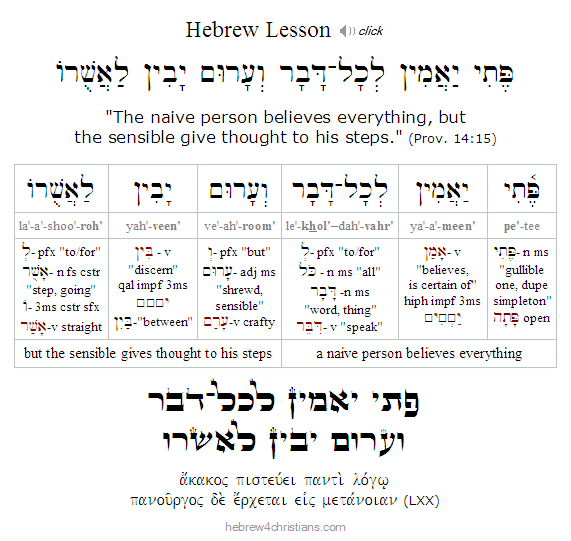 |
Audio Podcast:
The Warning of Korach...
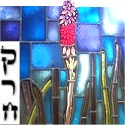
06.10.21 (Sivan 30, 5781) Our Torah portion this week (Korach) centers on the rebellion of Korah, a man who questioned God's authority and who arrogantly sought to "intrude" into the office of the priesthood. It is noteworthy that his rebellion is explicitly mentioned only once in the New Testament - in the Book of Jude - as an example of the fate that awaits those false teachers who likewise spurn God's law. False teachers within the church are likewise dangerous because they deny the truth of Torah and redefine our duties before God. Jude identifies them as spiritual impostors who "work from the inside" to confound or obscure the truth of what salvation means. Such a charlatan may appear to be a genuine believer, but he or she aims to sow confusion and sin among God's children; they are the proverbial "wolves in sheep's clothing" (Matt. 7:15). Jude's warning is especially important for us in this present hour because it is foretold that in the time immediately preceding the coming of the Messiah spiritual deception and unbridled godlessness would greatly increase (2 Tim. 3:1-5). At any rate, test the spirits and seek God's face always, dear friends. I sincerely hope this audio broadcast encourages you... Please click the link(s) below to listen or download:
Navigating Moral Reality...

06.09.21 (Sivan 29, 5781) The various moral rules of Torah (i.e., mishpatim: משׁפטים) may be likened to guideposts along the way, warning us about dangers up ahead. And just as a physical law like gravity describes material reality, so moral law describes spiritual reality. We can no more deny moral reality than we can deny physical reality, though the effect of violating moral truth is often not physical but spiritual - affecting our inner life, our conscience, our sense of value, our relationships, and so on. In either case, however, reality is self-correcting, and we shall deny its substance at our own peril...
Laws of any kind are generalizations, of course. In science, for instance, we inductively sample phenomena and then universalize that experience as a law applicable in all similarly controlled conditions, until proven otherwise. In the case of moral reality, we may have revealed and intuitive awareness of value, but we still must wrestle to discover how to apply such truth to practical matters of our lives. For example, a moral rule is to always "speak truth," but in some cases this rule can be "broken" for the sake of a more important truth. For instance, the law of truth-telling may be suspended if we were hiding Jews in our attic and the Nazis asked if we were doing so. Moral and social rules speak to our need for boundaries, for sacred space, safety, and provide means to show respect to one another. That's the "spirit of the law" (רוח התורה) the deeper reason for its expression. The "role of the rule" is to promote and upbuild life; a righteous rule helps us discern how to limit and redirect our impulses to express godly character. We are therefore to "walk in them," that is, to live in accord with them and to apply their principles in our daily lives. As is also written in our Scriptures: "You shall therefore keep my statutes and my rules; if a person does them, he shall live by them: I AM the LORD" (Lev. 18:5).
Hebrew Lesson:
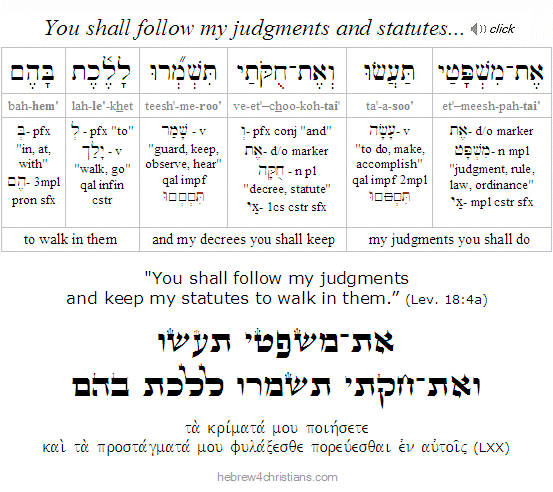 |
Connected to the Vine...

06.09.21 (Sivan 29, 5781) Yeshua taught us: "If anyone does not live in Me, he is cast off as a branch, and withers..." (John 15:6). We find life only as we remain connected to the Source and Conduit of life, who is the Messiah, the Savior and LORD. True life grows out a heart connection with Yeshua, and without that connection our lives become vain and yield no eternal significance (John 15:5). Be forewarned: it is the sacred truth of the Messiah that if you do not live in the Vine you will be suffer eternal loss, since life is found in no other Source (John 14:6; Luke 3:9). Be encouraged, however: The yoke of Messiah is easy, and His burden is light: we cannot create new life by our own best efforts nor effect regeneration by means of our own "good works" (John 1:3; Titus 3:5; 2 Tim. 1:9). No, the work of salvation is God's alone, and we partake of that work as we abandon our self-efforts and religious conceits (see Isa. 32:17). There remains, therefore, a Sabbath for the people of God, "for whoever has entered God's rest has also rested from his works as God did from his" (Heb. 4:9-10). This "deep Sabbath" of rest is a matter of trusting that the finished work of salvation has been provided on your behalf. Therefore relax, for the LORD always effects what is best for you, and not much is under your control anyway. The path of peace is to surrender to God's care for your life and let the evils and drama of this world flow past you. Look to heavenly reality and not to the shadows and deceits of this world (Col. 3:1-4). Live in Yeshua's Presence, drawing strength and vitality from your relationship with Him. The fruit of the Holy Spirit is produced as we yield ourselves to the love and presence of God.
The "Torah of the Vine" (תּוֹרַת הַּגֶּפֶּן) also teaches us that "every branch that bears fruit will be pruned so that it may bear more fruit" (John 15:2). Note first that it is the healthy branch that will be cut back - not the withered one that will be altogether removed – and this purging process may be painful at times. The heavenly Vinedresser's goal is for the fruitful branch to yield more fruit, to reveal more and more the connection to the Heart of the Vine, so that God is glorified (see John 15:8). The end here is the beatific vision: "Blessed are the pure in heart, for they shall see God" (Matt. 5:8). Note that the Greek word translated "pure" is katharos (καθαρός), sometimes used describe the cleansing of a wound (catharsis), or to describe the unalloyed quality of a substance revealed through refining fire. Sanctification involves "catharsis" of the ego – the exile of carnal desire, the mortification of our will, the release of truth in the inward parts. A faith that thinks God will make us immune to suffering, challenges, and tribulation is immature and imperfect. The goal of "purging" is fruitfulness and blessing, but the agency is not the will of man but the power of God. You are made "clean" through the word of God spoken within your own heart (John 15:3). Your sanctification, however, depends on your communion with God, staying connected to what is real, central, vital, the core truth of God's Presence and love, the ultimate Reality of Life itself.
"If anyone does not live in Me, he is cast off and withers...." Yeshua here teaches that shared life is the goal of our relationship with him, but if that does not occur, destructive consequences follow. This has been called the "dark side" of God by some, by which they mean that God will destroy everything in us that is not fit to exist and that does not yield true blessedness (Luke 3:9). Of course this "destruction" (or correction) is really a great blessing, since it purges us from worthlessness that brings pain, disease, and sorrow (this in distinction to the devil, who seeks to destroy what is healthy and good). The upshot here is that we must carefully attend to our inner life and our connection with God, understanding that to be the utmost good for our lives, seeking God's Presence in all our ways. Therefore we read, "Above all else guard your heart, for from it flow the springs of life" (Prov. 4:23).
מִכָּל־מִשְׁמָר נְצר לִבֶּךָ
כִּי־מִמֶּנּוּ תּוֹצְאוֹת חַיִּים
mee·kohl · meesh·mar · ne·tzor · lee·be'·kha
kee · mee·me'·noo · to·tze·oht · chai·yeem

"Above all else guard your heart,
for from it flow the springs of life"- Prov. 4:23

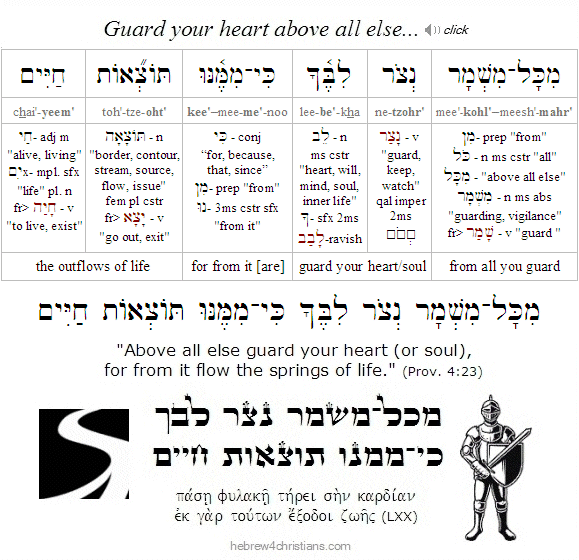 |
Consider your assumptions and the "default" ways you tend to think about things.... Since Yeshua is the Center, the Heart, and the Source of all beauty, meaning, love, grace, and life for you, test all other truth claims based on that relationship… The devil trafficks the lie and seeks to entice you to bite his hook. We overcome the power of the lie by means of truth, and the various affairs of this world – its drama, it's "news" and its rumors, its fads, trends, idols, and fashions, its unspoken assumptions that impugn the witness of Scripture – must be mediated by the word of Messiah within you. Take every thought captive to the truth of God; bring it before the bar of the Divine Presence and coerce it to bend the knee (2 Cor. 10:5). Friend, the stakes are high. People live their lives in unstable and pain-filled ways because they refuse to "come to themselves" and understand the Ground of existence, the Heart of God that overarches and sustains all things...
Life in Perilous Times...

06.09.21 (Sivan 29, 5781) The Scriptures foretell that the time before the prophesied End of Days would be "perilous" (χαλεπός) and full of moral depravity: "Understand this, that in the last days perilous times (καιροὶ χαλεποί) shall come" (2 Tim. 3:1). In the entire New Testament, the only other place we find this word translated "perilous" (i.e., χαλεπός) is in Matthew 8:28, where it describes savage demonic activity. Indeed, the word likely comes from a Greek verb (χαλάω) that means "to let down from a higher place to a lower," thereby creating a sort of spiritual "chasm" or rift, which again suggests that Satan's activity will be unleashed upon the earth. In the "End of Days," then, a wave of fierce demonic activity will appear upon the earth that will menace and terrorize others. If you can stomach reading the daily news, you will see that this peril is a regular feature of our world today.
Are we then to be in dread of these things? No. "There is no fear in God's love" (φόβος οὐκ ἔστιν ἐν τῇ ἀγάπῃ). God gives truth and grace to help us navigate our difficult situation; he understands the character of the times in which we live... Notice that the Greek word translated "times" in the phrase "perilous times" (καιροὶ χαλεποί) is also translated "appointed times" (מוֹעֲדִים) throughout the Scriptures. In other words, God has appointed this time to be one of judgment upon the world system, and we are here forewarned so that we can speak the truth and offer healing to others who seek deliverance... The Lord will never leave us nor forsake us; He will shelter us in Goshen (גּשֶׁן, lit. "drawing near") before the hour of his wrath; He will walk with us through the waters, and through the fires (Isa. 43:2). Our Lord knows how to calm the storms around us...
Hebrew Lesson:
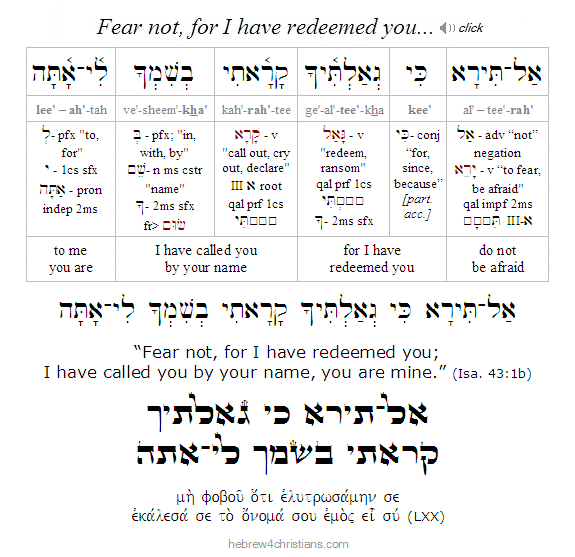 |
We must use godly discernment regarding to whom we should listen and accept as a valid authority. The latest "news" and gossip of this evil world is inherently deceptive, a carefully crafted dialectic of social engineering devised by Satan that is intended to divide people into warring factions in order to enslave them to their fears. We are not to follow the madness of the crowd or be victims of such devices (1 Pet. 5:8-9). Indeed the "news" of this world is a lie, collectively considered, since it (i.e., the script writers of the major news outlets) illicitly assume that there is no God, there is no salvation in Messiah, no judgment to come, etc., and that people are therefore helpless and must rely on their own devices...
The irony in all of this is that there is indeed a "dialectic" of the Spirit in motion, a dialectic that will make the various conflicts of this world look like a "tempest in a teapot" in comparison. The great day of the LORD approaches, and the elements will all be burned with fervent heat, as it is written: "But the Day of the LORD (יוֹם־יְהוָה) will come like a thief, and then the heavens will pass away with a horrific roar, and the heavenly bodies will be burned up and dissolved, and the earth and every deed done on it will be laid bare" (2 Pet. 3:10). As was also foretold in our prophets: "Lift up your eyes to the heavens, and look at the earth beneath; for the heavens vanish like smoke, the earth will wear out like a garment, and they who dwell in it will die in like manner; but my salvation will be forever, and my righteousness will never be dismayed" (Isa. 51:6). Instead of giving credence to the fearmongering and propaganda of this godless and insane world, we must follow the LORD God Almighty and to submit to His leadership despite the madness that surrounds us. Amen, and may God give us greater grace and wisdom for these desperate days...
Hebrew Lesson:
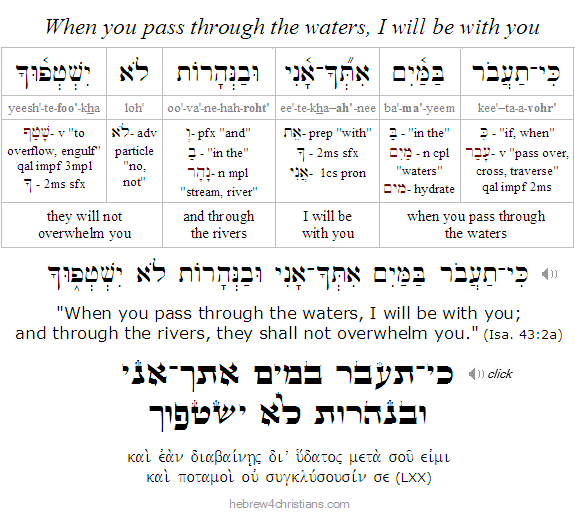 |
As the Day draws Near...

06.09.21 (Sivan 29, 5781) Our actions invariably reveal what we are believing about the nature of reality. We will live what we believe... Put the other way around, what we believe will determine what we do. Nearly all of our conscious intentions are future-directed. We assume that the future will resemble the past, and therefore we make our plans and set our agendas. And yet to what end? What is the purpose of our lives? Where are your actions taking you? Where are you going?
Questions like these concern your personal philosophy of life. Every person makes choices based on their vision and expectation of a future good. Every person therefore lives by a creed that speaks toward the future.... Sadly, many people live for the immediate moments of life: cheap thrills, fast food, and mindless entertainment. "Let's eat and drink, for tomorrow we die" (1 Cor. 15:23). Others may enjoy fine art, reading, and learning - hoping thereby to improve themselves. Most people live in order to love others, friends and family... But apart from God, none of these otherwise good things will ultimately satisfy our hearts. "Disordered love" comes from setting the heart's affections on the transitory, the ephemeral, and the unabiding; but God has set eternity within our hearts (Eccl 3:11). The Lord has "wired" us to experience discontent when our heart's deepest need goes unmet.
On a larger scale, philosophers have asked whether life itself - all of it - has any meaning or purpose. "Why is there something rather than nothing - and for what reason?" Is the universe essentially a random set of events, or is there some overarching purpose and design to everything? Is history linear or cyclical? Does it have a goal or destination, or is this entirely unknowable to us? Are human beings "evolving" - and if so, into what? Is there a spiritual dimension to reality, or is everything causally determined by matter and motion? Do we have "free will" or are we entirely conditioned to do what we do? Various answers have proposed to deal with these questions over time, including mythological polytheism (e.g., Zoroastrianism, Egyptian/Greek mythology, animism, paganism), cyclical impersonalism (e.g., Hinduism, Jainism, Taoism, reincarnationism, Stoicism), various types of materialism (e.g., scientific naturalism, pragmatism, evolutionism, nihilism), humanism (Buddhism, secular humanism, atheistic existentialism), romantic idealism (Marxism, Hegelianism), mysticism (theosophy, new age thinking, popular Kabbalah), and so on...
The traditional Jewish view of history may be called (for lack of a better term) "monotheistic personalism." There is one Supreme God who is the personal Creator and Ruler of all that exists. God is both immanent (sustaining creation) and transcendent (above creation). This God has a Name (YHVH), a mind, a character, and a purposive will that imbues all of creation. God is LORD over all time and space, the King of Glory, who is Master of all possible worlds. Since God knows and providentially controls everything, human history is a controlled process that leads to a certain destination. History is therefore progressive and eschatological - leading to a future goal, namely, the establishment of Zion (the "City of God") as the restoration and fulfillment of the lost paradise of Eden. The relationship between humankind and God will be fully restored in the coming theocratic utopia called "heavenly Jerusalem." This is heaven, the place where suffering, pain, and death will be forever swept away, and wherein we shall live forever in sacred fellowship as God's beloved.
Hebrew Lesson:
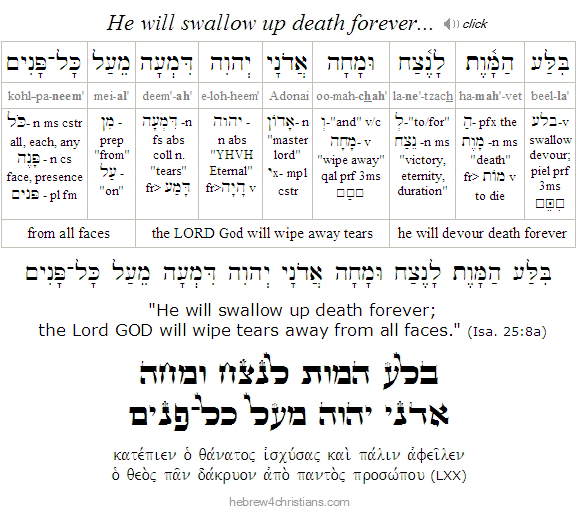 |
The word "Zion" is mentioned over 160 times in the Scriptures. That's more than the words faith, hope, love, and countless others... And since Zion is a poetic form of the word Jerusalem, the number of occurrences swells to nearly 1,000! It is therefore not an overstatement to say that God Himself is a Zionist.... "Out of Zion, the perfection of beauty, God shines forth" (Psalm 50:2). Zion represents the rule and reign of God in the earth and is therefore synonymous with the Kingdom of God. The entire redemptive plan of God -- including the coming of the Messiah Himself and our very salvation -- is wrapped up in the concept of Zion. It is the "historiography" of God -- His philosophy of history, if you will.
In a sense, Zion is the focal point of God's salvation in this world. Zion represents our eschatological future -- our home in olam haba (the world to come). Even the new heavens and earth will be called Jerusalem -- "Zion in her perfection" (Rev. 21). "This is what Adonai Tzeva'ot says: I am very jealous for Jerusalem and Zion, but I am very angry with the nations that feel secure" (Zech. 1:14-15). "For Zion's sake I will not keep silent, for Jerusalem's sake I will not remain quiet, till her righteousness shines out like the dawn, her salvation like a blazing torch" (Isa 62:1). "The builder of Jerusalem is God, the outcasts of Israel he will gather in... Praise God, O Jerusalem, laud your God, O Zion" (Psalm 147:2-12).
For more on this see: "As the Day draws near: Messiah and Jewish Philosophy of History."
 |
The Breath of All Mankind...
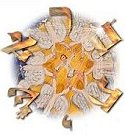
06.08.21 (Sivan 28, 5781) A verse from this week's Torah portion reveals another great Hebrew name for God: Elohei ha-ruchot lekhol basar (אֱלהֵי הָרוּחת לְכָל־בָּשָׂר), which can be translated "the God of the breath of all flesh" (Num. 16:22). The LORD is the Source of your breath, the One who exhales to you nishmat chayim (נִשְׁמַת חַיִּים), the "breath of life" that enables you to live (Job 12:10). The sages use the analogy of a glassblower who creates a glass vessel. Just as the glassblower blows into a tube to form a vessel from molten glass, so the breath (i.e., neshamah: נְשָׁמָה) that comes from the LORD functions as spirit (i.e., ruach: רוּחַ) that forms and fills the human soul (i.e., nefesh: נֶפֶשׁ). Note that the Name YHVH (יהוה) first appears in this connection (Gen. 2:7), a Name that means "God is Present" (Exod. 3:14) and "God is Mercy" (Exod. 34:6-7). Note also that each letter of the Name YHVH represents a vowel sound (i.e., breath), suggesting that God's Spirit is as close as your very next breath. Like the wind that cannot be seen, so is the spirit the essential part of your identity. Yeshua breathed on his followers and said, "Receive the Holy Spirit" (John 20:22).
The special Name Elohei ha-ruchot lekhol basar appears only one other place in the Torah. After accepting the fact that he would soon die and therefore be unable to finally lead the people into the promised land, Moses prayed: "Let the LORD (יהוה), "the God of the spirits of all flesh" (אֱלהֵי הָרוּחת לְכָל־בָּשָׂר), appoint a man over the congregation who shall go out before them and come in before them, who shall lead them out and bring them in, that the congregation of the LORD may not be as sheep that have no shepherd." So the LORD said to Moses, "Take Joshua the son of Nun (יְהוֹשֻׁעַ בִּן־נוּן, lit. "son of life"), a man in whom is the Spirit (רוּח), and lay your hand on him" (Num. 27:16-18).
The Talmud notes that the word Nun (נוּן) means "fish," a symbol of activity and life. Joshua, the chosen one who succeeded Moses and led the people into the Promised Land, was the "Son of Life" - a clear picture of Yeshua our Messiah, the "spirit-filled good Shepherd" who would lay down His life for the sheep (John 10:11). The LORD is indeed the "God of the breath of all flesh." When Yeshua cried out, "It is finished" and breathed his last breath as He died for our sins upon the cross, the greatest exhalation of the Spirit occurred, the greatest sigh, the greatest utterance was ever declared. The sacrificial death of Yeshua for our deliverance was God's final word of love breathed out to those who are trusting in Him.
Hebrew Lesson:
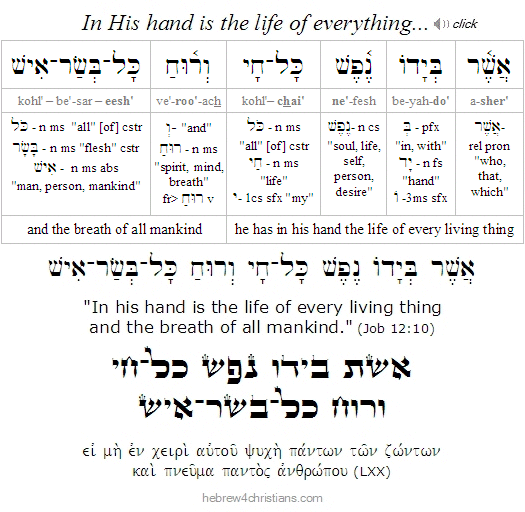 |
Turning back to God...

06.08.21 (Sivan 28, 5781) The Book of Lamentations is an acrostic (i.e., alphabetical) poem that begins with the Hebrew letter Aleph (א) in the word "eichah" (אֵיכָה), which also marks the Hebrew name of the book (מגילת איכה). "How (eichah) lonely sits the city that once was full of people!" (Lam. 1:1). The sages note that this word "how" (i.e., eichah) could also be read as "where are you?" (i.e., ayeka: אַיֶּכָּה), God's first word spoken to Adam after he broke covenant in the Garden (Gen. 3:9). Note that God's question is often our own: "Where are you God? Are you here, in the midst of this tedious moment? Do you know my loneliness, my ache for love? Do you understand the troubles of my heart? Do you know my pain?" And yet how many people have faith that God's call is one of comfort and restoration? God uses our loneliness ("how lonely...") to search our hearts, asking each of us, ayeka – "Where are you?" "Why have you turned away from me and chosen a state of exile?" Our haunting sense of God's absence impels us to seek for him... God awaits our only possible response, "Hashivenu!" -- an imperative (urgent appeal) for the grace to repent: "Turn us back to yourself, O LORD, and we shall be turned; renew our days as of old" (Lam. 5:21).
הֲשִׁיבֵנוּ יְהוָה אֵלֶיךָ וְנָשׁוּבָה
חַדֵּשׁ יָמֵינוּ כְּקֶדֶם
ha·shee·vei'·noo · Adonai · ei·ley'·kha · ve·na·shoo'·vah
cha·deish · ya·mei'·noo · ke·ke'·dem

"Turn us back to yourself, O LORD, and we shall be turned;
renew our days as of old." (Lam. 5:21)
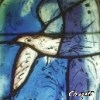
Hebrew Lesson:
Our response to the questioning love of the LORD is called teshuvah ("turning [shuv] to God"). Teshuvah is an "answer" to a shelah, or a question. God's love for us is the question, and our teshuvah – our turning of the heart toward Him – is the answer. As Jeremiah confessed in the hour of great trouble: "I called upon your name, O LORD, from the depths of the pit; You heard my voice: hide not your ear at my breathing, at my cry. You came near when I called upon you; you said, 'Do not be afraid.'" (Lam. 3:55-57).
Shadows and Reality...

06.07.21 (Sivan 27, 5781) Sometimes we seem to forget that we are not home yet... The ancient thinker Socrates argued that philosophy, when done correctly, was "practice for death," since the passing shadows of this world pointed to an unchanging good, our true end. Likewise Yeshua our Messiah taught us to take up the cross and die daily (Luke 9:23). We are to "set our affections on things above, not on things on the earth," for we have died and our life is hidden with Messiah in God (Col. 3:2-3).
It is difficult for us to die, to let go, however, because we are deeply attached to this world, and we often abide under the worldly illusion that we will live forever, that tomorrow will resemble today, and that heaven can wait... History is littered with crumbling monuments offered to the idols of this world. The Scriptures are clear, however: "The present form (τὸ σχῆμα) of this world is passing away" (1 Cor. 7:31), and the heart of faith seeks a city whose Designer and Builder is God Himself (Heb. 11:10). "So we do not lose heart. Though our outer self is wasting away, our inner self is being renewed day by day... For the things that are seen are turning to dust, but the things that are unseen endure forever (2 Cor. 4:16-18). Because of our sin, creation was made "subject to vanity," though God has overcome the dust of death by giving us an unshakable hope (Rom. 8:20).
Hebrew Lesson:
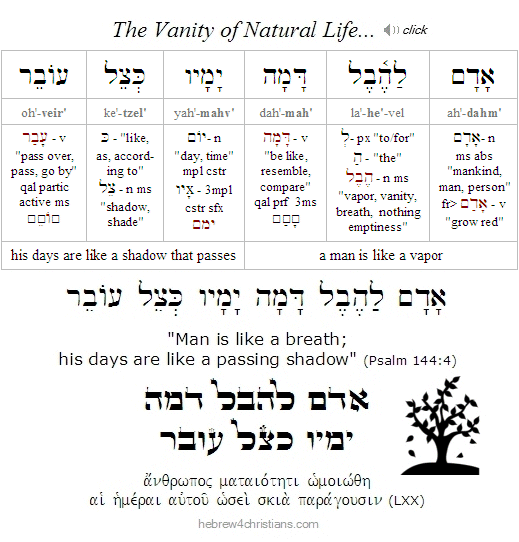 |
The metaphysical truth that ha'kol oveir (הַכּל עוֹבֵר), "everything passes" like a shadow, should help us keep our perspective regarding the various moments of testing we all face in this life. As Nachman of Breslov once said, "The whole earth is a very narrow bridge, and the important thing is never to be afraid" (כָּל־הָעוֹלָם כֻּלּוֹ גֶּשֶׁר צַר מְאד וְהָעִקָּר לא לְפַחֵד כְּלָל). Yeshua is the Bridge to the Father, the narrow way of passage that leads to life. He has overcome the meretricious world and its vanities. He calls out to us in the storm saying, "Take heart. It is I; be not afraid" (Matt. 14:27). When Peter answered the call and attempted to walk across the stormy waters, he lost courage and began to sink, but Yeshua immediately took hold of him, saying, "O you of little faith, why did you doubt (lit., think twice)?" Resist the false assumptions that surround common worldly consciousness: Keep focused on the reality of Yeshua and the way he reveals...
The Narrow Door...

06.07.21 (Sivan 27, 5781) "Make every effort to enter through the narrow door, because many, I tell you, will seek to enter but will not be able" (Luke 13:24). The narrow door is the way of humility, assuming a low position, crawling, if you will, and making yourself small... It is the way of the cross of Messiah, confessing the truth of our condition and trusting in God alone for deliverance.. The narrow door is the way of faith - trusting God's compassion and righteousness given on your behalf. The large, wide-open door is designed for the crowd and its various idols. Beware of the world that seeks to assimilate the soul: beware of becoming part of the crowd! The individual is lost and overwhelmed in the midst of the crowd and its momentum. The crowd assimilates the soul, laughs at the notion of individual responsibility, and abandons itself to the gravity of fallen natural forces... The life of faith, on the other hand, refuses to regard the individual human heart as a triviality. Faith is an individual struggle, a walk into unknowing; it is the way of the sojourner who feels uneasy in this world of shadows... God is always with us and helps us stay strong and resolute, even as we struggle through the darkness of this age. Press on, friend: the day and the hour draw near!
Hebrew Lesson:
The Tragedy of Envy...

[ The following concerns this week's Torah reading, parashat Korach. Please read the Torah portion to "find your place" here. ]
06.07.21 (Sivan 27, 5781) Our Torah this week (i.e., Korach) begins, "And Korah took" (וַיִּקַּח קרַח), which immediately suggests something about the character of the man. Though he was wealthy, esteemed among his tribe, and honored with the task of caring for the Ark of the Covenant, none of this was enough for Korah... There was an insatiable hunger, a "black hole" in his soul, an unrelenting envy, that drove him to madness and self-destruction. Korah was imprisoned by his own jealousy, arrogance, and spite. When he compared himself to Moses and Aaron, he felt overlooked, deprived, and therefore he justified in his desire to be honored. As an archetypal figure, Korach warns us against being swallowed up with egotistical envy or seeking the praises of men (Matt. 23:2-7).
Hebrew Lesson:
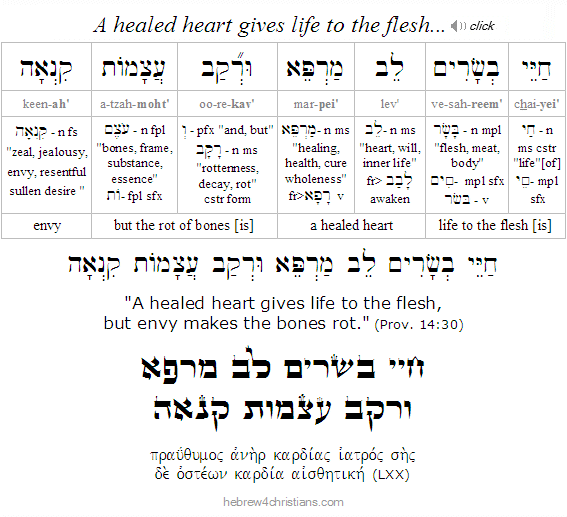 |
In the Kingdom of heaven, worldly success is sheer delusion. There are open and hidden riches. There is a pearl of great price, a treasure "hidden in a field." These riches are regarded as "fool's gold" to those who love this world and trust only in the realm of the phenomenal, but to those who trust in the LORD, they represent all that the heart needs...
"And when the other disciples heard [that James and John sought prominence], they were indignant" (Mark 10:41). But why were they aggrieved except that they sought glory for themselves? The faults we see in others usually mirror our own... If your brother offends you, test your own heart to see where you share his fault... Or do you seek reward for your service to God alone? Do you request a "chief seat" at His table? Any "reward" in the truest sense must include empathy and service for the benefit of others. Heavenly rewards are never gained through self-promotion but through losing yourself in the father's business (Luke 17:10). We don't make old wine from new... What good is any "reward," after all, if it were gained at the expense of your brother or sister? Is such praiseworthy? We can only look past ourselves and see others when we understand that we are in as much need of God's mercy as they are... It is natural enough to want a blessing, but check your heart: the Apostle Paul was willing to himself be accursed for the sake of the well-being and blessing of his own brothers (Rom. 9:3).
The son of Zoma said: "Who is wise? He who learns from all people, as it is said: 'From all those who taught me I gained understanding' (Psalm 119:99). Who is strong? He who conquers his evil inclination, as it is said: 'Better is one slow to anger than a strong man, and one who rules over his spirit than a conqueror of a city' (Prov. 16:32). Who is rich? He who is satisfied with his lot, as it is said: 'When you eat the toil of your hands you are fortunate and it is good for you' (Psalm 128:2). 'You are fortunate' - in this world; 'and it is good for you' - in the World to Come. Who is honored? He who honors others, as it is said: 'For those who honor Me will I honor, and those who scorn Me will be degraded'" (1 Sam. 2:30). – Avot 4:1
Note: For more on this topic, see the article, "The Madness of Korah."
|




































